Xplore Technologies of America LS800TS01 Tablet PC User Manual PecosBanderaOLUG
Xplore Technologies Corp of America Tablet PC PecosBanderaOLUG
Contents
LS800 User manual main
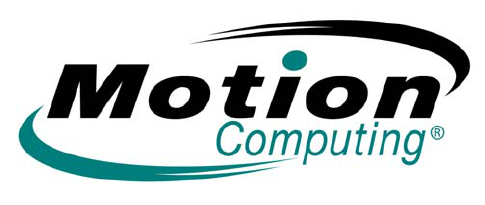
M
OTION
C
OMPUTING
LE1600
AND
LS800 T
ABLET
PC
MICROSOFT WINDOWS XP TABLET PC EDITION 2005
USER GUIDE

Motion Computing LE1600 and LS800 Tablet PC User Guide ii
Copyright Information
Acrobat is a registered trademark of Adobe Systems Incorporated.
Atheros. the Atheros logo, Super G, Super A/G, Wake-on-Wireless, and Wake-on-Theft are
registered trademarks of Atheros Communications, Inc.
AuthenTec is a registered trademark of AuthenTec, Inc.
BLUETOOTH is a registered trademark owned by the Bluetooth SIG, Inc., U.S.A. and
licensed to Motion Computing, Inc.
Intel, Intel Inside, the Intel Inside logo, Pentium, and PROSet are trademarks or registered
trademarks of Intel Corporation or its subsidiaries in the United States and other countries.
Knowles and IntelliSonic are trademarks or registered trademarks of Knowles Acoustics, Inc.
Microsoft Windows, Windows XP, Windows XP Tablet PC Edition, and Windows Journal are
either registered trademarks or trademarks of Microsoft Corporation in the United States and/
or other countries.
Motion Computing, Speak Anywhere, and View Anywhere are trademarks or registered
trademarks of Motion Computing, Inc. in the U.S. and other countries.
OmniPass is a trademark of Softex, Inc.
Realtek is a trademark of Realtek Semiconductor Corporation.
SigmaTel is a registered trademark and Universal Jacks is a trademark of SigmaTel
Corporation.
Wi-Fi is a registered trademark of the Wi-Fi Alliance.
Motion Computing, Inc. has made every effort to identify trademarked properties and owners
on this page. All brands and product names used in this document are for identification
purposes only and may be trademarks or registered trademarks of their respective
companies.
PATENTS: The Motion Computing products and services may be covered by one or more of
the following protected inventions. Additional patents may also be pending.
US PATENTS: D480,730. OTHER PATENTS: GB3009545, BG3009546, AUS154529,
CAN101617, J1188539. For more information, see www.motioncomputing.com/info/patents.
NOTICE: The information in this publication is subject to change without notice. MOTION
COMPUTING, INC. SHALL NOT BE HELD LIABLE FOR TECHNICAL OR EDITORIAL
ERRORS OR OMISSIONS CONTAINED HEREIN NOR FOR ACCIDENTAL OR
CONSEQUENTIAL DAMAGES RESULTING FROM THE FURNISHING, PERFORMANCE,
OR USE OF THIS MATERIAL. The information contained in this document is provided “as is”
without warranty of any kind and is subject to change without notice. The warranties for
Motion Products are set forth in the express limited warranty statements accompanying such
products. Nothing herein should be construed as constituting an additional warranty. This
publication contains information protected by copyright. No part of this publication may be
photocopied or reproduced in any form without prior written consent from Motion
Computing, Inc.
© 2005 Motion Computing, Inc. (April 2005)
P/N 024-02-00xx Rev. X00
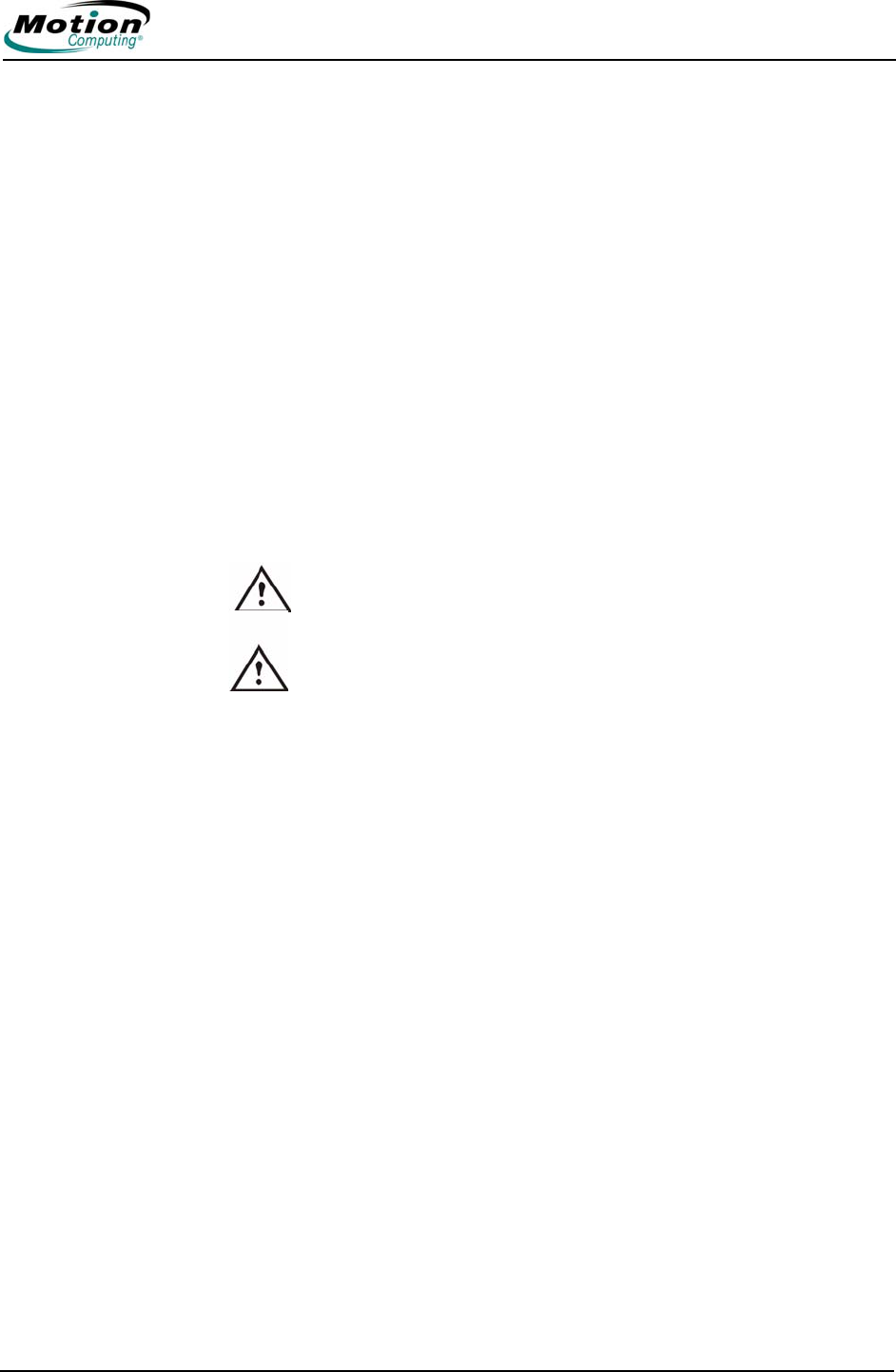
About This User Guide
Motion Computing LE1600 and LS800 Tablet PC User Guide iii
About This User Guide
HOW TO SEARCH
THE PDF
DOCUMENTATION
You can search for and locate information in this user guide by using the
following methods:
• In the Bookmark navigation tab (left frame of PDF), select the section of
the user guide you want to view. The section opens in the right frame of
the PDF window.
• In the Table of Contents, click on the section of the user guide you want
to open. The section opens in the right frame of the window.
• In the tool bar at the top of the PDF window, click the binoculars icon or
select the menu Edit > Search, and enter the text describing the topic
you want to view, and then tap (click) Search. Narrow your search by
selecting the search settings options.
• From the menu, select Edit > Find or press Ctrl+F, and type the text
describing the topic you want to view, and then tap (click) Next.
CAUTIONS,
WARNINGS AND
NOTICES
The following notices are found in this user guide:
WARNING: Text set off in this way indicates that failure to follow
directions in the warning could result in bodily harm or loss of
life.
CAUTION: Text set off in this way indicates that failure to follow
directions in the CAUTION could result in damage to the
equipment or loss of information.
IMPORTANT: Text set off in this way presents information or instructions
that should be followed or information of particular interest.
NOTE: Text set off in this way presents information or instructions.
MENU ITEMS,
BUTTONS, ICONS Menu items, icons, and instructions found in the procedures in this user
guide are set apart by capitalizing them exactly as shown on screen.
Examples are the Start menu, Dashboard, Tablet and Pen Settings icon,
and Apply buttons.
WRITING ON THE
DISPLAY
Writing on the Motion Tablet PC digitizer display in this user guide refers to
any handwritten input using the specially-designed Motion digitizer pen, that
is provided. The display responds only to this pen and not to any other type
of pen or to a stylus or other device such as those used with personal digital
assistants (PDAs). The display surface may be damaged by ink pens or
other pointed objects.
INK The term ink refers to digital ink, i.e., hand-drawn or handwritten input and
that can be displayed or converted into text.
REFERENCES TO
USING THE PEN
AND
PEN FUNCTION
BUTTON
Notations for using the Motion Digitizer Pen, which are found throughout this
user guide, are described below:
• Tap — Firmly tap the pen on the Tablet PC display, without pressing the
function button on the pen; a tap equals a mouse left-click

About This User Guide
Motion Computing LE1600 and LS800 Tablet PC User Guide iv
• Double-tap — Tap the pen twice on the display, without pressing the
function button on the pen
• Right-click — Press the function button on the pen and tap the pen on
the display (equals a mouse right-click)
• Press and hold — Press and hold the tip of the pen to the display with-
out pressing the pen function button (equals a mouse right-click)
• Tap and drag — Tap and drag the pen on the display
• Select/Highlight — Tap on the item on the display to activate the func-
tion: to select a line of text, tap, hold down the button, and drag the pen
across the text to highlight it
TASK BAR/
SYSTEM TRAY
The Microsoft Windows task bar is on the lower-left of the display; the
system tray (or notification area) is on the lower right, near the clock.

Motion Computing LE1600 and LS800 Tablet PC User Guide v
Table of Contents
Chapter
1Getting Started with Your Tablet PC
Features Overview . . . . . . . . . . . . . . . . . . . . . . . . . . . . . . . . . . . . . . . . . 1
Quick Start Instructions . . . . . . . . . . . . . . . . . . . . . . . . . . . . . . . . . . . . . . 2
Using the Motion Digitizer Pen . . . . . . . . . . . . . . . . . . . . . . . . . . . . . 2
Helpful Hints: Pen and Ink . . . . . . . . . . . . . . . . . . . . . . . . . . . . . . . . 3
Complete the Microsoft Tablet PC Tutorials . . . . . . . . . . . . . . . . . . . 4
Review User Guide . . . . . . . . . . . . . . . . . . . . . . . . . . . . . . . . . . . . . . 4
Open the Motion Dashboard . . . . . . . . . . . . . . . . . . . . . . . . . . . . . . 5
Visit the Microsoft Help and Support Center . . . . . . . . . . . . . . . . . . . 6
Hardware Overview . . . . . . . . . . . . . . . . . . . . . . . . . . . . . . . . . . . . . . . . . 7
Tablet PC Display . . . . . . . . . . . . . . . . . . . . . . . . . . . . . . . . . . . . . . . 8
Fingerprint Reader . . . . . . . . . . . . . . . . . . . . . . . . . . . . . . . . . . . . . . 8
Motion AC Adapter . . . . . . . . . . . . . . . . . . . . . . . . . . . . . . . . . . . . . 8
Motion Battery Pack . . . . . . . . . . . . . . . . . . . . . . . . . . . . . . . . . . . . . 8
LE1600 Tablet PC Buttons, Slots and Ports . . . . . . . . . . . . . . . . . . . . . 12
LS800 Tablet PC Buttons, Slots and Ports . . . . . . . . . . . . . . . . . . . . . . 13
Front Panel Status LEDs . . . . . . . . . . . . . . . . . . . . . . . . . . . . . . . . . . . 15
Battery Status LEDs . . . . . . . . . . . . . . . . . . . . . . . . . . . . . . . . . . . . 16
Software Overview . . . . . . . . . . . . . . . . . . . . . . . . . . . . . . . . . . . . . . . . 17
Motion Dashboard . . . . . . . . . . . . . . . . . . . . . . . . . . . . . . . . . . . . . 17
Motion Third-Party Software Solutions . . . . . . . . . . . . . . . . . . . . . . 21
Chapter
2 Using Your Motion Tablet PC
Pen and Ink . . . . . . . . . . . . . . . . . . . . . . . . . . . . . . . . . . . . . . . . . . . . . . 23
Configuring Tablet and Pen Settings . . . . . . . . . . . . . . . . . . . . . . . 23
Calibrating and Using Your Digital Pen . . . . . . . . . . . . . . . . . . . . . 24
Using the Tablet PC Input Panel . . . . . . . . . . . . . . . . . . . . . . . . . . 26
Helpful Hints: Using the TIP Window . . . . . . . . . . . . . . . . . . . . . . . 30
Audio and Video . . . . . . . . . . . . . . . . . . . . . . . . . . . . . . . . . . . . . . . . . . 30
Motion Dashboard Audio System Controls . . . . . . . . . . . . . . . . . . . 30
Adjusting Display Settings and Screen Brightness . . . . . . . . . . . . . 30
Creating Schemes for External Monitors . . . . . . . . . . . . . . . . . . . . 34
Helpful Hints: Mirrored and Extended Modes . . . . . . . . . . . . . . . . . 35
Power Management . . . . . . . . . . . . . . . . . . . . . . . . . . . . . . . . . . . . . . . 35
Configuring Your Power Management Settings . . . . . . . . . . . . . . . 35
Using Your Batteries . . . . . . . . . . . . . . . . . . . . . . . . . . . . . . . . . . . . 38
Helpful Hints: Battery and Power Management . . . . . . . . . . . . . . . 40
Security Features and Settings . . . . . . . . . . . . . . . . . . . . . . . . . . . 40
Motion Security Center . . . . . . . . . . . . . . . . . . . . . . . . . . . . . . . . . . 41
The Fingerprint Reader and Motion OmniPass . . . . . . . . . . . . . . . 41
Helpful Hints: Successful Fingerprint Captures . . . . . . . . . . . . . . . 45
Capturing a Fingerprint . . . . . . . . . . . . . . . . . . . . . . . . . . . . . . . . . . 45
Capturing a Second Fingerprint Later . . . . . . . . . . . . . . . . . . . . . . 48
Configuring Advanced OmniPass Features . . . . . . . . . . . . . . . . . . 48
Logging Onto a Remembered Site . . . . . . . . . . . . . . . . . . . . . . . . . 50
Configuring Strong Logon Security . . . . . . . . . . . . . . . . . . . . . . . . . 50
Infineon Trusted Platform Module . . . . . . . . . . . . . . . . . . . . . . . . . 51
Windows Security System Components Overview . . . . . . . . . . . . . 51
Speech . . . . . . . . . . . . . . . . . . . . . . . . . . . . . . . . . . . . . . . . . . . . . . . . . 55
Introduction to Speech . . . . . . . . . . . . . . . . . . . . . . . . . . . . . . . . . . 55

vi Motion Computing LE1600 and LS800 Tablet PC User Guide
Motion Speak Anywhere Technology . . . . . . . . . . . . . . . . . . . . . . . 56
Speech Recognition . . . . . . . . . . . . . . . . . . . . . . . . . . . . . . . . . . . .56
Helpful Hints: Dictating and Recording . . . . . . . . . . . . . . . . . . . . . .59
Ports, Slots and Connectors . . . . . . . . . . . . . . . . . . . . . . . . . . . . . . . . . 60
PC Cards . . . . . . . . . . . . . . . . . . . . . . . . . . . . . . . . . . . . . . . . . . . . .60
SD Cards . . . . . . . . . . . . . . . . . . . . . . . . . . . . . . . . . . . . . . . . . . . . .60
Infrared (IrDA) Port . . . . . . . . . . . . . . . . . . . . . . . . . . . . . . . . . . . . . 61
USB Ports . . . . . . . . . . . . . . . . . . . . . . . . . . . . . . . . . . . . . . . . . . . .61
Speaker Port (LE1600 only) . . . . . . . . . . . . . . . . . . . . . . . . . . . . . .61
Microphone Port (LE1600 only) . . . . . . . . . . . . . . . . . . . . . . . . . . .61
DVI-D Connector (LE1600 only) . . . . . . . . . . . . . . . . . . . . . . . . . . . 61
VGA Connector . . . . . . . . . . . . . . . . . . . . . . . . . . . . . . . . . . . . . . . .61
Docking Connector . . . . . . . . . . . . . . . . . . . . . . . . . . . . . . . . . . . . .62
Wireless Networking . . . . . . . . . . . . . . . . . . . . . . . . . . . . . . . . . . . . . . .62
Wi-Fi (802.11) Wireless Connections . . . . . . . . . . . . . . . . . . . . . . .62
Bluetooth Wireless Connections . . . . . . . . . . . . . . . . . . . . . . . . . . . 63
Using the Bluetooth Application . . . . . . . . . . . . . . . . . . . . . . . . . . . 65
Helpful Hints: Bluetooth Wireless . . . . . . . . . . . . . . . . . . . . . . . . . .69
Using Infrared Wireless Connections . . . . . . . . . . . . . . . . . . . . . . . 70
Configuring Buttons . . . . . . . . . . . . . . . . . . . . . . . . . . . . . . . . . . . . . . . .72
Chapter 3
Care and Maintenance
Caring for Your Tablet PC and Its Accessories . . . . . . . . . . . . . . . . . . .75
General Care . . . . . . . . . . . . . . . . . . . . . . . . . . . . . . . . . . . . . . . . . . 75
Caring for the Standard and View Anywhere Displays . . . . . . . . . .76
Caring for the Motion Digitizer Pen . . . . . . . . . . . . . . . . . . . . . . . . .76
Ordering New Pens . . . . . . . . . . . . . . . . . . . . . . . . . . . . . . . . . . . . .77
Traveling With Your Tablet PC . . . . . . . . . . . . . . . . . . . . . . . . . . . . . . .77
Traveling by Air . . . . . . . . . . . . . . . . . . . . . . . . . . . . . . . . . . . . . . . .77
FAA Wireless Air Travel Requirement . . . . . . . . . . . . . . . . . . . . . .77
Other Travel Hints . . . . . . . . . . . . . . . . . . . . . . . . . . . . . . . . . . . . . .78
System Repair/Recovery Procedure . . . . . . . . . . . . . . . . . . . . . . . . . . .78
Appendix
A Troubleshooting and Support
Solutions To Common Problems . . . . . . . . . . . . . . . . . . . . . . . . . . . . . . 81
Frequently Asked Questions . . . . . . . . . . . . . . . . . . . . . . . . . . . . . . . . .87
Motion Warranties . . . . . . . . . . . . . . . . . . . . . . . . . . . . . . . . . . . . . . . . .88
Standard and Extended Warranty and Insurance Programs . . . . .88
Motion Computing Support . . . . . . . . . . . . . . . . . . . . . . . . . . . . . . . . . . 88
Appendix
B
Motion Tablet PC Specifications

Motion Computing LE1600 and LS800 Tablet PC User Guide 1
Chapter
1
Getting Started with Your Tablet PC
The LE1600 and the LS800 Tablet PCs from Motion Computing® combine
the best features of desktop and notebook computing with the unique
mobility and versatility found only in a Tablet PC. This chapter provides a
quick start overview of the hardware and software features of your LE1600
and LS800. Any differences between the LE1600 and the LS800 Tablet PC
are noted. Most features of the Tablet PC hardware and software work the
same on both models. Specific details on how to set up and use the Tablet
PC are provided in Chapter 2. The Care and Maintenance of your new
Tablet PC is detailed in Chapter 3. Appendix A is a summary of common
problems and the steps to take if those problems occur. Appendix B is a
reference to where you can find the Tablet PC Specifications.
It is not necessary to read this document from cover to cover. If you are
already familiar with personal computers, you may feel comfortable
proceeding to the instructions in the next chapter. If there are certain things
you want to learn about your new Tablet PC, look in the Table of Contents or
search for that topic.
FEATURES
OVERVIEW
The Motion LE1600 and LS800 includes these key features:
•Microsoft
® Windows® XP Tablet PC Edition 2005 operating system that
contains a Tablet PC Input Panel (TIP) with ink-to-text and word recogni-
tion functionality, and an improved security infrastructure that helps
defend against viruses, worms, and hackers
• Ambient Light Sensor (ALS) to automatically optimize display perfor-
mance and battery life
• Integrated 802.11 Wi-Fi wireless technology
• Integrated Bluetooth® wireless technology for pairing with Bluetooth
devices
• Fingerprint reader for convenient, secure biometric password manage-
ment; combined with Motion OmniPass software to manage settings
• Speak AnywhereTM technology that combines user-configurable acous-
tics software with integrated array microphones to optimize the audio
capabilities of your LE1600 and LS800
• Motion Dashboard for convenient access to Tablet PC controls
• High speed USB ports
• Front panel status LEDs and function buttons
• Screen rotation

2Motion Computing LE1600 and LS800 Tablet PC User Guide
• Handwriting and voice recognition
• PC Card slot for memory expansion, or accessory
connections (LE1600 only)
• Secure Digital (SDIO compatible) Card slot to support SD storage
devices
• User-configurable power-saving schemes
• Additional I/O ports
• Two audio jacks on the LE1600 (designated as microphone/audio in
and headphone/audio out); one audio jack on the LS800
• Two USB 2.0 ports
• External VGA monitor port
• RJ-45 (Gigabit Ethernet network on LE1600, 10/100 Ethernet
network on LS800)
• DVI-D (Digital Video Interface) port (LE1600 only)
• Infrared (IrDA) transceiver
• DC power-in port
• Motion Digitizer Pen/Eraser for ink input, with a pen storage bay and a
pen tether anchor built into the Tablet PC
• Universal security lock slot
QUICK START
INSTRUCTIONS
Start the Tablet PC by sliding the power switch (see the illustrations later in
this chapter for button and switch locations). The power LED turns blue and
the Hard Disk Drive (HDD) LED intermittently flashes blue (these are the top
two LEDs on the upper right corner) as Windows XP launches. When you
start the Tablet PC, the Windows XP Tablet PC Edition 2005 Tutorials
screen appears.
NOTE: If you do not want this screen to continue to appear,
check “Do not show me this again.” We recommend that
you complete the Microsoft tutorials, which take a few
minutes. It you do not want to run the tutorials now, you can
return to them by tapping Start > All Programs > Tablet PC
> Tablet PC Tutorials.
Using the Motion Digitizer Pen
The Motion Digitizer Pen contains
internal electronics that let you
enter digital ink on the Tablet PC
display. The pen is a sensitive,
electronic, data-entry device
designed in conjunction with the
display. The pen includes a user-
replaceable tip; the other end of
the pen serves as an eraser in
applications that support an eraser. The pen contains no batteries and
requires no external power. The pen contains a pen function button, used for
right-clicking (like a mouse) and a small opening at one end for attaching a
pen tether cord. Using the pen tether (provided) helps prevent pen loss;
Eraser
Function Button
Tip

Motion Computing LE1600 and LS800 Tablet PC User Guide 3
attach it to the built-in pen tether post on the upper right edge of the Tablet
PC. The pen also comes with replacement pen tips and a replacement tool.
For information about replacing the pen tips, refer to the Care and
Maintenance information in Chapter 3.
Pen Usage. Think of the pen as your mouse; review the following
information about how it works in conjunction with tapping, pressing, and the
function button.
• Tap — Firmly tap the pen on the Tablet PC display, without pressing the
function button on the pen; a tap equals a mouse left-click
• Double-tap — Tap the pen twice on the display, without pressing the
function button on the pen
• Right-click — Press the function button on the pen and tap the pen on
the display (equals a mouse right-click)
• Press and hold — Press and hold the tip of the pen to the display with-
out pressing the pen function button (equals a mouse right-click)
• Tap and drag — Tap and drag the pen on the display
• Select/Highlight — Tap on the item on the display to activate the func-
tion: to select a line of text, tap, hold down the button, and drag the pen
across the text to highlight it
NOTE: For best results, we recommend that you calibrate
your pen before using it for the first time. For information
about this and other pen procedures, refer to “Calibrating and
Using Your Digital Pen” on page 24.
Helpful Hints: Pen and Ink
Here are some additional hints about working with the digital pen. For more
information about the pen and Tablet PC settings refer to “Configuring
Tablet and Pen Settings” on page 23.
• When you write with the pen, you can rest your hand or arm anywhere
without disturbing any open programs or damaging the display.
• Watch the cursor instead of the pen tip when you write. The cursor is a
guide for your pen movements. If it does not align with the pen tip, you
should recalibrate the pen.
• Practice writing and learn how firmly and where to tap on the Tablet PC
display. You need these skills for activating programs, menus, or other
Tablet PC functions.
• The pen can be held like any other writing tool. Learn how to hold it and
when and how to press the function button on the pen, which activates
right-click options (such as pop-up menus). You can also activate the
right-click options by pressing and holding the pen tip on the surface of
the display.
• Change pen tips every 90 days in a clean environment. Change pen tips
every 30 days if you use the pen in an environment with airborne or sur-
face debris (sand, dust, etc.) or if you drop it on a rough surface. Any of
these or similar situations could damage the pen tip or embed debris in
it. You may not notice the damage or debris until it is too late. Damaged
pen tips could scratch the display.
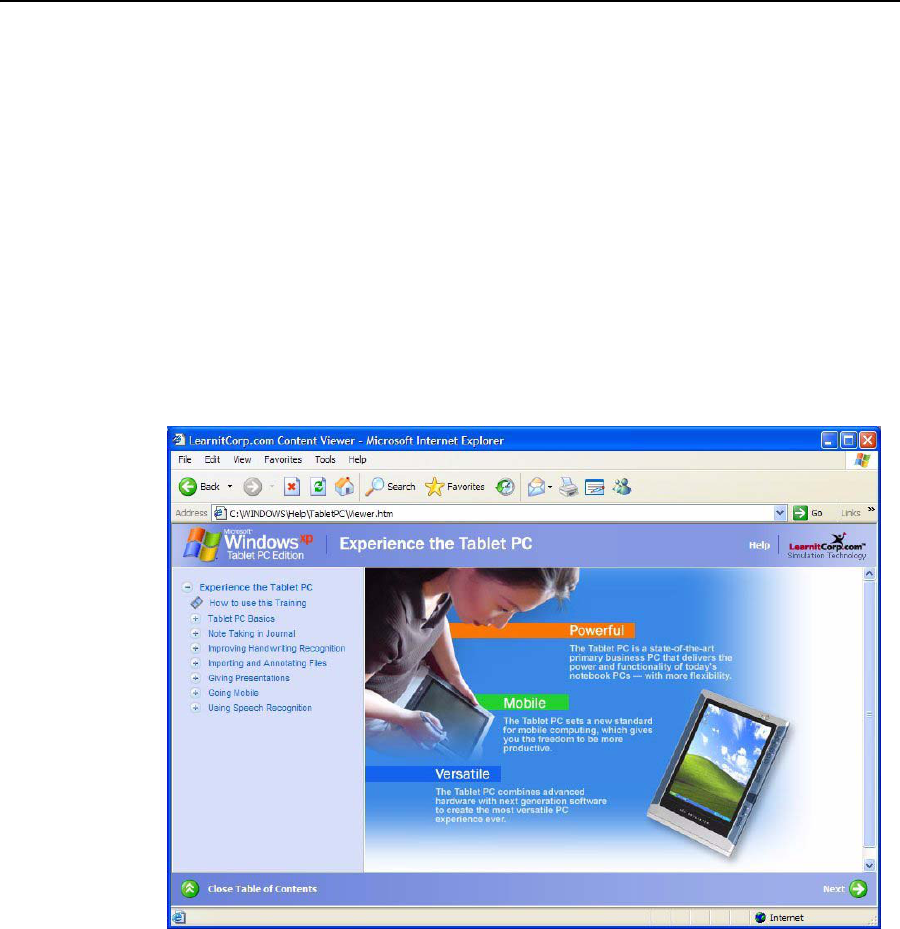
4Motion Computing LE1600 and LS800 Tablet PC User Guide
Perform the following steps to familiarize yourself with the Tablet PC.
• Complete the Microsoft Tablet PC Tutorials
• Read the Motion Resources Page and review the User Guide (this docu-
ment)
• Open the Motion Dashboard (refer to “Open the Motion Dashboard” on
page 5) by tapping the Motion Dashboard icon, or by pressing the
Motion Dashboard button
• Go to the Microsoft Help and Resources Page for more information
Complete the Microsoft Tablet PC Tutorials
When you start your Tablet PC, several tutorials are offered to help you
learn to use various features, such as the Tablet PC Input Panel (TIP) and
speech recognition.
The tutorials are short, quick, and informative and are an excellent place to
begin a successful Tablet PC experience.
NOTE: Microsoft Windows XP Tablet PC Edition 2005
provides several tutorials. One set appears each time you
start the Tablet PC (unless you deactivate this option). If you
are new to the Tablet PC world, taking the tutorials is a great
way to get started and learn quickly.
Review User Guide
Tap the Motion User Guide icon on your desktop to open the online Motion
Tablet PC User Guide at any time. The User Guide is an Adobe PDF file that
is opened with the Adobe Acrobat Reader. You can click on items in the
Table of Contents or the Bookmarks column to go directly to that item. You
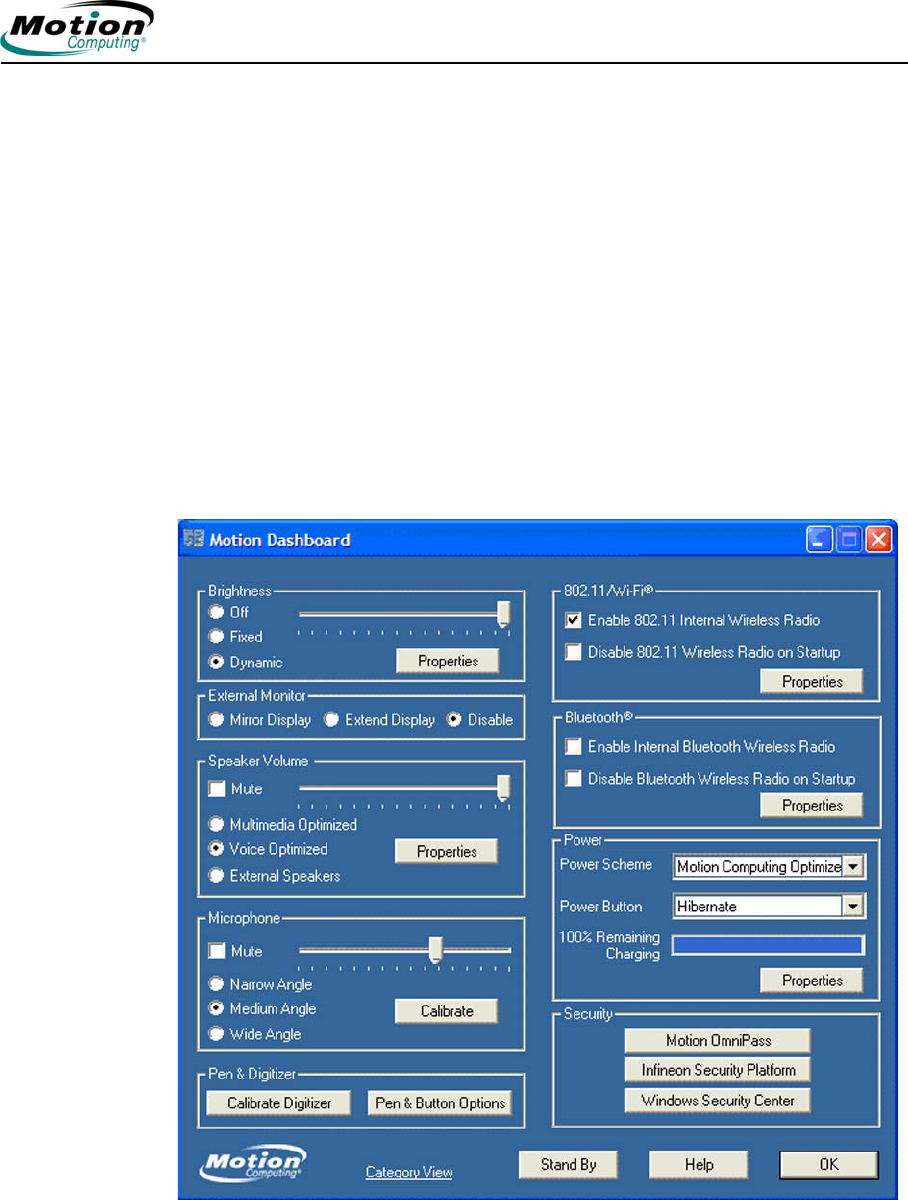
Motion Computing LE1600 and LS800 Tablet PC User Guide 5
can also search for specific items in this user guide by using the search
feature of Adobe Acrobat Reader.
Open the Motion Dashboard
The Motion Dashboard is an exclusive Motion Computing application that
you can use to access programs and functions as well as configure your
Tablet PC.
To open the Motion Dashboard, press the Motion Dashboard button on
the Tablet PC front panel or select Start > All Programs > Motion
Resources > Motion Dashboard. (Refer to “LE1600 Tablet PC Buttons,
Slots and Ports” on page 9 or “LS800 Tablet PC Buttons, Slots and Ports” on
page 13 for a description of the Tablet PC buttons and indicators). You can
also tap the Motion Dashboard icon on the Desktop to open the Motion
Dashboard. The following example shows the Motion Dashboard in the
“Classic View” where all category panels are shown.
On the LS800 Tablet PC, the Moton Dashboard is typically shown in the
category view (see the following example). The other categories or panels
can be selected by tapping the icon at the left side of the window. You can
switch from one view to the other by clicking the Category View or Classic
Motion Dashboard. Classic View
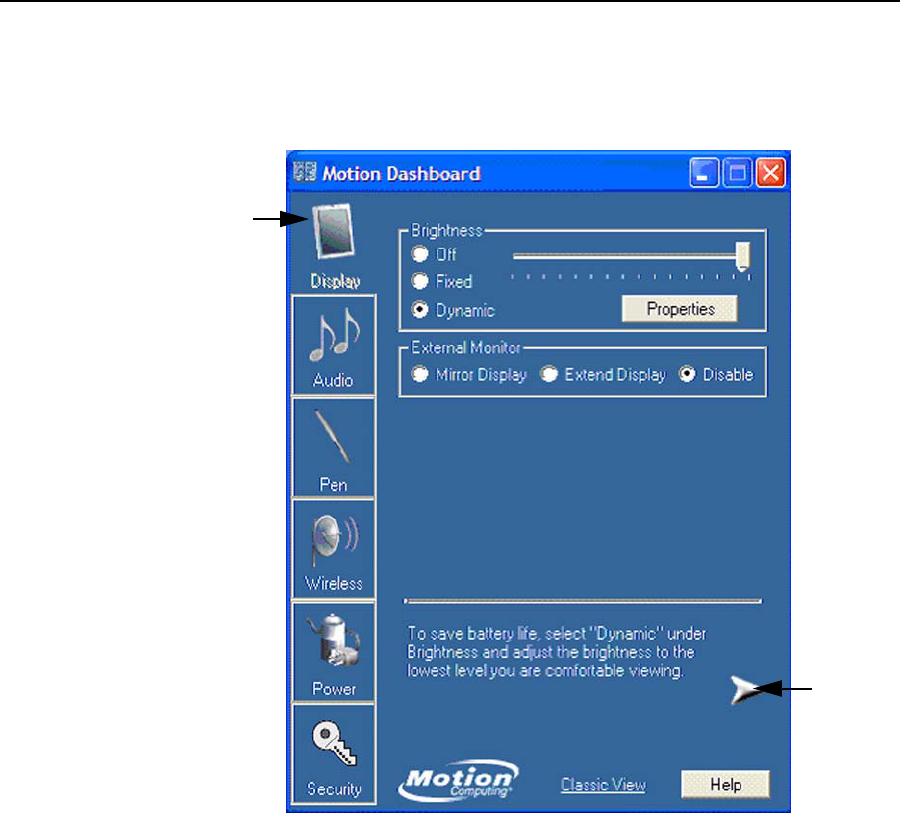
6Motion Computing LE1600 and LS800 Tablet PC User Guide
View link at the bottom of the window. The Motion Dashboard is shown in
the Category View on the LS800 Tablet PC. The following is a sample of the
Motion Dashboard Category View, with the Display panel open.
The Motion Dashboard can be used to monitor and set some of the most
commonly used control panel items for the Tablet PC. For more information,
refer to “Motion Dashboard” on page 17.
Visit the Microsoft Help and Support Center
You can find additional information about your Tablet PC and the Windows
XP Tablet PC Edition 2005 operating system in the Microsoft Help and
Support Center. Access help by selecting Start > Help and Support.
Motion Dashboard. Display Category View
Tap any
button to
open that
panel
Current
panel
Tap for
the next
tip
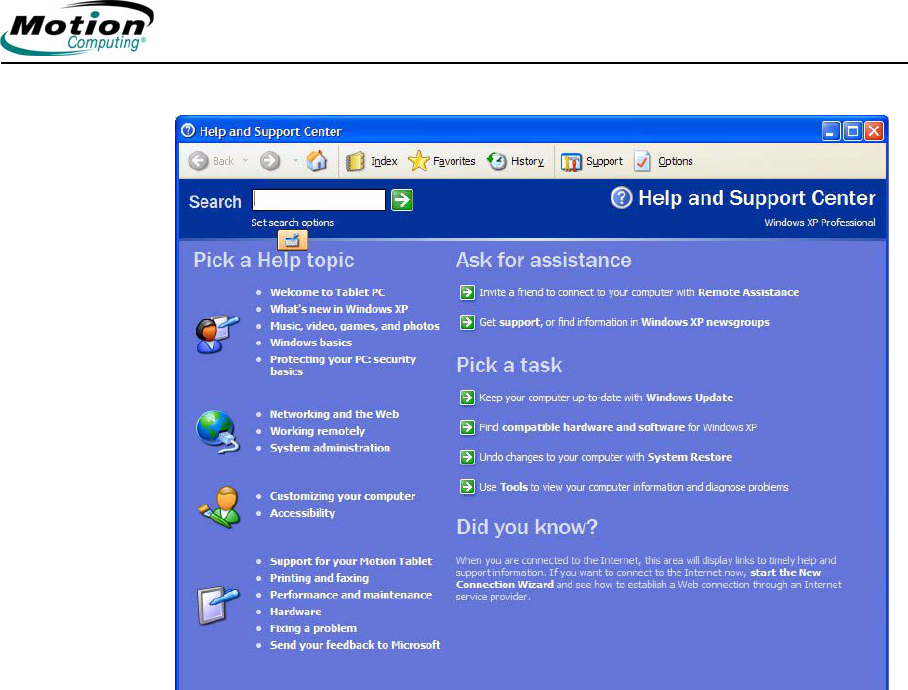
Motion Computing LE1600 and LS800 Tablet PC User Guide 7
Whenever you open the Help and Support Center while your Tablet PC is
connected to the Internet, the "Did You Know" section checks for updates
from Microsoft and Motion Computing, such as system-use hints, or notices
from Motion Computing about your Tablet PC.
If this is your first experience with the Windows XP operating system, taking
the Microsoft tour is a good way to get started. Select Start > Help and
Support > What’s new in Windows XP > Taking a tour or tutorial.
HARDWARE
OVERVIEW
Tablet PC Display
The Motion Tablet PC includes a 12.1-inch display (LE1600) or a 8.4 inch
display (LS800) with wide viewing angles. The Tablet PC standard display
incorporates the following features:
• A highly-readable, liquid-crystal display (LCD)
• A protective layer that offers a firm writing surface and minimizes glare
• A digitizer panel underlying the display that enables handwritten entry
with a specially-designed Motion Digitizer Pen and the TIP
• A viewing angle display that provides bright, clear viewing from 120
degrees (LS800) to 180 degrees (LE1600), plus a high contrast ratio,
fast response time, and authentic color at any angle
• A digitizer that responds to the Motion Digitizer Pen, but not to a plastic
stylus or to finger touches
• A display surface that lets you touch or rest your hand on it without
affecting open programs or data input
NOTE: For information about display care, see Chapter 3 of
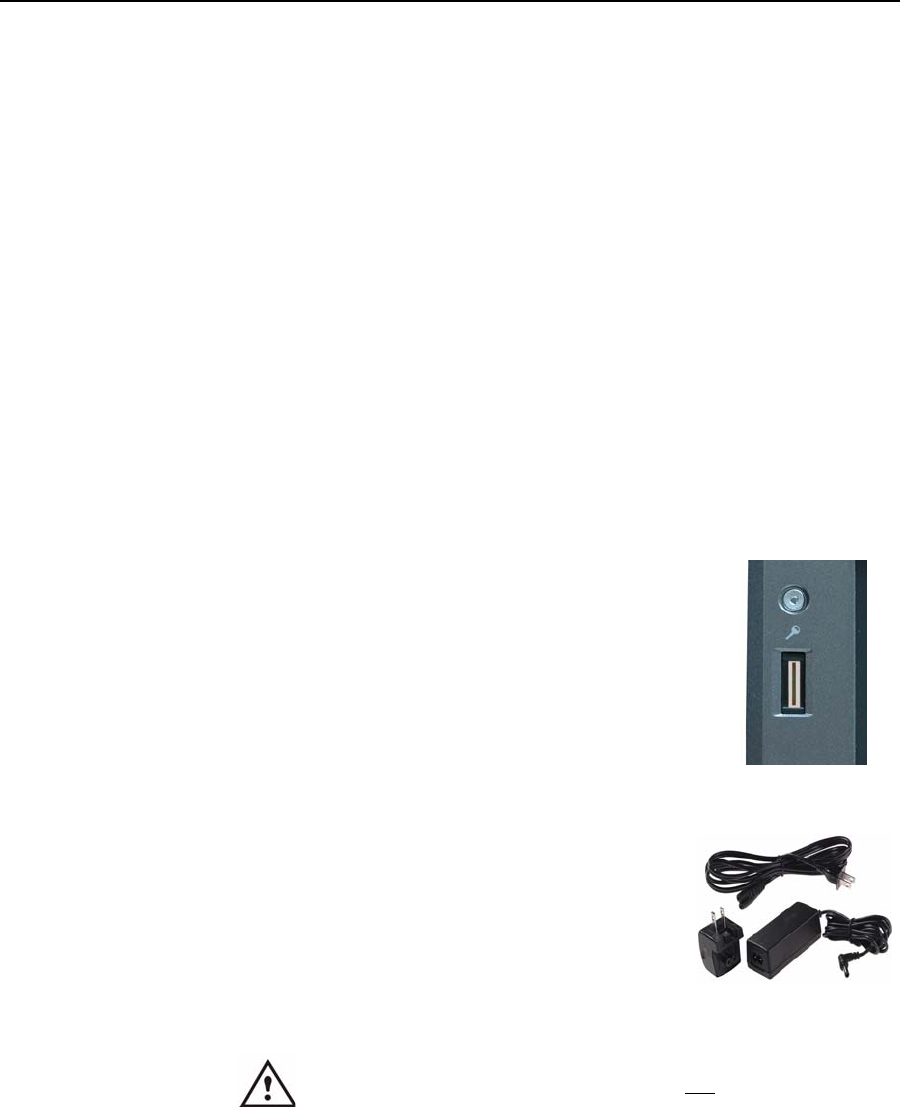
8Motion Computing LE1600 and LS800 Tablet PC User Guide
this User Guide.
Tablet PC View AnywhereTM Display Option. The View Anywhere display
option was designed to enhance indoor viewing and to improve outdoor
viewing while retaining all the standard display features. The bright displays
used on the LE1600 and the LS800 were developed from a proprietary
optical enhancement process based on technology initially developed for
high-end military aviation and marine applications. The View Anywhere
display includes all the features of the standard display plus the following
components:
• A protective layer that improves the sunlight contrast ratio and signifi-
cantly reduces reflection and glare
• Improved sunlight contrast ratio, which enhances viewability at wide
viewing angles even further than the standard display
• Enhanced optical display technology with a significant reduction in
unwanted reflection and glare and improved light pass-through
efficiency
Fingerprint Reader
The fingerprint reader lets you scan your fingerprint and
associate it with passwords. This feature offers a quick
and convenient way to log on to your Tablet PC, provides
global password management, and protects your Tablet
PC data from unauthorized access. The fingerprint reader
also serves as a scrolling device; you can move your
finger vertically (from top to bottom) to scroll the cursor
within the active application window.
Motion AC Adapter
The Motion AC Adapter has three components:
• AC power adapter
• Power cord
• AC mini-plug with folding prongs that can be
used instead of the long cord when traveling
CAUTION: Use the Motion AC Adapter with your
Motion Tablet PC. This adapter should not be used to
power any other electronic devices. If you do so, you
may damage the accessory or the other device.
Motion Battery Pack
Each Motion Tablet PC ships with a Lithium-ion (Li-ion) battery mounted and
latched at the top edge of the Tablet PC. Extra batteries are available from
Motion Computing. An optional Extended Battery is available that provides
additional hours of continuous operation.
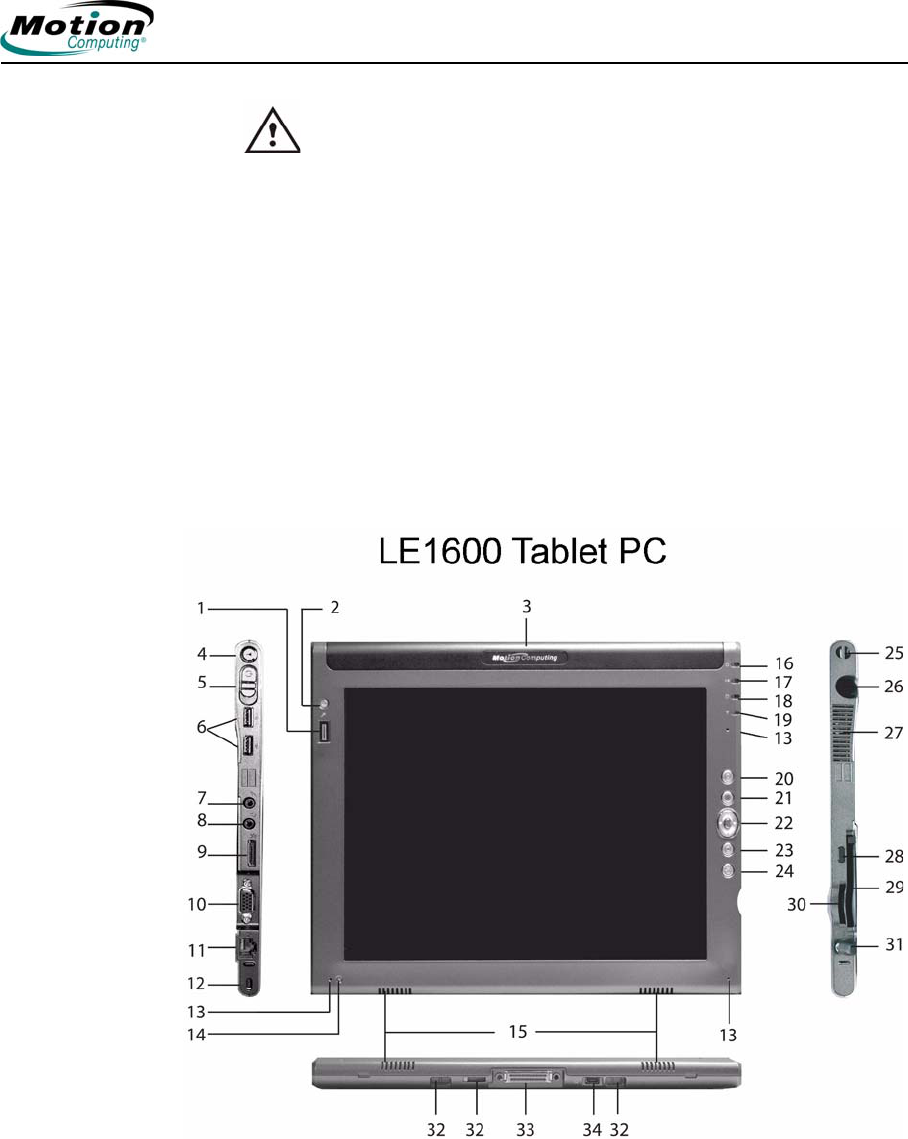
Motion Computing LE1600 and LS800 Tablet PC User Guide 9
WARNING: To avoid personal injury, handle the
battery with care. Do not open, puncture, short, or
expose it to fire or water. Keep the battery in an
ambient temperature of less than +104°F (+40°C); for
example, do not leave it in a closed car in hot weather
for an extended time.
For additional safety information, see the Safety and
Regulatory Guide packaged with your Tablet PC.
LE1600
TABLET PC
BUTTONS,
SLOTS AND
PORTS
The following illustration shows the buttons, slots, and ports on the Motion
LE1600 Tablet PC. Refer to the table following the illustration for a
description of each item. While there are no controls on the back side, there
is a sliding panel that covers the Extended Battery connector. This panel
must be open before connecting the optional Extended Battery. The
connector panel should be closed when not being used.

10 Motion Computing LE1600 and LS800 Tablet PC User Guide
Item LE1600 Tablet PC LEDs, Buttons, Slots, Ports, and Other Components
1 Fingerprint
Reader Swipe-type sensor for scanning fingerprints; used for
password management and security; also serves as a
vertical scrolling device in active application window
2 Ctrl+Alt+Del
(SAS - Secure
Attention
Sequence)
Performs the Ctrl-Alt-Del function; opens the Windows
Security window for additional operator action
3 Battery The removable battery is mounted and latched at the top
of the LE1600 Tablet PC. Also, a battery connector is
located in the upper center portion of the back panel for
attachment of an Extended Battery.
4 Wireless On/
Off Alternately turns wireless on and off; makes it easy to
disable wireless on airplanes (button must be pressed
and held for 1/2 second to take affect)
5 Power switch Turns the Tablet PC on and off; can be configured to
activate Hibernate or Stand By mode
6 USB
connector (2) Universal Serial Bus; for connecting USB 2.0 devices,
such as a storage device, mouse, printer, digital camera,
or optical disk drives
7, 8 Audio input/
output (2) Microphone and headset plug; 3.5 mm plug.
9DVI-D
connector A digital video interface digital connector for attachment
to a digital video interface monitor. An optional DVI-D
cable is available from Motion Computing. To use a
digital video interface monitor you must use this cable
with your Tablet PC.Refer to “Mirroring or Extending Your
Display” on page 32 about how to set up video that is
displayed on an attached external display/monitor.
10 VGA
connector A standard DB-15 monitor connector for an external
monitor, projector, or other VGA device. Motion
Computing does not provide a VGA cable; refer to the
information that came with your display for the type of
cable to use.
11 RJ-45/LAN
connector Standard Gigabit Ethernet LAN (RJ-45) connector that
can be used to connect to a network, cable modem, or
xDSL; it contains two status LEDs.
12 Lock slot Universal lock slot
13 Microphone
(3) Work at a natural distance; disabled when an external
microphone is plugged in. Two of the three microphones
are used during recording (depends on landscape or
portrait orientation).
14 Ambient light
sensor Measures the background light and automatically
balances display brightness

Motion Computing LE1600 and LS800 Tablet PC User Guide 11
15 Speakers (2) Integrated speakers that are muted when you connect a
headset or external speakers
16 Power LED Displays power status; lights blue when power is on,
blinks blue on low battery
17 Battery LED Displays battery status; lights amber when battery is
charging; blinks blue when in stand by state
18 Hard drive
LED Displays hard disk drive (HDD) activity - blinks blue
19 Wireless LED Displays wireless 802.11 and Bluetooth activity; white for
802.11, blue for Bluetooth
20 Escape button Primary function: Escape; secondary function: Alt+Tab
21 Function
button Press this button then another to activate secondary
button functions
22 Five-way
directional
control button
Primary functions: Scrolls Up/Down/Right/Left + Enter
Secondary functions: Left arrow—Shift+Tab; Right
arrow—Tab; Up arrow—Page Up; Down arrow—Page
Down
23 Motion
Dashboard/
Windows
Journal
Primary function: Opens the Motion Dashboard;
programmable secondary function: Opens the Windows
Journal application
24 Rotate Display
/open TIP
(Tablet PC
Input Panel)
Primary function: Changes the Tablet PC display
orientation; programmable secondary function: opens
the Tablet PC Input Panel (TIP)
25 Pen tether Attachment point for the digital pen tether
26 Pen bay Storage area for the Motion digitizer pen; located at
upper right edge. A pen tether attachment point is
located directly above the pen bay.
27 Air vent Active cooling system vent, dissipates heat from the
Tablet PC (side and back)
28 PC card slot Holds one Type-II PC Card for memory expansion or
smart card
29 Infrared (IrDA)
transceiver An infrared transceiver built into the Tablet PC. Allows
communication with other devices compliant with the
IrDA standard. Effective range is approximately 3 feet.
30 SD card Slot Holds one SD-type card, for memory expansion (SDIO
compatible)
31 AC power port AC point of connection for the AC adapter

12 Motion Computing LE1600 and LS800 Tablet PC User Guide
32 Convertible
keyboard and
docking attach
points
Attchment slots for the posts on the FlexDock for the LE
Series, or the posts on the convertible keyboard (note
that the guide posts on the keyboard must be in the up or
raised position for proper attachment).
There are two attachment points for mating the Tablet PC
to the Motion Convertible Keyboard. When the Tablet PC
is attached to the keyboard, the Tablet PC can be angled
to provide a comfortable viewing angle.
33 Docking
connector Connects the Tablet PC with the Motion FlexDock for the
LE series (not pictured in the illustration) and provides
the required signal connections when the Tablet PC is
“docked.” Refer to the Installation Guide provided with
the FlexDock for the LE series unit for more information.
.
34 Motion
accessory port The Motion Accessory port is for connecting input/output
devices directly to the Motion Tablet PC. For example,
this is the port for attaching the optional external DVD/
CD-RW Drive to the Tablet PC - all power to the drive is
provided through this port. Requires purchase of the
optional Motion Accessory Port Y-Cable.
35 External
battery
connector (not
shown)
An external battery connector is included on the backside
of the LE1600 Tablet PC; the sliding panel must be
opened before attempting to attach the Extended Battery.
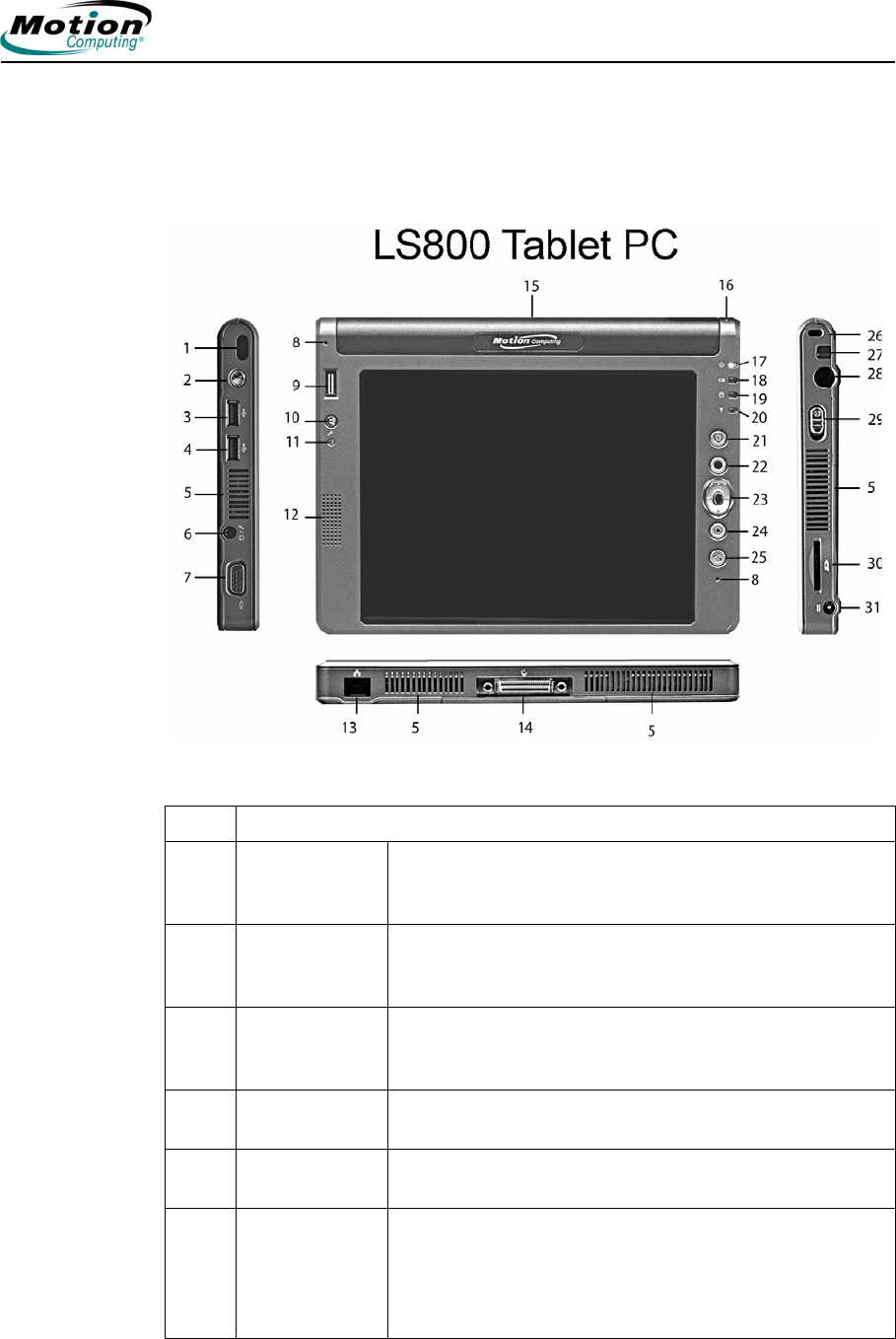
Motion Computing LE1600 and LS800 Tablet PC User Guide 13
LS800
TABLET PC
BUTTONS,
SLOTS AND
PORTS
The following illustration shows the buttons, slots, and ports on the Motion
LS800 Tablet PC. Refer to the table following the illustration for a description
of each item.
Item LS800 Tablet PC LEDs, Buttons, Slots, Ports, and Other Components
1 Infrared (IrDA)
transceiver An infrared transceiver built into the Tablet PC. Allows
communication with other devices compliant with the
IrDA standard. Effective range is approximately 3 feet.
2 Wireless On/Off Alternately turns wireless on and off; makes it easy to
disable wireless on airplanes (button must be pressed
and held for 1/2 second to take affect)
3,4 USB connector
(2) Universal Serial Bus; for connecting USB 2.0 devices,
such as a storage device, mouse, printer, digital camera,
or optical disk drives
5 Air vent Active cooling system vent, dissipates heat from the
Tablet PC edges
6 Audio input/
output (1) Microphone or headset plug; 3.5 mm plug.
7 VGA connector A standard DB-15 monitor connector for an external
monitor, projector, or other VGA device. Motion
Computing does not provide a VGA cable; refer to the
information that came with your display for the type of
cable to use.

14 Motion Computing LE1600 and LS800 Tablet PC User Guide
8 Microphones
(2) Work at a natural distance; disabled when an external
microphone is plugged in.
9 Fingerprint
Reader Swipe-type sensor for scanning fingerprints; used for
password management and security; also serves as a
vertical scrolling device in active application window
10 Ctrl+Alt+Del
(SAS - Secure
Attention
Sequence)
Performs the Ctrl-Alt-Del function; opens the Windows
Security window for additional operator action
11 Ambient light
sensor Measures the background light and automatically
balances display brightness
12 Speaker Integrated speaker that is muted when you connect a
headset or external speakers
13 RJ-45/LAN
connector Standard 10/100 Ethernet LAN (RJ-45) connector that
can be used to connect to a network, cable modem, or
xDSL; it contains two status LEDs.
14 Docking
connector Connects the LS800 Tablet PC with the Motion
MobileDock for the LS series (not pictured in the
illustration) and provides the required signal connections
when the Tablet PC is “docked.” Refer to the Installation
Guide provided with the MobileDoc for the LS series for
more information. Caution: Do not use the Motion LS800
Tablet PC with the Motion FlexDock for the LE Series.
15 Battery The removable battery is mounted and latched at the top
of the LS800 Tablet PC.
16 Pen tether Attachment point for the digital pen tether
17 Power LED Displays power status; lights blue when power is on,
blinks blue on low battery
18 Battery LED Displays battery status; lights amber when battery is
charging; blinks blue when in stand by state
19 Hard drive LED Displays hard disk drive (HDD) activity - blinks blue
20 Wireless LED Displays wireless 802.11 and Bluetooth activity; blinks
white for 802.11, blue for Bluetooth
21 Escape button Primary function: Escape; secondary function: Alt+Tab
22 Function button Press this button then another to activate secondary
button functions
23 Five-way
directional
control button
Primary functions: Scrolls Up/Down/Right/Left + Enter
Secondary functions: Left arrow—Shift+Tab; Right
arrow—Tab; Up arrow—Page Up; Down arrow—Page
Down
24 Motion
Dashboard/
Windows
Journal
Primary function: Opens the Motion Dashboard;
programmable secondary function: Opens the Windows
Journal application
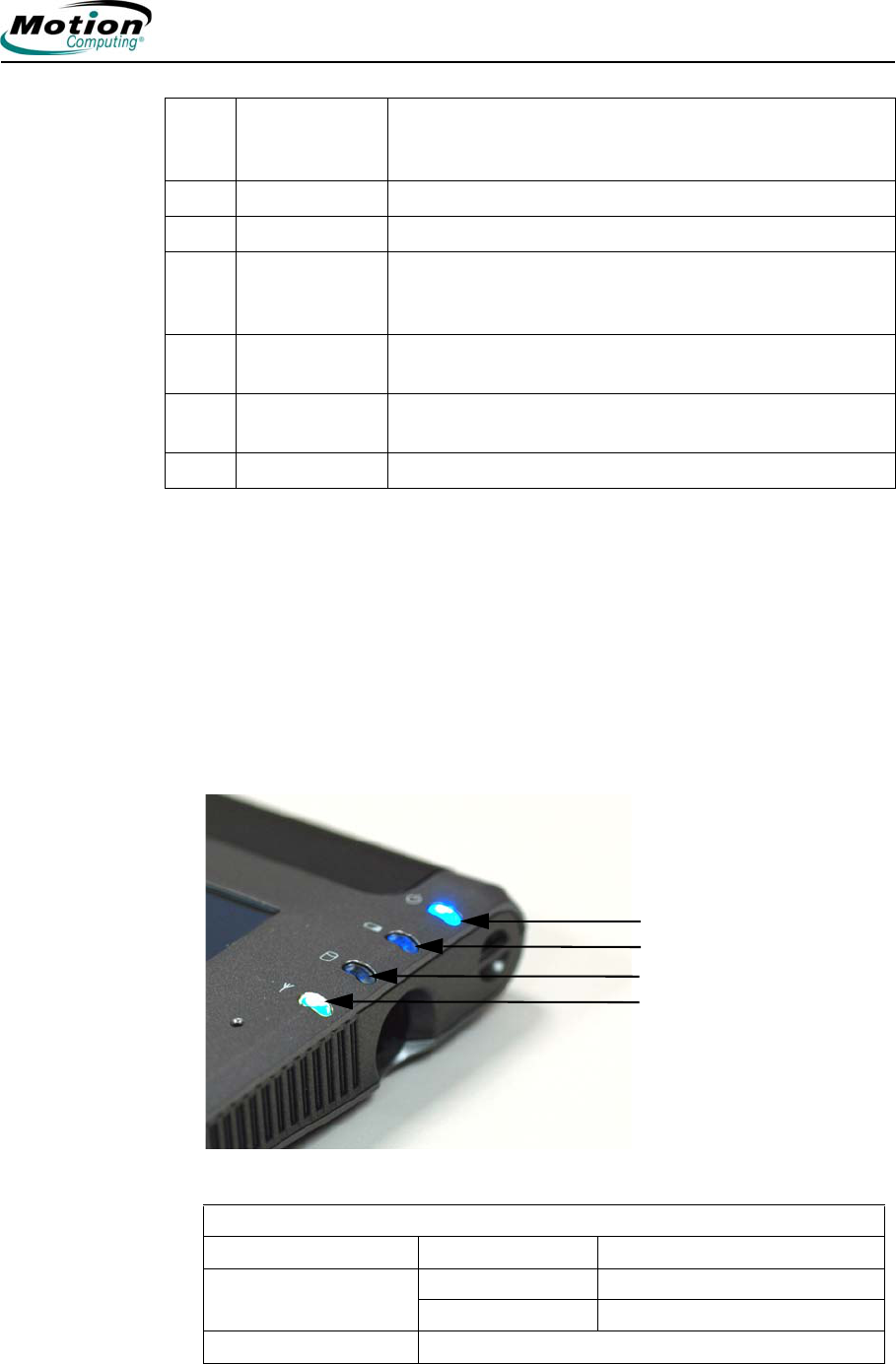
Motion Computing LE1600 and LS800 Tablet PC User Guide 15
FRONT P ANEL
STATUS
LEDS
The Tablet PC front panel includes status indicator LEDs for the following:
• Power On and Off
• Battery
• Hard Disk Drive
• Wireless
The following illustration shows the LEDs on the Motion LE1600 Tablet PC.
The front panel LEDs on the Motion LS800 Tablet PC are in the same
relative position and have the same meanings. Refer to the table following
the illustration for additional information.
25 Rotate Display
)/TIP (Tablet PC
input panel)
Primary function: Changes the Tablet PC display
orientation; programmable secondary function: opens
the Tablet PC Input Panel (TIP)
26 Lock slot Universal security lock slot
27 Pen eject Press to eject the digital pen from the pen bay
28 Pen bay Storage area for the Motion digitizer pen; located at
upper right edge. A pen tether attachment point is
located directly above the pen bay.
29 Power switch Turns the Tablet PC on and off; can be configured to
activate Hibernate or Stand By mode
30 SD card Slot Holds one SD-type card, for memory expansion (SDIO
compatible)
31 AC power port AC point of connection for the AC adapter
Front Panel Status LEDs
LED Description Status
Power/Stand By Steady blue Tablet PC is on
Flashing blue Tablet PC is in Stand By
Battery Status See Front Panel Battery Status LED below
Battery
Hard Disk Drive
Wireless (white is
802.11, blue is
Bluetooth)
Power
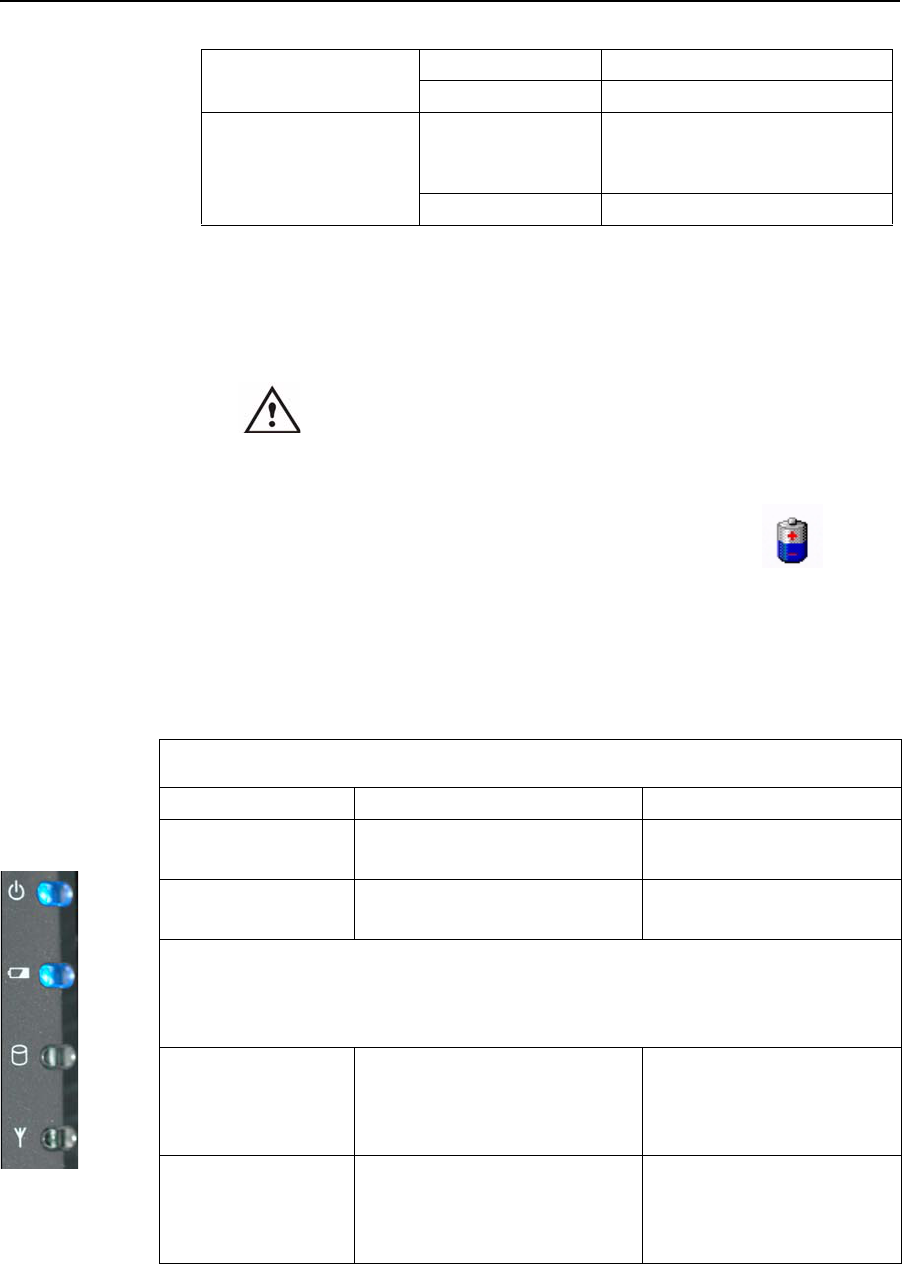
16 Motion Computing LE1600 and LS800 Tablet PC User Guide
Battery Status LEDs
Your Motion Tablet PC is equipped with a smart battery that provides
information about its power status. You must remove the battery from the
Tablet PC to see the battery status LEDs.
CAUTION: To avoid personal injury, or the risk of fire
or explosion if the battery is overheated, wait until the
battery cools to room temperature before recharging
or replacing it.
NOTE: If the unit is operating on battery power, you
can move the pen over the Power/Battery icon
(shown here and found in the system tray at the
lower-right corner of the Tablet PC display) to see the
number of hours of battery life and the percentage of battery
charge remaining. You can also view the charging status of
the battery by opening the Motion Dashboard or tapping the
AC plug icon in the system tray (when plugged in).
Hard Disk Drive Flashing/On Some HDD activity
Off No HDD activity
Wireless Activity Independently
flashing white and
blue
Wireless is on:
White=802.11
Blue=Bluetooth
Off Wireless is off
Power
Battery
Hard
Disk
Drive
Wireless
Front Panel Battery Status LED
Battery LED Battery Status Action
Steady blue Battery charged
(AC plugged in) None
Amber Battery charging (AC plugged
in) None
NOTE: When the remaining battery charge is 10%, your Tablet PC issues a Low
Battery alarm message in addition to the LED warning. For information about
modifying this alarm (you can set it to display a message or to produce an audible
warning), refer to “Configuring Your Power Management Settings” on page 35.
Fast-flashing amber
(lasts only a few
seconds)
3% battery charge remaining
(AC unplugged) The Tablet PC issues a
Critical Battery alarm and
automatically goes into
Hibernate mode.
Slow-flashing amber The battery is too hot to charge Move the Tablet PC/ battery
to a cooler environment
until the temperature is
closer to normal.

Motion Computing LE1600 and LS800 Tablet PC User Guide 17
Refer to “Power Management” on page 35 for more information about your
battery and power settings.
SOFTWARE
OVERVIEW
Your new Motion LE1600 and LS800 ships with the standard Motion
software, including Security Center, and the Motion Dashboard. In
addition, the software includes the Microsoft Windows XP Tablet PC Edition
2005 Operating System with a Tablet PC Input Panel (TIP) that includes
enhanced ink-to-text experience and word recognition, and an improved
security infrastructure that helps defend against viruses, worms, and
hackers.
Motion Dashboard
The Motion Dashboard puts many operations at your fingertips for
convenient access and control. To open the Motion Dashboard, press the
Motion Dashboard button. The Motion Dashboard can be viewed in the
Category View or the Classic View (shown below). While the settings are
the same in either view, the Category View conserves space on the screen.
NOTE: Hibernate mode attempts to save data in any open programs to your hard
disk drive. When you restart the Tablet PC, it should return to the same system
status as before hibernation.
Off Tablet PC is unplugged from
AC power and the system is
running on battery power.
Plug the Tablet PC into AC
power if you want to
preserve battery power.
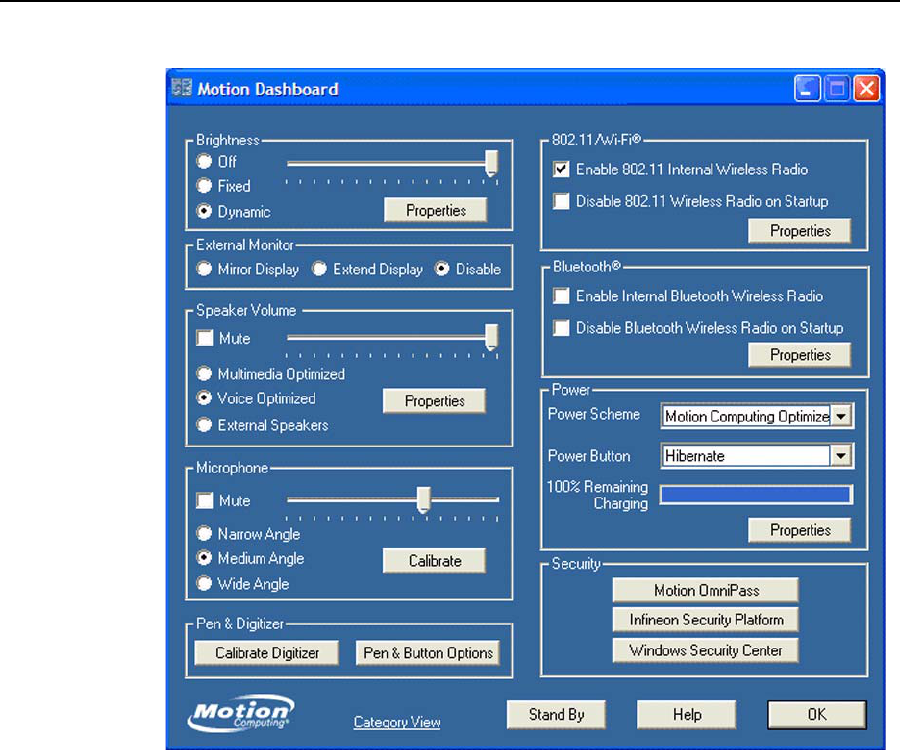
18 Motion Computing LE1600 and LS800 Tablet PC User Guide
NOTE: The Motion Dashboard does not include an “Apply” button. When
you change a setting, the change occurs immediately. Tapping “OK” on the
Motion Dashboard closes the window. Also, if you disable your wireless
connection from the Motion Dashboard, it may still appear to be working
for a short time. The wireless/Bluetooth LED may continue to blink for a few
seconds. This is a timing delay; the connection ends shortly.

Motion Computing LE1600 and LS800 Tablet PC User Guide 19
Motion Dashboard Features
Feature Description
Display
Brightness The built-in Ambient Light Sensor (ALS) detects light in the
environment and automatically adjusts the display brightness.
Available settings:
•Off
— Blanks the display to save power
•Fixed
— Maintains a fixed brightness level on the display that
remains constant under varying light conditions
•Dynamic
— Uses ALS to maintain a relative brightness level
on the display in varying light conditions
NOTE: For optimal battery life benefits and
viewability from ALS, set the brightness scale to
the mid-point or slightly above. If the setting is
higher than this, you lose some of the battery-
saving benefits while gaining minimal improve-
ment in viewability.
Display
Brightness The built-in Ambient Light Sensor (ALS) detects light in the
environment and automatically adjusts the display brightness.
Available settings:
•Off
— Blanks the display to save power
•Fixed
— Maintains a fixed brightness level on the display that
remains constant under varying light conditions
•Dynamic
— Uses ALS to maintain a relative brightness level
on the display in varying light conditions
NOTE: For optimal battery life benefits and
viewability from ALS, set the brightness scale to
the mid-point or slightly above. If the setting is
higher than this, you lose some of the battery-
saving benefits while gaining minimal improve-
ment in viewability.
External
Monitor The Tablet PC has a dual-head video controller that can “mirror”
the Tablet PC display or extend it to a second monitor or
external device, such as a data projector. This feature is
disabled by default.
Available settings:
• Mirror Display — Clones or duplicates the Tablet PC display
on another monitor or projector
• Extend Display — Enlarges the overall desktop work space
to include both the external monitor and the Tablet PC display
• Disable — Disables the External Monitor feature

20 Motion Computing LE1600 and LS800 Tablet PC User Guide
Audio -
Speaker
Volume
Available settings:
• Mute the speaker sound; sliding the scale changes the
speaker volume
• Multimedia Optimized — Best equalization setting for sound
reproduction from the Tablet PC for a CD player, DVD, or
sound recorder
• Voice Optimized — Best setting for voice reproduction from
the Tablet PC speakers
• External Speakers— Best setting for external speakers or
headphones
• Properties — Access advanced operating system controls to
configure your audio experience. Tap Volume Control >
Options > Properties to set Playback and Recording for a
selected device.
Audio -
Microphones Available settings:
• Mute — Sliding scale changes microphone volume
• Narrow Angle — Best setting for dictation, Voice over IP
(VoIP), or “voice noisy” environments
• Medium Angle — Best setting for small group, conference
table, or “voice quiet” environments; the microphone detects
sounds from a larger area
• Wide Angle — Best setting for an open meeting room
• Calibrate — Trains the microphones to focus on sounds from
a particular location or angle
Pen and
Digitizer Available Options:
• Calibrates the pen to the display
• Pen and Button Options — Changes Tablet PC, pen, and but-
ton properties, such as key assignments, right/left handed-
ness, or the right-click function; enable the eraser for
applications that support an eraser.
Wireless Available Settings:
• Enables/disables the 802.11 (Wi-Fi) and/or Bluetooth wireless
radio
• Disables either or both wireless devices at Tablet PC start up
(useful in environments where policy prohibits wireless opera-
tions)
• The physical wireless button (not on the Motion Dashboard)
is intended for situations where you want to shut wireless
down quickly and reliably.
Power
Management Lets you set power schemes and power button options; also
displays remaining battery power. You can select from an
extensive list of power schemes or you can create custom
power schemes to fit your environment.
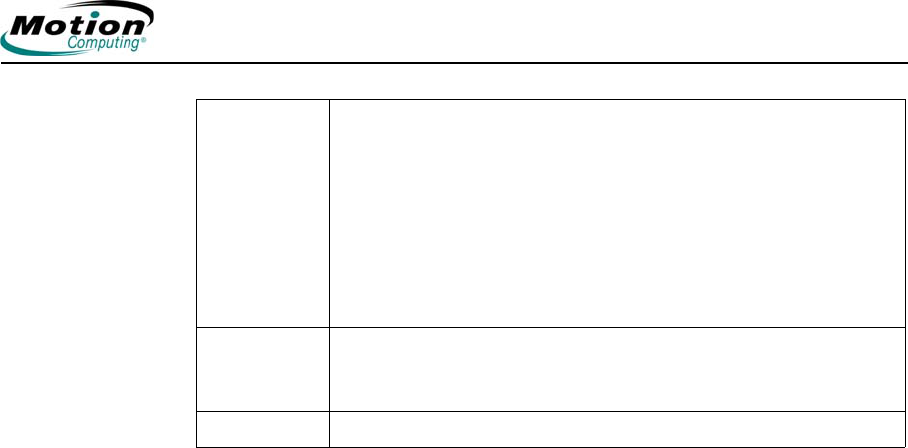
Motion Computing LE1600 and LS800 Tablet PC User Guide 21
Motion Third-Party Software Solutions
Visit the Motion website at www.motioncomputing.com/products and select
Software. You will find links to software solutions to purchase as well as free
downloads from Motion software and service partners.
All Motion Tablet PCs come packaged with CDs for the repair and recovery
of the operating system and utilities and drivers. Separate application CDs,
including the Motion Pak and Microsoft Office Pak software, are optional at
the time of purchase.
Motion
Security
Center
Opens the Motion Security Center where you can do the
following:
• Access Motion OmniPass; refer to “The Fingerprint Reader
and Motion OmniPass” on page 41
• Review or modify Trusted Platform Module settings; refer to
“Infineon Trusted Platform Module” on page 51
• Open the Microsoft Security Center to review or modify Win-
dows security settings; refer to “Using Windows Security” on
page 52
Stand By Puts the Tablet PC in a low-power Stand By state for a
temporary suspension from which you can quickly resume a
Windows session.
Help Displays Motion Dashboard Help application

22 Motion Computing LE1600 and LS800 Tablet PC User Guide

Motion Computing LE1600 and LS800 Tablet PC User Guide 23
Chapter
2
Using Your Motion Tablet PC
This chapter is divided into the following sections:
• “Pen and Ink” on page 23
• “Audio and Video” on page 30
• “Power Management” on page 35
• “Security Features and Settings” on page 40
• “Speech” on page 55
• “Ports, Slots and Connectors” on page 60
• “Wireless Networking” on page 62
• “Configuring Buttons” on page 72
Each of these sections includes a brief introduction to the topic, and
information on how to access and use the feature or function. Other than a
brief introduction to these topics in Chapter 1; all other information regarding
the topic, including set up, operating procedures, and helpful hints, is in this
chapter.
PEN AND INK A significant difference between using a standard personal computer or a
laptop and your Tablet PC is the use of pen and ink in software applications.
Some software applications are designed specifically for pen and ink while
others may be “ink enabled” to improve their suitability with ink input. Be
aware that you need to turn on the ink in Microsoft Word or Microsoft Excel
to be able to write over what is being displayed. You can also use the Tablet
PC Input Panel (TIP) to enter text directly.
Configuring Tablet and Pen Settings
The Tablet and Pen Settings window is accessed by tapping the Pen and
Button Options button in the Pen and Digitizer area of the Motion
Dashboard. You can make selections to set up the following from the
various sub-windows of the Tablet and Pen Settings window:
• Settings Tab
• Select right-handed or left-handed to improve handwriting
recognition
• Set the menu location for right-handed or left-handed display
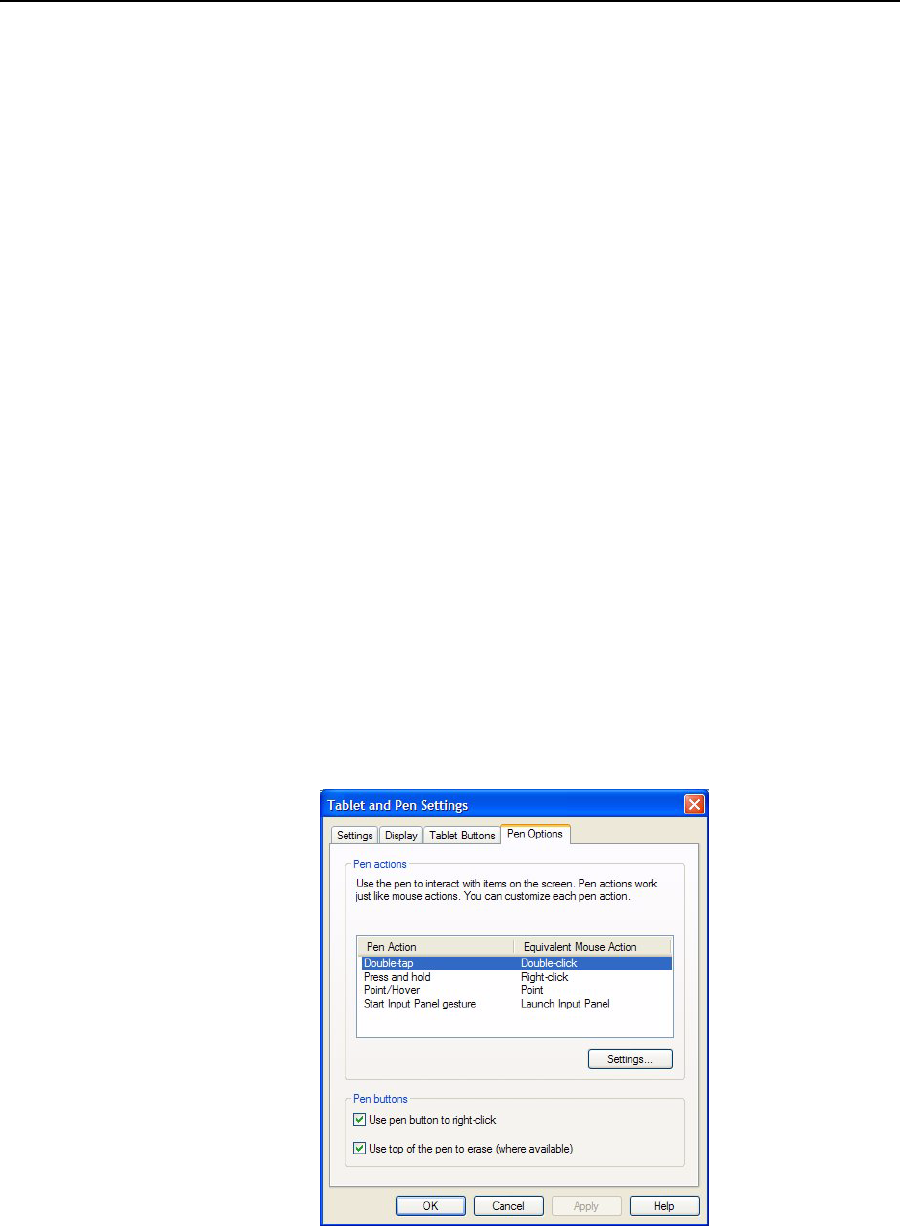
24 Motion Computing LE1600 and LS800 Tablet PC User Guide
• Set the calibration for each orientation
• Change the rotation sequence
• Set the display screen brightness
• Display Tab
• Select and preview the primary screen orientation
• Change the rotation sequence
• Set the screen brightness for each power setting
• Tablet Buttons Tab
• Set up the front panel buttons
• Set same for all orientations, or
• Set different for each orientation
• Pen Options Tab
• Set up the pen and equivalent mouse actions
• Set up the pen buttons and enable the eraser (application
dependent)
Click on each tab and practice setting different options. The default settings
may be perfect for your work situation, but if not, the Tablet and Pen
Settings window lets you set up your Tablet PC according to your unique
needs.
The following illustration is a sample Tablet and Pen Settings window - this
window includes a checkbox to enable the eraser - if your eraser is not
functioning properly, make sure this box is checked. Also, availability of the
eraser is application dependent; not all software applications allow the top of
the pen to be used as an eraser. Refer to the Microsoft Help application for
more information about these features (tap the HELP button).
Calibrating and Using Your Digital Pen
Be sure to calibrate your pen in both portrait and landscape orientations the
first time you start your Tablet PC, then again at other times if the cursor
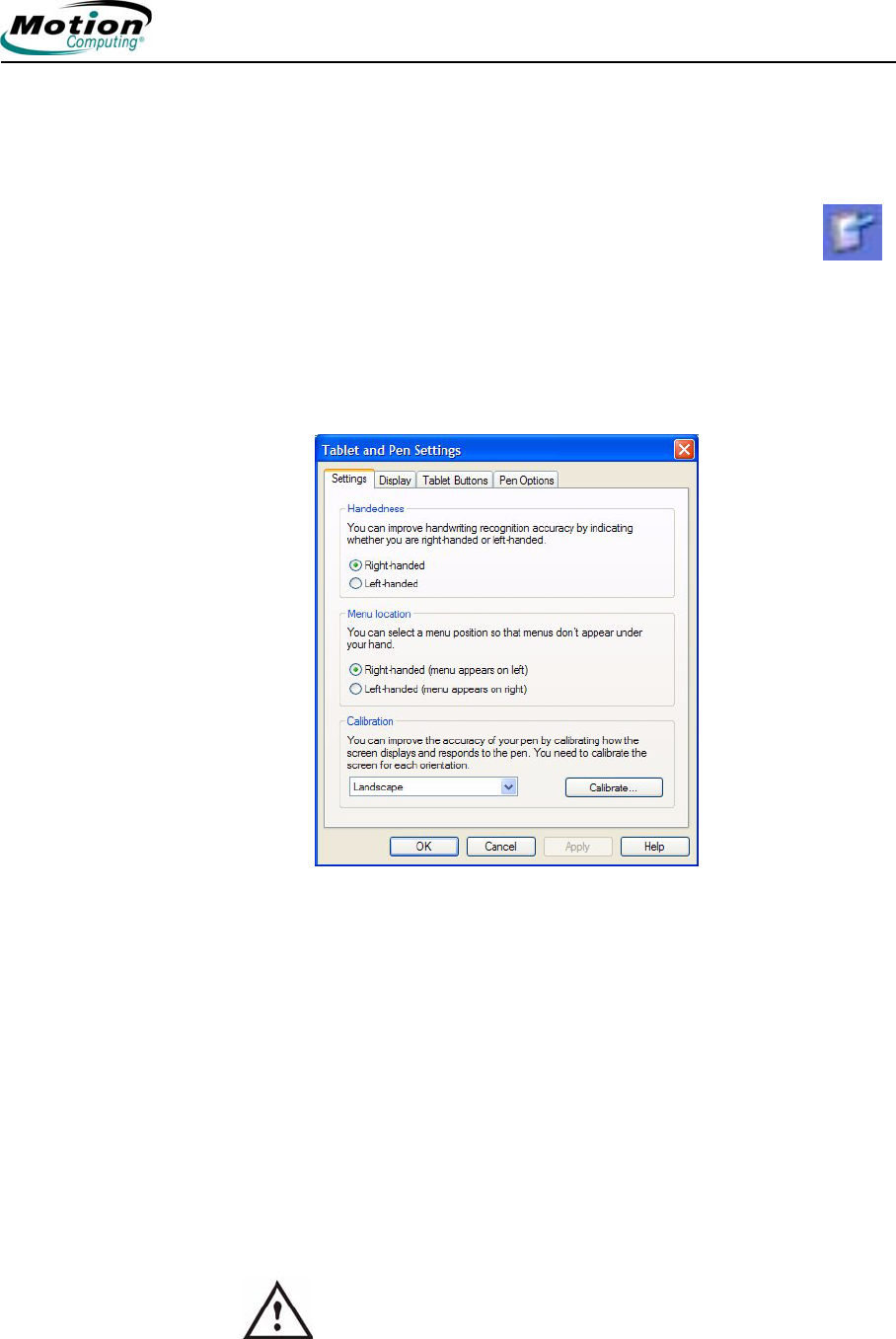
Motion Computing LE1600 and LS800 Tablet PC User Guide 25
does not seem to line up with the pen tip. Calibration ensures the accuracy
of the pen and adjusts the input angle for each person who uses it. The
Tablet PC stores calibration data and settings on a per-user basis.
1. Open the Motion Dashboard and tap Calibrate Digitizer.
Or double-tap the Tablet and Pen Settings icon in the
system tray, located in the lower right-hand corner of the
display window. This opens the Tablet and Pen Settings
window.
NOTE: The Tablet and Pen Settings icon may be hidden in
the system tray. Tap the system tray left-arrow to show all
hidden icons.
2. Hold the pen naturally, angled as if you are writing with a pen, and
tap the pen point in the center of each of the four calibration
crosshairs as they appear. During calibration, try to position the
Tablet PC as close to the way you will use it as possible, whether
holding it in portrait or landscape orientation or using it in a FlexDock
for the LE Series or with a Convertible Keyboard. Changing the pen
or display angles affects the calibration.
3. If you change the orientation, you may need to calibrate the pen
again.
When using the pen as a cursor, you can determine if you are in the right
place to select a menu item. For example, look at the position of the pointer
on the screen, not where the pen touches the display.
CAUTION: Do not write on the Tablet PC display
with ink pens or other sharp objects that could
damage it. Do not use markers that could also
damage the display.
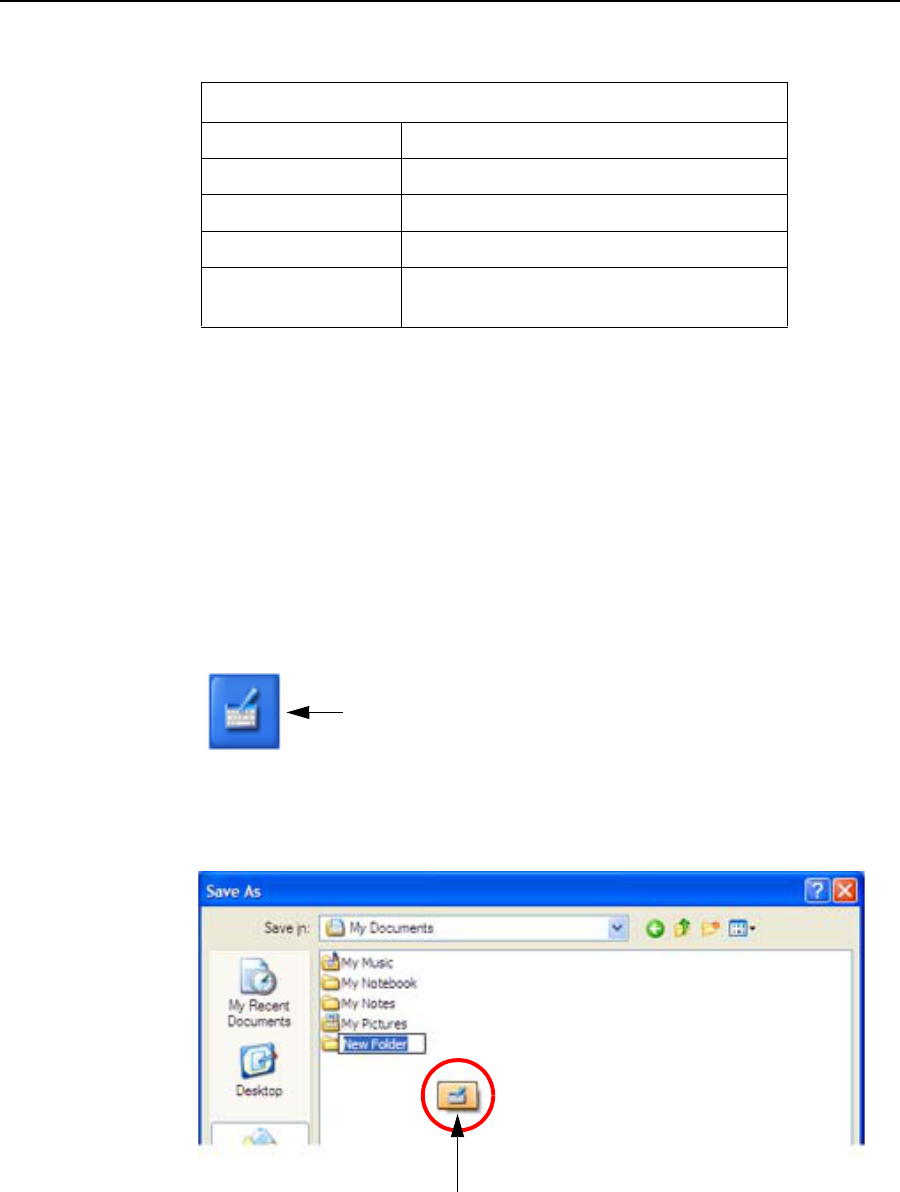
26 Motion Computing LE1600 and LS800 Tablet PC User Guide
Refer to the following to compare mouse and pen actions:
Deactivating Pen Button to End Accidental Right-Clicks. If you find that
you accidentally press the pen button when you write, you may want to
deactivate this option. (You will still be able to open right-click menus by
pressing and holding the pen against the display surface.)
Using the Tablet PC Input Panel
The Tablet PC Input Panel (TIP) is the primary tool for entering text and
provides several text correction and control options. The TIP also includes
buttons for activating speech recognition and voice command capabilities. It
is opened by tapping the TIP icon in the Windows task bar. In some
applications, a small TIP icon floats nearby. As you move your pen close to
the display; tap that icon to open the TIP.
Using the TIP. The following example shows how the TIP icon appears in a
“Save As” window; you can tap the icon to open the TIP panel to use
handwriting or the on-screen keyboard to enter the name of the New Folder.
Mouse versus Pen Actions
With a Mouse With the Digitizer Pen
Point and click Point and tap the pen on the display.
Double-click Double-tap the pen on the display.
Click-and-drag Tap-and-drag the pen on the display.
Right-click Press the pen button while tapping, or
press and hold the pen on the display.
TIP icon: Tap the icon to open
the Tablet PC Input panel (TIP).
Tap to open the TIP
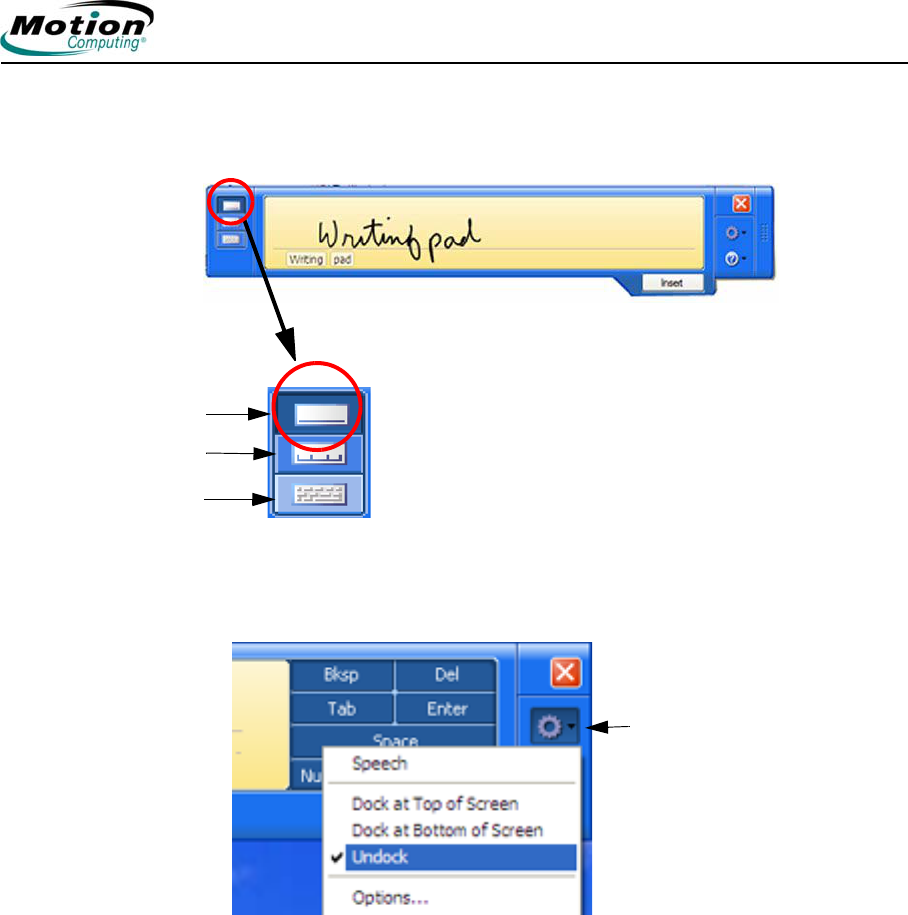
Motion Computing LE1600 and LS800 Tablet PC User Guide 27
When you tap this icon, the writing pad opens. As you write, the recognition
software interprets the writing and displays a text equivalent below the line.
You can change from the writing pad to a
character pad or on-screen keyboard at any time
by tapping the appropriate icon on the left side of
the TIP panel. On the right side of the TIP panel
there are icons for Tools and Options and for TIP
Help.
Tap the Tools and Options (small gear) icon to access the following
selections:
•Speech - If this is the first time you selected Speech, a Speech Recog-
nition Enrollment window is shown. You must adjust the microphones
(using the Motion Dashboard) and train for your voice before speech
recognition is functional. This can take several minutes. After training,
tapping Speech shows that Dictation and Command icons have been
added to the TIP panel. Tapping either Dictation or Command opens a
voice input window. For more information about Speech, refer to “Motion
Speak Anywhere Technology” on page 56.
•Dock at Top of Screen. Moves and locks the TIP at the top of the
screen.
•Dock at Bottom of Screen. Moves and locks the TIP at the bottom of
the screen.
•Undock. Closes the TIP if shown; allows it to float undocked the next
time it is opened.
Tools and Options icon
Writing Pad
Character Pad
On-Screen
Keyboard
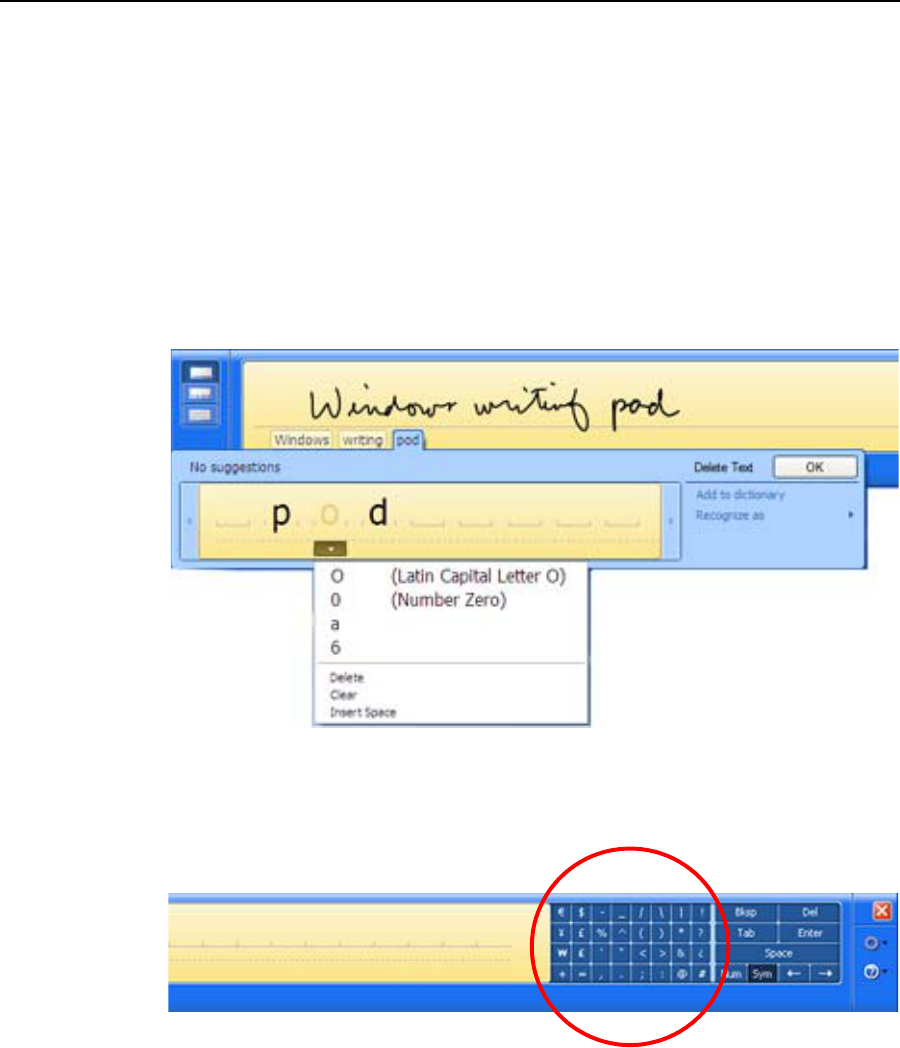
28 Motion Computing LE1600 and LS800 Tablet PC User Guide
•Options. Opens the Options window, where you can change many of
the finer aspects of the pen and its usage in the TIP. There is also a link
to Help that is specifically for the Tablet PC TIP.
Using the writing pad. As you write, the software selects the best match
for a word from its dictionary of words and displays it on screen. Tap on a
word to select it.
In the following example, either handwrite directly over the incorrect
character or tap the character to open a list of alternatives (as shown here:
O, 0, a, 6). You can erase a word you have just written, by rapidly scratching
back and forth over it.
The writing/character pad expands to show Numbers (Num) or Symbols
(Sym) toolbars, whose symbols are inserted immediately in the text entry
area as you select them. Then, when you begin to handwrite on the writing
or character Pad, the Num or Sym toolbar closes.
Using the character pad. Use the character pad for acronyms, equations,
or other entries that require individual letters, numbers, or symbols that the
writing pad may interpret incorrectly. Some examples include the following:
~<!<@<#<$<%<^ and*()_+<>{}[] \ /. Symbols/letters are displayed in a text
equivalent that you can individually correct by:
• Handwriting over the text equivalent in each character space
• Clicking on the arrow under the letter and selecting an alternative from
the drop-down menu
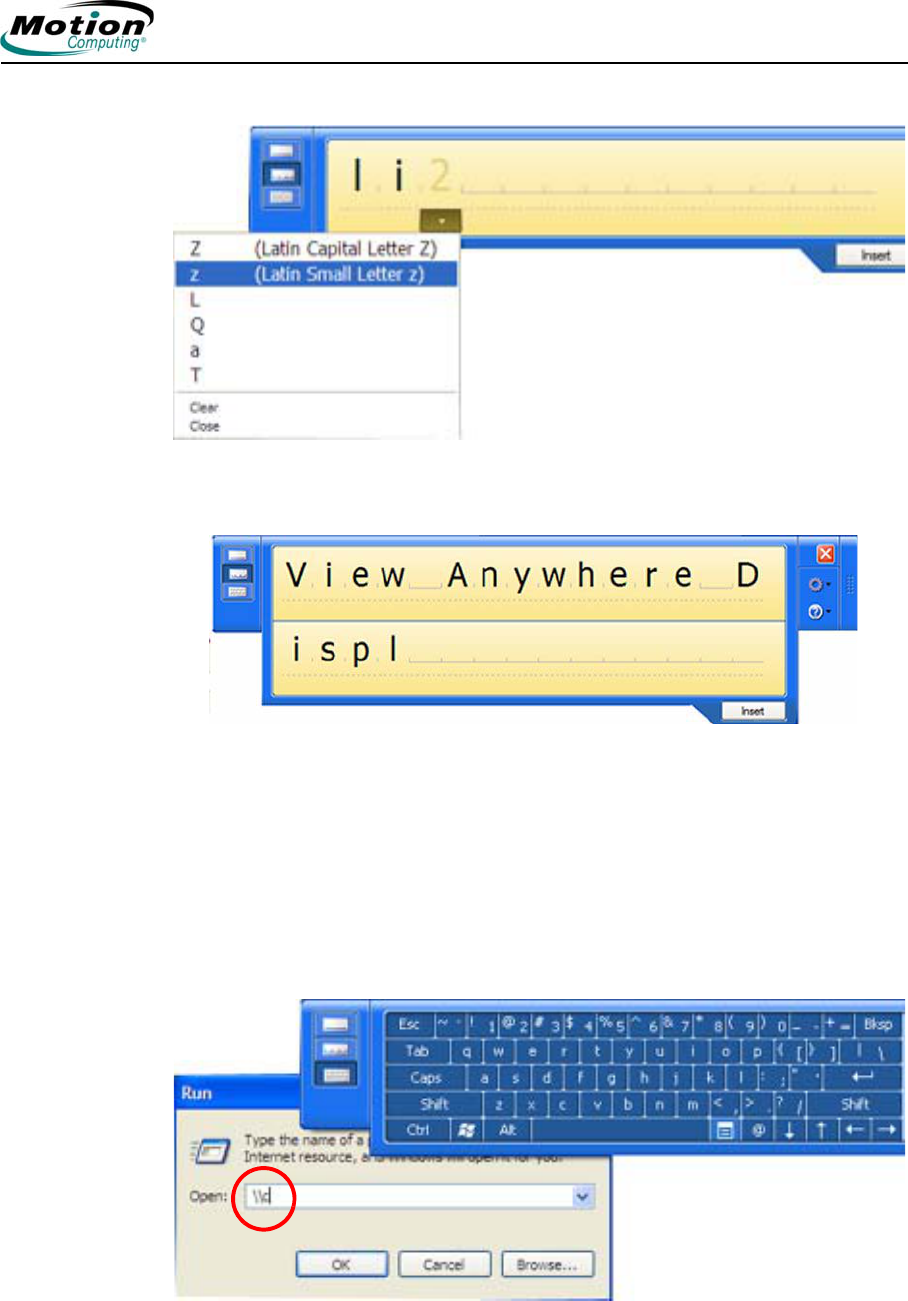
Motion Computing LE1600 and LS800 Tablet PC User Guide 29
The writing pad expands vertically when you get near the end of the panel.
Using the on-screen keyboard. You can use the on-screen keyboard to
type words, letters, numbers, and characters from keyboard using your pen.
For improved security and accuracy, you may want to enter passwords with
the on-screen keyboard instead of handwritten text.
NOTE: When using the on-screen keyboard, be sure to place
your cursor where you want to enter text in the text entry box
before you tap Insert.
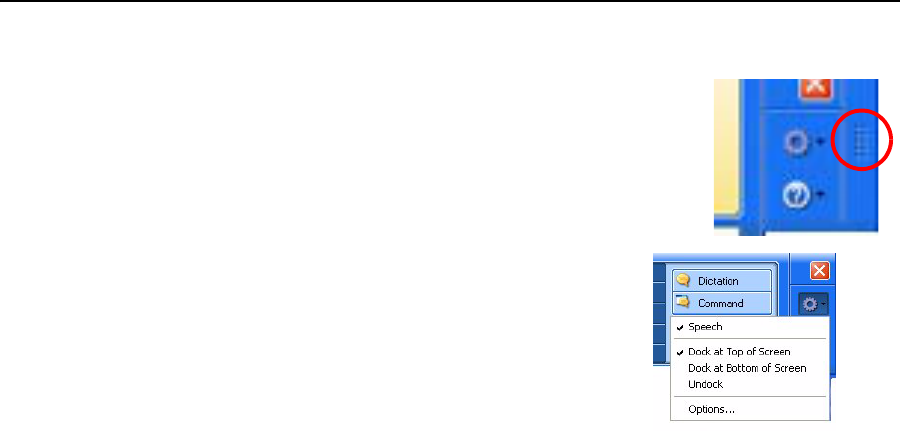
30 Motion Computing LE1600 and LS800 Tablet PC User Guide
Helpful Hints: Using the TIP Window
• Move the TIP panel on your desktop using the
bar on the right - only available when the TIP
panel is not docked/locked at the top or bottom of
the screen. When it is docked at the top or bot-
tom, it cannot be moved.
• Customizing — Select Tools and
Options (the gear icon) then Options...
from the TIP window to open the
Options window at the
General tab. You can customize many
features in the TIP. Select one or more of
the tabs and set the desired options.
• Refer to the Help and the Tutorials that
are provided as part of the Windows
Operating System. Or refer to the Help information that is provided in the
Options window.
• In some applications, you may need to double tap to enable pen and ink
functions.
AUDIO AND
VIDEO
The Audio and Video controls are in the Motion Dashboard in the Audio
and Display sections. You will find additional information regarding audio
settings and acceptance angles in the Speech section of this chapter, refer
to “Speech” on page 55.
Motion Dashboard Audio System Controls
The Motion Dashboard contains volume and directional controls for both
speech recognition and recording functions. You should perform this
procedure before you train your Tablet PC for speech recognition or voice
commands.
Speaker Volume. While the noise suppression software removes most
background noise, in some cases speaker playback (such as background
music or intermittent audio messages) can affect recording. In general,
reducing speaker volume will eliminate these extraneous noises.
Microphone Volume. The default volume setting for the microphones is at
roughly two-thirds of the sliding scale. When recording, dictating, or using
voice commands, you may need to adjust this setting until you achieve the
desired results.
Adjusting Display Settings and Screen Brightness
The Display settings on the Motion Dashboard are used to set the
brightness level of the LCD display. These settings are used in conjunction
with the Ambient Light Sensor (ALS) to maintain a level of brightness and
contrast in all lighting conditions.
The built-in light sensor located on the Tablet PC front panel measures the
ambient light in the environment. The system then automatically balances
the brightness of the Tablet PC display in relation to the surroundings. You
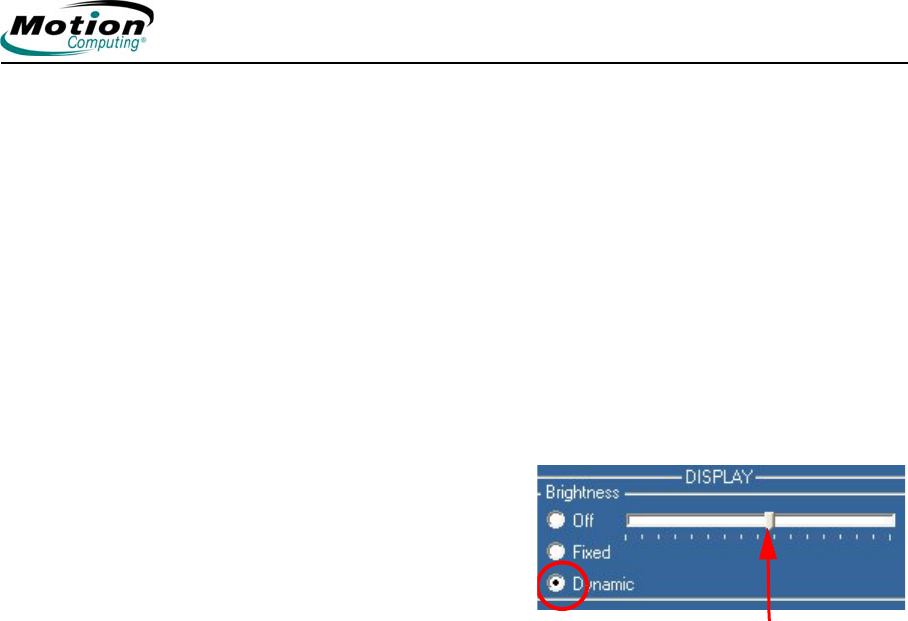
Motion Computing LE1600 and LS800 Tablet PC User Guide 31
can set brightness modes from the Motion Dashboard (note: you can also
turn the display off).
• Fixed — Sets the display brightness to a fixed level (ALS is off); use the
slider to adjust the display to the desired brightness level
• Dynamic — Sets the display so that the system adjusts the brightness to
the preferred level under changing lighting conditions while maintaining
viewability (ALS is on)
Setting “Dynamic” Display Brightness: ALS On. When you turn on the
ALS, the display will automatically brighten if you move from dim to bright
light (within the range supported by the hardware), or automatically dim if
you move to an environment with a lower level of lighting. You may not be
able to visibly detect the adjustment. Using ALS also helps to reduce power
consumption when possible.
1. Open the Motion
Dashboard.
2. Under Display, tap the radio
button beside Dynamic.
3. Move the slider until the
Tablet PC display is at the
preferred brightness level.
The system will then auto-
matically adjust the display
brightness to changes in lighting.
Setting “Fixed” Display Brightness: ALS Off.
1. Open the Motion Dashboard.
2. Under Display, tap the radio button beside Fixed.
3. Move the slider until the brightness is at the desired level. The
system will keep the same brightness level at all times; that is, it will
not adjust the display brightness to changes in lighting.
NOTE: In low-light settings, the “Fixed” brightness setting
may keep the display brighter than is needed for good
viewability. Keeping the brightness always at the same level
may also use more battery power than necessary.
Turning the Display On and Off.
1. Open the Motion Dashboard.
2. Tap Off in the Brightness area of the Display settings.
NOTE: To turn the display back on, wave your pen over the
display or press any key on the keyboard. When the display
comes on, the Fixed/Dynamic setting remains selected as it
was.
Changing Display Orientation. An interesting and useful feature of the
Tablet PC is the ability to change the screen orientation from landscape to
portrait by pressing a button. Also, you can rotate the screen in 90-degree
increments. The Tablet PC flexibility in changing the screen orientation
Move slider to preferred
brightness level.
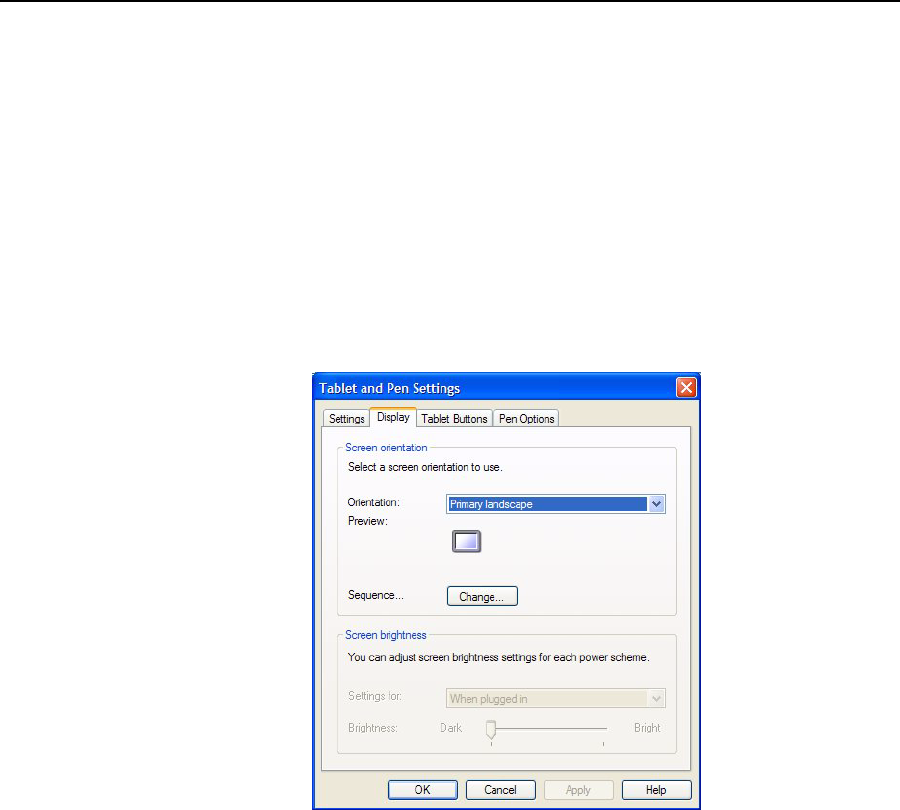
32 Motion Computing LE1600 and LS800 Tablet PC User Guide
allows you to set the view to suit your purpose. You may be using an
application where it is more advantageous to have a portrait (vertical) view
of the screen. You may be filling out a form that is longer than the standard
screen view. At other times you may want to view a wider than normal page;
in this instance you would use landscape view. The Tablet PC provides
several ways to change the display orientation quickly:
• The quickest way to rotate the screen is to press the Rotate button.
Be aware that changing the screen orientation may require you to
recalibrate the pen; refer to “Calibrating and Using Your Digital Pen” on
page 24. Use the pull-down menu to see the other orientation settings. You
can also change the sequence for rotating from one orientation to another.
Mirroring or Extending Your Display. The Tablet PC has a Dual Head
Video Controller that lets you run a presentation from your Tablet PC on an
external monitor or data projector while taking notes in ink. You can also
move applications onto a second monitor to create additional work space.
How To Connect the Tablet PC and a Monitor or Projector Example.
1. Plug the VGA monitor cable into the VGA port on the Tablet PC or
Motion FlexDock for the LE Series.
2. Connect the external monitor or data projector to a power outlet and
turn it on. The software recognizes the external monitor or data pro-
jector and searches for a driver.
3. If necessary, install the driver from the CD supplied by the monitor’s
manufacturer.
4. Set up the mirrored desktop or external display, using the steps in
the following sections.
IMPORTANT: Be sure to drag any application window back to
the Tablet PC display before shutting down the external data
projector or monitor. Otherwise, you cannot access the
application(s) to shut it down. If you do leave an application
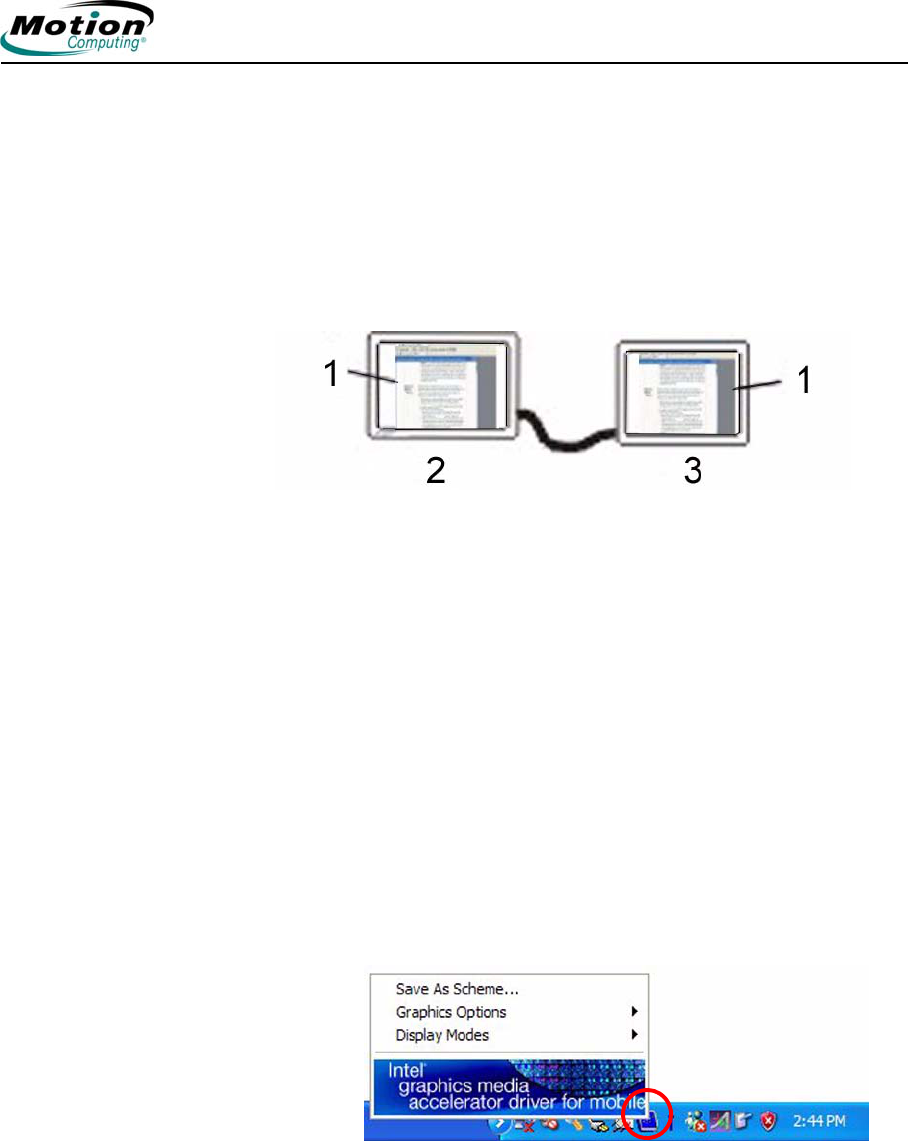
Motion Computing LE1600 and LS800 Tablet PC User Guide 33
open on the extended display, you can disable it from the
Windows Control Panel Display Properties or from the
Motion
Dashboard.
Setting Up a Mirrored Display. Use this feature to connect an external
projector for presentations or an extra display on your desk. This
example shows a Word document (1) displayed (“mirrored”) on both the
Tablet PC (2) and an external monitor (3).
Mirrored Display Example: (1) Word document; (2) Tablet
PC display; (3) external monitor
NOTE: The resolution and orientation of the external monitor
will be the same as the Tablet PC display.
To Mirror the Tablet PC Display, Do the Following:
1. Open the Motion Dashboard.
2. Select the Mirror Display radio button under External Monitor.
This setting automatically creates an identical display on the exter-
nal monitor.
NOTE: You can also tap the icon for the Intel Graphics Media
Accelerator Driver for Mobile, in the system tray at the bottom
right of the Tablet PC display (or found in the Windows Control
Panel) to set up this feature from the Graphics Media pop-up
menu.
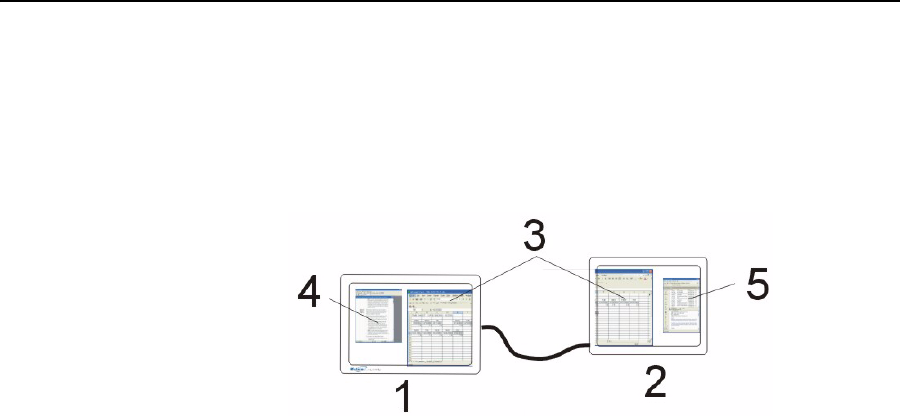
34 Motion Computing LE1600 and LS800 Tablet PC User Guide
Setting Up an Extended Display. Use this feature when you want to
simultaneously open applications on two monitors and significantly expand
your workspace without hiding open documents under layers of other work.
This example shows the Tablet PC (1) and an external monitor (2) with an
Excel spreadsheet extended across both. It also shows a Word document
(4) on the Tablet PC and e-mail (5) on the extended desktop.
Extended Desktop Example: (1) Tablet PC display; (2) external monitor; (3)
spreadsheet; (4) Word document; (5) email message
To Extend the Tablet PC Display, do the following:
1. Open the Motion Dashboard.
2. Tap the Extend Display radio button under External Monitor. This
setting automatically extends the Tablet PC display to the external
monitor.
NOTE: You can also tap the icon for the Intel Graphics Media
Accelerator Driver for Mobile in the system tray at the bottom
right of the Tablet PC display (or found in the Windows Control
Panel as Intel GMA Driver for Mobile) to set up this feature
from the pop-up menu, or tabbed window respectively.
Creating Schemes for External Monitors
To create a special screen resolution scheme. This feature can be used
to create named schemes for one or more external monitors. After creating
and saving the scheme, you can access it by right-clicking on the operating
system desktop and selecting the scheme name from the pop-up menu that
is shown.
1. Tap the Intel Graphics Media Accelerator Driver for Mobile icon
in the system tray, located at the bottom-right corner of the display;
then select Graphics Options > Graphics Properties.
2. This example illustrates the Mobile Intel 915GM/GMS, 910GML
Express Chipset Family window. From that window, select the
Schemes tab. The current Video Mode is displayed (the following
example applies to the LE1600 Tablet PC only).
3. Select the desired video mode for the new scheme
4. Tap the New... button in this window.
5. Type in a name for the new scheme. Tap OK to save the scheme.
6. Highlight this new scheme in the Schemes window.
7. Add or change the parameters for this scheme.
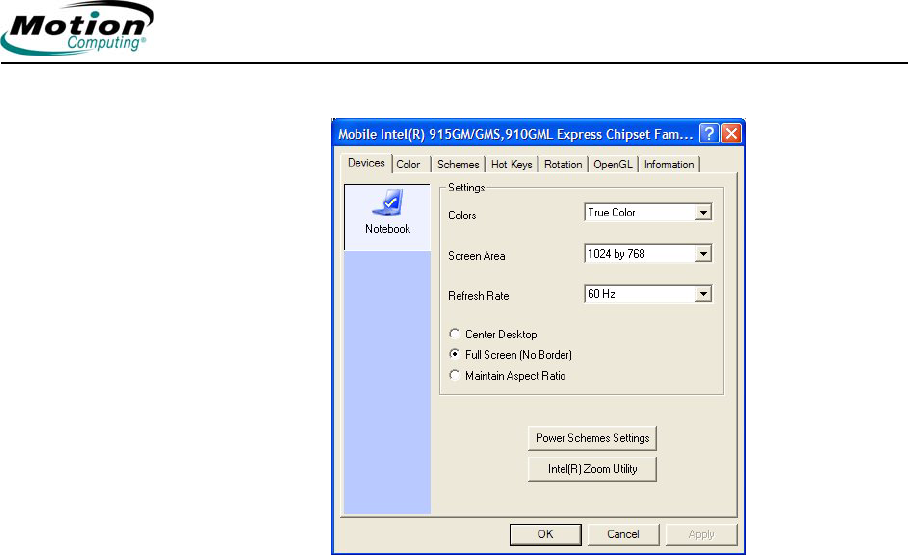
Motion Computing LE1600 and LS800 Tablet PC User Guide 35
8. Tap Save. Right-click on the desktop, select Display Mode and the
new scheme name will be displayed.
Helpful Hints: Mirrored and Extended Modes
• Use a mouse pointing device and keyboard to operate in these modes.
• The pen does not work in the external monitor space of the extended
mode.
• Refer to Mobile Intel Help for more information about creating schemes
for external monitors.
POWER
MANAGEMENT
The Tablet PC provides access to a comprehensive suite of power
management functions by using the buttons and controls on the Motion
Dashboard.
Configuring Your Power Management Settings
The following power-related settings can be accessed, monitored or
controlled from the Motion Dashboard.
• Power schemes
• Alarms for low and critical battery
• Power meter readings for up to two batteries
• Advanced power settings
• Hibernation settings
Tapping the Properties button in the Power area of the Motion Dashboard
opens the Power Options Properties window. Each of the power options is
represented by a tab in this window. Tapping one of the tabs shows the
various properties for that aspect of the Tablet PC power management
feature. The following example shows the window open at the Power
Schemes tab; it illustrates the various power schemes properties that can
be set for the Tablet PC. The remaining option properties windows are
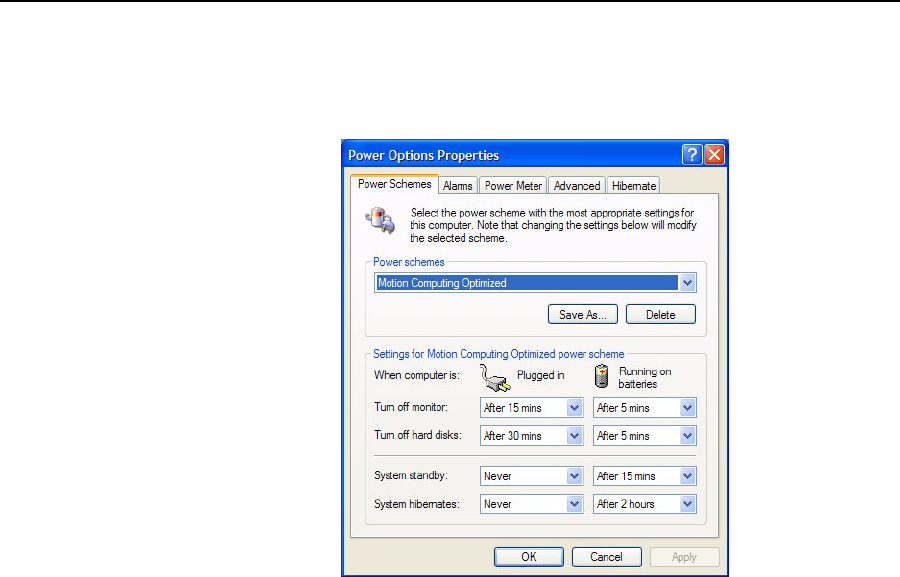
36 Motion Computing LE1600 and LS800 Tablet PC User Guide
described, but illustrations to show the various options are not included in
this User Guide.
Power Schemes. Tap the Power Schemes tab to show the Power
Schemes window. You can select from a set of pre-defined power schemes
that apply to a wide variety of home and work environments. Try it yourself
by selecting one of the options from the pull-down menu and seeing how
your choice affects the power settings. This operation also gives you the
flexibility to define your own scheme and keep the same name or rename it
to something that makes more sense to you.
Alarms. The Alarms tab shows the Alarms window. This option lets you
specify the point at which battery alarms are activated for both the low and
critically low battery level states. You also define the action that the Tablet
PC should take when that battery level is reached. For example, you may
choose to have the Tablet PC sound an alarm, or you may prefer to receive
a text message.
Power Meter. The Power Meter tab shows the Power Meter window and
shows a visual indication of the Battery Status for battery #1 and #2 (if
present and attached to the Tablet PC). The icon shows the remaining
battery level and the text shows the percentage remaining. You can click on
a battery icon to open a detailed information window for that battery.
Advanced. The Advanced tab shows the Advanced window where you
specify the power settings options that you want to use. You can also
specify what you want the Tablet PC to do when you press the Power
switch. Your choices include everything from doing nothing, going into
standby mode, to hibernation, or to performing a shut down of your
computer.
Hibernate. The Hibernate tab opens the HIbernate window where you
enable or disable hibernation by using the Hibernation checkbox. This
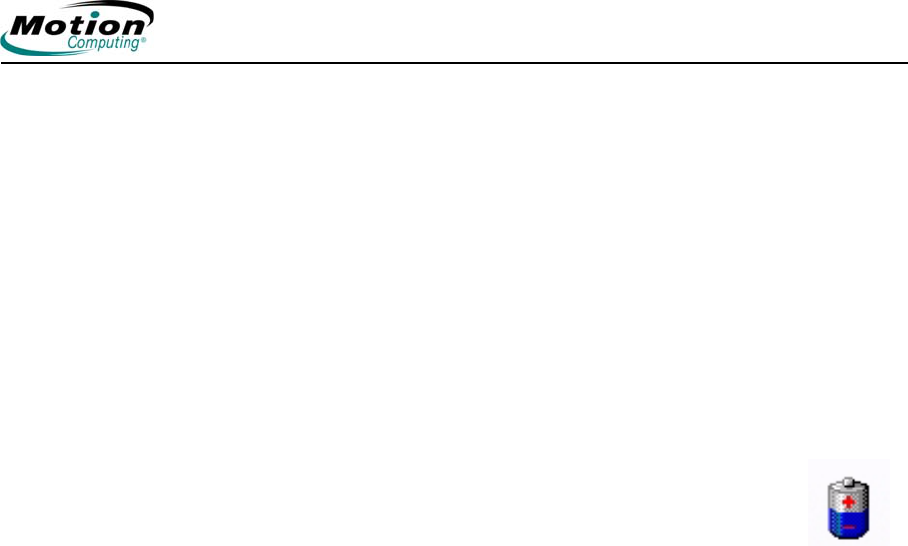
Motion Computing LE1600 and LS800 Tablet PC User Guide 37
window also shows information about the hard drive space on your
computer and details the amount of hard disk drive space required for safe
hibernation. Selecting Hibernate has the following advantages over placing
your Tablet PC in the Stand By state:
• Hibernate saves the state of the desktop and applications
• Hibernate consumes no battery power
• When you return from the Hibernate state, you return to where you were
when you entered hibernation.
Checking Your Battery Power Level. There are several ways to see how
much battery power is left on your Tablet PC. You can determine the
remaining battery power by doing any of the following:
•Reading Battery Power from the Tablet PC Display
To check the power level while you are on battery power,
move the pen over the Power Meter icon, shown here, in
the system tray at the bottom-right corner of the Tablet PC
display. Hovering over this icon shows the number of hours
of battery power and the percentage of battery power
remaining. (Also, the blue area on the battery icon, representing
available power, gets smaller as the battery discharges.)
• Reading Battery Power from the Battery Gauge (requires battery
removal)
Ensure that AC power is plugged into the Tablet PC, or that the Tablet
PC is turned off. Turn the system over so that you are looking at the
back and remove the battery from the top of the tablet. The gauge is
mounted on the backside of the standard battery. Press the button and
look at the LEDs. Each LED represents approximately 20% of the total
available charge.
Note: The Extended Battery information applies only to the LE1600
Tablet PC. If you are using the LE1600 Tablet PC and the optional
Extended Battery is attached, the battery gauge is located on the back
of the Extended Battery, and can be checked without removal. Also, the
gauge on the Extended Battery shows the chage level of the Extended
Battery, not the cumulative charge level.
Caution: When replacing the standard battery, make sure
that the locking latch is in the correct position, moved fully to
the right to lock the battery in place, and that the battery is
firmly installed.
• Reading Battery Power from Motion Dashboard
The Motion Dashboard also has a power gauge that displays the
percent of remaining battery charge. If a Standard Battery and a
Extended Battery are both attached, the power reading is the cumulative
amount of both batteries.
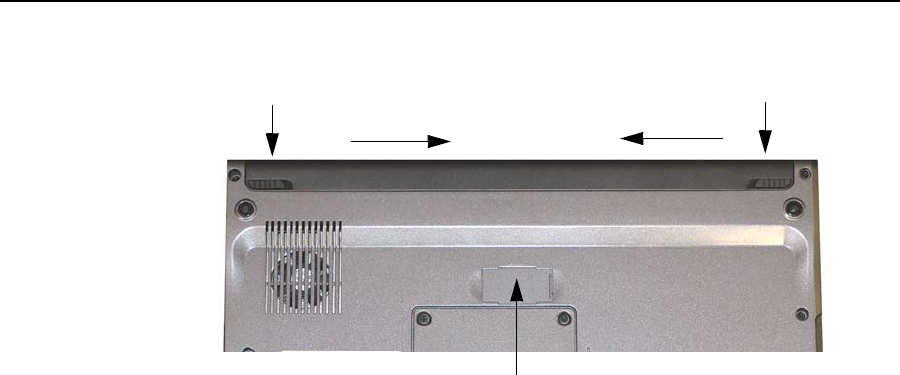
38 Motion Computing LE1600 and LS800 Tablet PC User Guide
• Reading Battery Power from the Power Meter
Right-click on the Power Meter icon in the system tray, located in the
lower right-hand corner of the display window (only visible if you are
running on the battery). To see remaining power, tap Power Meter; or
tap Adjust Power Properties > Power Meter tab.
From the Windows Control Panel (in Classic view), double-click Power
Options. Or (in Category View), tap Performance and Maintenance,
then tap Power Options.
Using Your Batteries
This section describes how to use your Tablet PC battery. The Standard
Battery is located at the top of the Tablet PC. There is an optional Extended
Battery that can be attached to the back of the Motion LE1600 Tablet PC.
The upper center area of the back of the LE1600 Tablet PC includes a small
sliding panel that covers the terminal connections for the Extended Battery.
Caution: Ensure that the sliding panel is open before attempting to
attach the Extended Battery. Otherwise, there may be damage to the
Extended Battery connector.
Both the Standard and the Extended Battery (LE1600 only) will recharge by
using the AC adapter when attached to the Tablet PC.
Charging the Battery. When you connect the Tablet PC to AC power with a
battery attached, the system automatically charges the battery until it
reaches full charge. If two batteries are attached, the primary battery
charges first, followed by the secondary battery. The charging sequence is
staggered to ensure that both batteries become fully charged at nearly the
same time. The standard battery charges to the 80% level, followed by the
Spring-Loaded Latch Locking Latch
Extended Battery Connector
Under Sliding Panel (must be
open to install Extended
Battery)
Slide latches toward center to open
LE1600 Tablet PC with the Extended Battery Connector
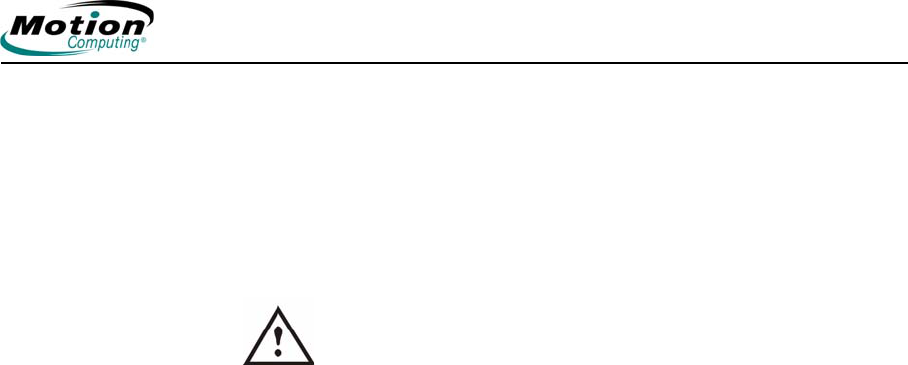
Motion Computing LE1600 and LS800 Tablet PC User Guide 39
Extended Battery charging to the 80% level. Then each battery charges for
a short interval until both reach 100%.
The Battery Status LED is on the Tablet PC flashes amber when the battery
is at a critically low level and changes to solid amber while charging. When
the battery is fully charged, the Battery Status LED is solid blue.
WARNING: To avoid injury, keep the battery within
the recommended temperature range when
charging it. Wait until it cools to room temperature
before recharging it in the Tablet PC or the battery
charger. For more information, see the Safety and
Regulatory Guide shipped with your Tablet PC or the
documentation that came with the battery charger.
Or go to www.motioncomputing.com/support to view
these documents.
To charge the battery:
1. Plug the AC adapter into the Tablet PC, then into a wall outlet or
power strip. (Completely recharging the battery may take up to two
hours, although the battery reaches an 80% charge in much
less time.)
Swapping the Battery. You can swap the Standard Battery while the
system is powered on, with or without having the Tablet PC plugged into an
AC power outlet.
1. If the Tablet PC is running, open the Motion Dashboard and tap
Stand By. The Tablet PC immediately goes into the Stand By state.
2. Alternatively, go to Start > Turn Off Computer.
3. Do one of the following:
• If you are logged on to a domain: When the Turn Off
Computer window appears, tap Stand By or Hiber-
nate from the drop-down list.
• If you are not logged on to a domain: Press the Shift key
on your external keyboard or tap Shift on the TIP on-
screen keyboard to change the option from Stand By to
Hibernate.
NOTE: Here are some key differences between putting the
Tablet PC in Stand By or Hibernate mode to swap the
battery:
• If you choose Stand By, the Tablet PC is designed to
maintain your system for up to 30 seconds while you
swap the battery.
• However, you may have less than 30 seconds if you are
running a number of programs that drain power faster.
• You should save any data before putting the system in
Stand By to swap the battery.
• Choosing Hibernate gives you more time to swap the

40 Motion Computing LE1600 and LS800 Tablet PC User Guide
battery. Hibernate saves the status of the Tablet PC to
your hard drive.
4. Tap Hibernate or Stand By. The Tablet PC opens a dialog box
stating that it is “preparing to standby or hibernate.”
5. Wait until the system shuts down. In Hibernate, all LEDs are off; in
Stand By, the Power LED flashes.
6. Slide the battery release latches on the back of the Tablet PC toward
the center and lift the battery upward to remove it.
7. Insert the new battery until you hear the left latch click, which
ensures the new battery is correctly seated. Slide the right latch fur-
ther to the right to lock it in place. Check to make sure the latches
are fully seated.
CAUTION: To avoid damage to the Tablet PC, install
only Motion Computing batteries, which are specially
designed for the Tablet PC.
Disposing of Used Batteries. The Tablet PC contains a Lithium-ion (Li-ion)
battery that should be disposed of at a hazardous materials recycling center
when it is no longer serviceable. Do not throw it in a waste receptacle where
it will be sent to a landfill.
Helpful Hints: Battery and Power Management
• Use AC power when available to lengthen the battery’s usable life. The
battery will charge automatically as you run on AC power, so leave the
battery in the Tablet PC while you are working.
• Use AC power when installing software or writing to a CD, and for opti-
mal battery life, when using a CD or DVD player.
• When using battery power, if you leave the Tablet PC unattended, place
the system in Stand By or Hibernate.
• Keep in mind that the display, processor, PC Cards, SD cards, wireless
cards, and accessory drives all draw on the battery, so adjust properties
and disable unused accessories and PC Cards when operating on bat-
tery power.
• When using battery power, adjust the power mode and display bright-
ness to lower settings to prolong the battery life.
• Turn off all wireless devices through the Motion Dashboard when not
being used.
• Enable the Ambient Light Sensor (ALS) through Motion Dashboard.
See the section “Adjusting Display Settings and Screen Brightness” on
page 30.
Security Features and Settings
Motion Computing has strongly embraced the need for enhanced platform-
based security for the Tablet PC. The result of that commitment has been to
provide an out-of-box, safe computing environment that enables strong
security protection and that will serve as the foundation for complementary
add-on security technologies. These core security features include
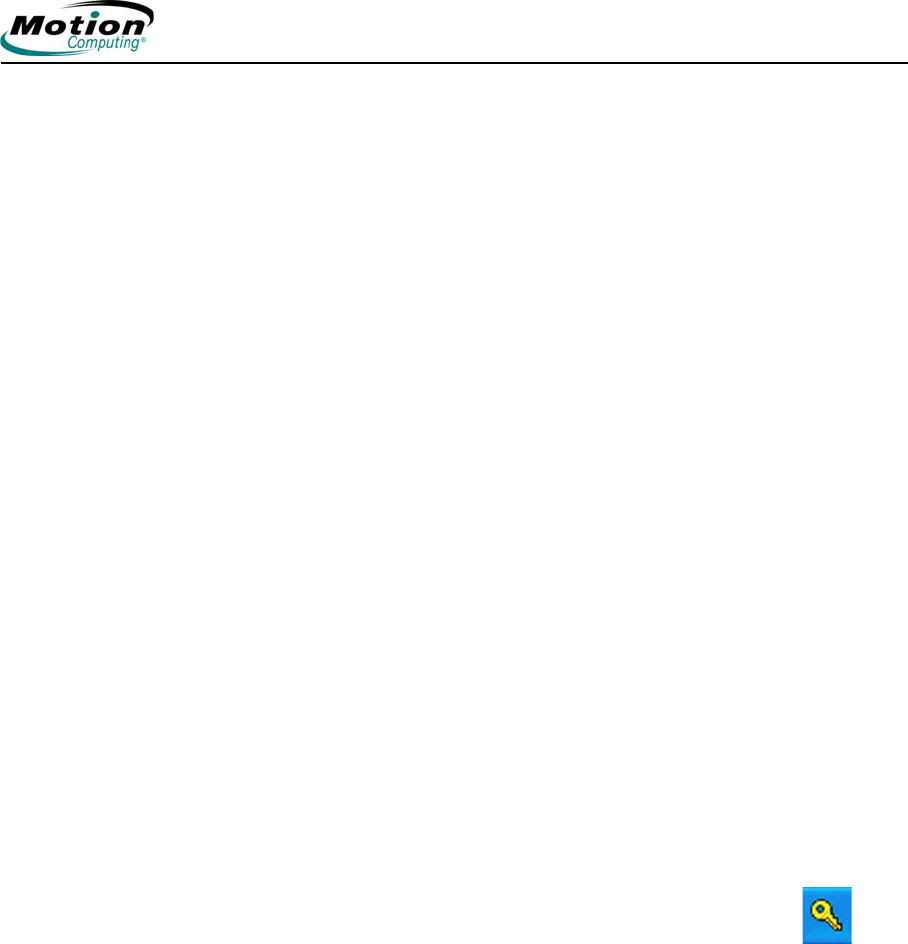
Motion Computing LE1600 and LS800 Tablet PC User Guide 41
password-protected Phoenix TrustedCore BIOS with HDD locking and
networking control, a universal security lock slot, the Motion Security
Center, a built-in fingerprint reader, a Trusted Computing Group Trusted
Platform Module (TPM), and a Smart Card-ready platform.
The Motion Computing Tablet PC includes a comprehensive security
solution that is designed to protect the hardware platform, the operating
system, and any information stored on the Tablet PC from most potential
outside threats. The Motion Security Center includes the following:
• Motion OmniPass
• Infineon TPM
• Microsoft Security Center
Motion Security Center
The Motion Security Center consolidates the tablet security applications into
one single security management dashboard. It provides the ability to
comprehensively manage the security applications and settings from a
single point. You can also find quick links for help with various security-
related tasks. Motion Security Center provides access to Motion
OmniPass, Infineon TPM, and Microsoft Security Center. Click on those
headings to launch the respective application.
The Fingerprint Reader and Motion OmniPass
The fingerprint reader and the Motion OmniPass Control Center are vital
security elements of the Tablet PC. Using the fingerprint reader and this
application, you can define the security and convenience features of your
Tablet PC. When implemented within the security policies of your work
environment, the Motion OmniPass authentication tools add another layer
of security for your passwords, files, and other logons.
The OmniPass application can be opened by tapping the
OmniPass icon (shown at right) in the System tray. Or, you can
open the application by opening the Motion Dashboard then
Motion OmniPass. The OmniPass Control Center window is
shown below.
There is extensive help supporting the Motion OmniPass Control Center.
To get help on a specific topic, tap the Help button in the Motion OmniPass
Actions panel, and use the Search or Index function.
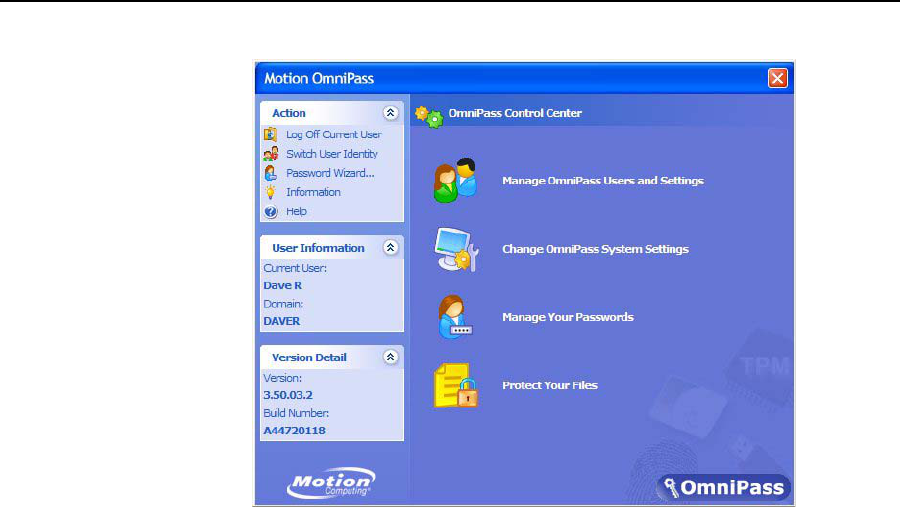
42 Motion Computing LE1600 and LS800 Tablet PC User Guide
At this point you can choose from the following options:
• Manage OmniPass Users and Settings to add users
• Change OmniPass System Settings
• Manage Your Passwords
• Protect Your Files
Also, notice that there are three selection areas, an action panel and two
information panels, at the left side of the window. These areas allow actions
or show specific information.
• Action panel
• Log Off Current User
• Switch User Identity
• Password
• Information
• Help
• User Information panel
• Shows current user information
• Version Detail panel
• Shows version and build Information
Manage OmniPass Users and Settings. When you select this action you
are presented with the following options:
• Add a new user to OmniPass
• Remove a user from OmniPass
• Import a new user into OmniPass
• Export an OmniPass profile
These are advanced operations and may not be part of your typical work
flow. If you need more information about this aspect of the Motion OmniPass
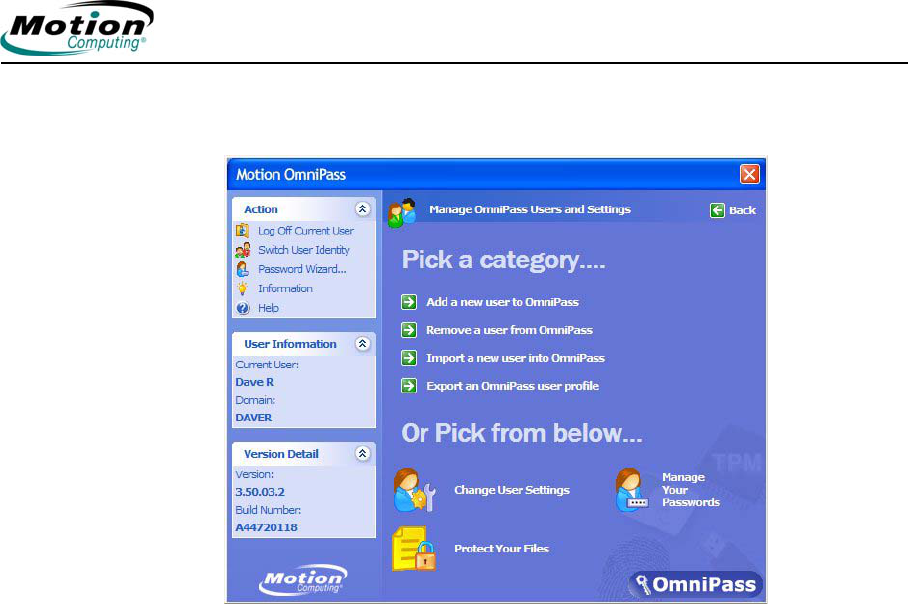
Motion Computing LE1600 and LS800 Tablet PC User Guide 43
application, refer to the OmniPass Help by tapping Help in the Action
panel.
Other OmniPass Set Up Functions. You can also tap the Change User
Settings icon; the Change User Settings window is opened where you can
select from the following operations:
• Audio Settings
• Use radio buttons to set the desired audio setting
• Taskbar Tips
• Use radio buttons to set the desired taskbar tip level
• Encrypt/Decrypt
• Select digital certificate or select an algorithm for encryption
• Enrollment
• Use the enrollment wizard to create a user account or to enroll new
authentication devices (e.g., fingerprint reader, digital certificates)
• Manage Your Passwords
• Opens the User Name/Domain dialog where you enter the password
and domain information to authenticate the user for access to the
password vault. There you can change your password.
• Protect Your Files
• Browse to select files to be encrypted
• Browse to select encrypted files to decrypt

44 Motion Computing LE1600 and LS800 Tablet PC User Guide
Fingerprint Reader. The built-in fingerprint
reader lets you scan your fingerprint and
associate it with a password. This offers a quick
and convenient way to log on to your Tablet PC,
provides global password management, and
helps protect your Tablet PC data from
unauthorized access. The illustration at the right
shows the bi-directional scan of a fingerprint. You
can move your selected finger from left-to-right or
right-to-left. Refer to “Helpful Hints: Successful
Fingerprint Captures” on page 45 for more information about obtaining a
successful fingerprint capture.
The fingerprint reader also functions as a scrolling device; you can move
your finger vertically (vertical in relation to the orientation of the Tablet PC)
across the scanner to scroll the Tablet PC application within the window.
NOTE: The scroll function is disabled while scanning a
fingerprint.
Using Motion OmniPass Security and the Fingerprint Reader. The
fingerprint reader built into your Motion Tablet PC lets you scan your
fingerprint to log onto your Tablet PC and perform other functions such as
accessing email, e-banking, paying bills online, or accessing network
resources.
The OmniPass software offers a secure and convenient system for
managing your passwords and providing confidentiality for your sensitive
data through file encryption.
The procedures for setting up the fingerprint reader are divided into basic
and advanced options. For a more successful experience, start with the
basic set up before setting the more advanced features.
Basic setup includes:
• Enrolling (your username and password)
• Selecting a finger
• Capturing a fingerprint
• Capturing a second fingerprint
Advanced OmniPass setup features include:
• User management
• User settings
• System settings
• You can modify the OmniPass startup options
• You can enable Strong Logon Security to authenticate with a specific
security device before showing the windows desktop
• Vault management
• The vault is a storage area for passwords and dialogs that you have
associated with web sites and applications.

Motion Computing LE1600 and LS800 Tablet PC User Guide 45
• Encrypting and decrypting files
• You can encrypt any file on your Tablet PC except for system files.
• Only an authenticated user can decrypt files that have been
encrypted.
Descriptions of these features may be found in the OmniPass Help section
(open Motion Dashboard then Motion Security Center > Motion
OmniPass and tap the Help icon in that window).
Helpful Hints: Successful Fingerprint Captures
• Be consistent. Hold your finger and scan at the same angle each time.
For example, if you enroll your finger with your hand open (or closed),
hold your hand this way each time you scan. If you enroll your thumb
while holding the edge of the Tablet PC while scanning, you need to
scan like this each time.
• The scanner is bi-directional; you can move your finger from right-to-left
or left-to-right.
• Read the prompts carefully and make sure you are waiting to be
prompted before each swipe.
• Swiping too fast or too slow can make a capture unsuccessful. Change
the swipe speed until you learn what speed works best.
• When scanning, press hard enough to fully contact both the nickel-col-
ored ring and the sensor; you do not have to press hard.
• Rub your fingers together to stimulate the natural skin oils so your fin-
gerprint is easier for the sensor to detect. Conversely, wipe your finger
off so nothing interferes with the scan.
• If you are repeatedly having trouble getting a good scan, you may need
to clean the sensor. First, power down the Tablet PC and remove the
battery. Then, clean the sensor using a cotton swab sprayed with a
window-type cleaner (no bleach, solvents, or abrasives); then dry the
sensor. Do not spray, pour, or otherwise dispense any liquid directly on
the sensor.
• If you are having trouble enrolling a specific finger, enroll a different fin-
ger. Typically, you will get the best results by scanning an index finger,
thumb, middle finger, ring finger, and little finger in that order.
Capturing a Fingerprint
1. Tap Motion Dashboard then Motion Security Center > Motion
OmniPass > Manage OmniPass Users and Settings > Add a new
user to OmniPass. This step enrolls a new user; you decide on the
authentication method (e.g., fingerprint, digital certificate, TPM, etc.).
2. Type in the User Name, Domain, and the Password (if you have one
set up) for this OmniPass account. (This may default to the user
name you logged on with and the password associated with it.)
3. Tap Next to take you to Selecting a Finger and Practicing Finger-
print Capture.
4. When the Choose Finger window appears, tap the dotted area
above the finger you want to enroll. A red arrow appears above the
selected finger.
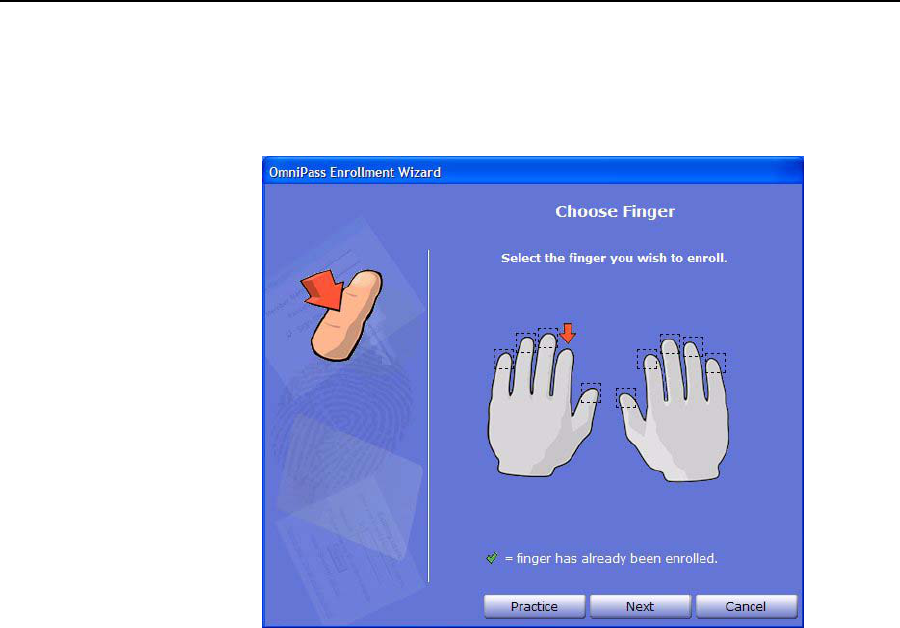
46 Motion Computing LE1600 and LS800 Tablet PC User Guide
IMPORTANT: To get a feel for finger position and swipe
speed, tap Practice. “Practice” takes you through all the
enrollment steps and helps you get a successful fingerprint
scan. You are asked to scan the same finger three times.
5. After you have practiced, you will be asked to scan one more time for
verification. After the verification is successful, tap Next to scan your
finger again, this time for real (not practice).
6. Place the selected finger over the nickel-colored ring and slowly, with
moderate pressure, drag your finger across the sensor from right-to-
left or left-to-right. Make sure your entire fingerprint (i.e., your finger-
tip, not your whole finger) touches both the nickel-colored ring and
the sensor surface.
Successful fingerprint capture: If the capture is successful,
you will see a green fingerprint image in the capture area. If
the capture is unsuccessful, an information message
appears, such as “Scan too slow/too fast...” and the green
fingerprint will not appear. Swipe your finger across the
sensor again as many times as required for a successful scan.
7. After the first scan is successful (and a green fingerprint image
appears), OmniPass prompts you to scan your fingerprint additional
times. Wait until the green fingerprint disappears from the display
and the fingerprint image area is blank before swiping your finger
again. After OmniPass successfully captures the same fingerprint
three times, the Verify Fingerprint window appears. Swipe your fin-
ger one more time to complete the enrollment.
When the messages “The selected finger has been enrolled in
OmniPass” and “Verification Successful!” and a green fingerprint
image appear, enrollment is successful and complete.
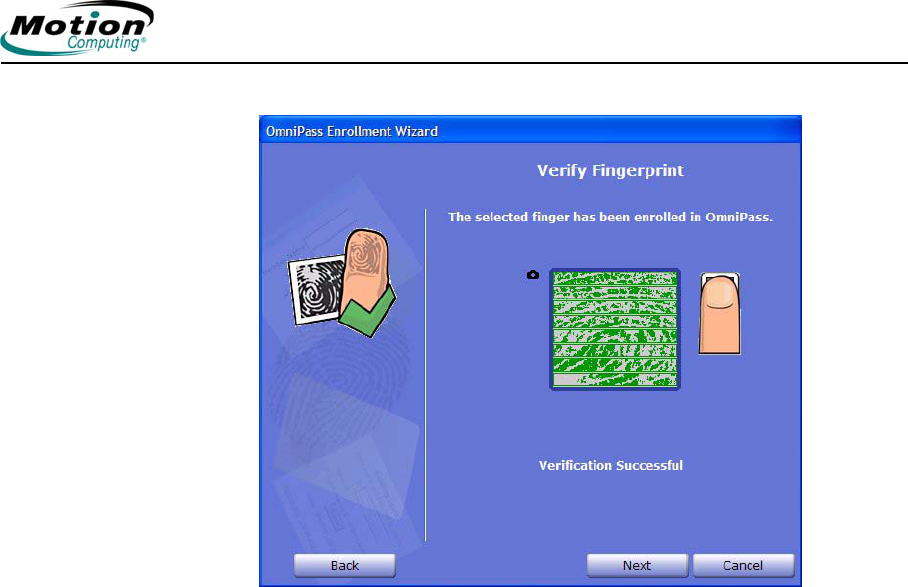
Motion Computing LE1600 and LS800 Tablet PC User Guide 47
IMPORTANT: During the verification process, you may get
red fingerprint images or the message “Verification Failed.” If
this happens, tap the Back button and try again. You can have
as many tries as you need for enrollment and verification.
8. Tap Next. When you are asked if you would like to enroll a second
fingerprint, tap Yes.
IMPORTANT: We recommend that you enroll a second
fingerprint. A finger injury could prevent authentication and
block access to your accounts.
9. Repeat Steps 6-8 to enroll a second fingerprint.
10. Tap Next. The Audio and Taskbar Settings window appears. You can
leave the defaults or change the settings, as desired.
11. Tap Next. The Congratulations window appears. OmniPass recom-
mends that you “Export” (backup or make a copy of) your user pro-
file so you can restore a lost or corrupted OmniPass configuration or
encryption keys. See the section “Exporting Your User Profile” on
page 50 for more information.
NOTE: You can export your profile at any time, but this may
not be the best time since you are a new user and your profile
has little information associated with it. You should backup
your profile later and on a routine basis to protect your
configuration and any stored passwords and encryption keys.
12. Tap Done.
13. Tap Yes to log yourself on as a new user.

48 Motion Computing LE1600 and LS800 Tablet PC User Guide
Capturing a Second Fingerprint Later
Capturing a second fingerprint is a good practice to follow. While it is easier
to do this at the time of the initial enrollment, it is possible to capture a sec-
ond fingerprint later. To do so, open the Motion Dashboard, then tap the
following: Motion Security Center > Motion OmniPass > Manage
OmniPass Users and Settings > Change User Settings > Enroll
Authentication Devices (e.g. enroll a new finger). Then follow the
procedure to enroll.
Configuring Advanced OmniPass Features
OmniPass offers a number of advanced features that provide additional
password management for your Tablet PC beyond the basic convenience of
logging on.
CAUTION: Before configuring advanced features, please
read the Motion OmniPass Help, including any cautions or
warnings about features. Activating some features
(specifically Strong Logon Security) may, as a normal part of
the OmniPass operation, change the way your Tablet PC
starts up and/or the start-up options that are available. Before
using advanced features, back up your user profile using the
feature provided.
To access these advanced features, tap the OmniPass icon in the system
tray and open the OmniPass Control Center, or open the Motion
Dashboard then Motion Security Center > Motion OmniPass. The
following is an overview of these features. For further information, refer to
the OmniPass Help.
•Motion OmniPass > Manage OmniPass Users and Settings
• Add/remove users
• Import a new user
• Export OmniPass user profiles; user profiles are stored as .opi
(OmniPass Import/Export) files
IMPORTANT: To restore a lost or corrupted OmniPass
configuration and encryption keys, back up and store a copy
of your user profile(s) in a safe place.
• Motion OmniPass > Change User Settings
• Change user audio settings
• Change taskbar tips
• Modify file encryption settings
• Enroll authentication devices
• Set authentication rules and policies
NOTE: For instructions for setting up passwords, refer to
“Replacing Password Logons” on page 49.
• Change System Settings

Motion Computing LE1600 and LS800 Tablet PC User Guide 49
• Startup options for Windows
• Strong Logon Security
• Vault Management — Password management for websites,
applications, or any password-protected resource
• Encrypt/Decrypt — Settings for authenticating encrypted/decrypted
files
Checking Logon Status. Move your pen over the OmniPass key icon in
the system tray to check. A pop-up window shows who is logged on.
Open the Motion Dashboard, tap Motion Security Center > Motion
OmniPass or tap the OmniPass key icon and open the OmniPass Control
Center and look at the Current User/Domain information in the second
panel on the left. See the OmniPass Control Center illustration for an
example of this window.
Replacing Password Logons. OmniPass lets you replace the password
logons at websites or anywhere you are prompted to provide your
credentials, such as Internet email, ftp logons, client logons, or any
restricted-access network resource. Once OmniPass registers your logon
credentials, you can conveniently access any of these restricted areas with
your fingerprint. You can also access these sites with your password.
Perform the following steps.
1. Go to a site that requires a log on (username and password), but do
not log on yet.
2. At the site logon prompt, enter your username and password in the
fields provided, but do not tap Enter, Submit, OK, or Logon or any
other method that accesses the site.
3. Right-click the yellow OmniPass key icon that appears in the system
tray at the bottom of the screen.
4. Tap Remember Password. The Windows arrow cursor will change
to the OmniPass “golden key” cursor.
5. Drag this OmniPass cursor to the area on the site where you would
normally enter your username and password to log on, but do not
tap “Logon” or “Submit” yet. (You will complete the logon in Step 9.)
6. If a “Friendly Name” window appears, enter a name that reminds
you of the website. OmniPass associates this name with this web-
site.
NOTE: Verify that the Settings for this Password Site are set
the way you want the site authenticated:
• Automatically enter ... — Instantly accesses the site
without requiring a password or fingerprint scan. If you
are logged in to OmniPass and you access a secure
website, OmniPass will automatically submit your user
name and password without prompting for verification.
If you leave your system unattended and unlocked, this
website can be viewed by anyone who has access to
your Tablet PC.

50 Motion Computing LE1600 and LS800 Tablet PC User Guide
• (Default) Automatically click ... — Prompts you for
your OmniPass/Windows password or fingerprint scan
when you access the site.
7. If needed, swipe your fingerprint or enter your master password to
authenticate these settings.
8. Tap OK, Submit, Sign In, or Logon to access the site.
9. Tap Finish to complete the “Remember Password” procedure. The
site location, the credentials to access the site, and the OmniPass
authentication settings for the site are now stored in the OmniPass
secure database.
Logging Onto a Remembered Site
1. Open a website where you have set up the OmniPass logon (that is,
a “Remembered Site”).
2. Swipe your finger when you are prompted for a fingerprint/master
password authentication.
NOTE: You can remove a remembered site through the
OmniPass Control Center > Vault Management >
Manage Passwords option.
Exporting Your User Profile. The OmniPass Help application contains
information about exporting your user profile. Go to Motion Dashboard
then Motion Security Center > Motion OmniPass, and tap Help in the
Action panel.
Configuring Strong Logon Security
Strong logon security can be configured to require authentication before
showing the Windows desktop. Be aware that enabling strong logon security
will force you to authenticate with a specific security device (e.g., the
fingerprint reader, a Smart Card) before allowing access to the Windows
desktop. Once enabled, the Windows XP Welcome screen and Windows
fast switching will not be available on this Tablet PC.
1. To enable Strong Logon Security, open the Motion Dashboard, tap
Motion Security Center then Motion OmniPass to open the
OmniPass Control Center.
2. Tap Change OmniPass System Settings
3. Tap Enable strong logon security. The Enable strong logon
security window is shown.
4. Tap the checkbox: Enable strong logon security.
5. Tap the checkbox: Save all changes. A dialog box tells you that you
have made changes that require you to restart your computer.
6. Tap OK and restart your computer. During logon you will be required
to use the specified authentication device.
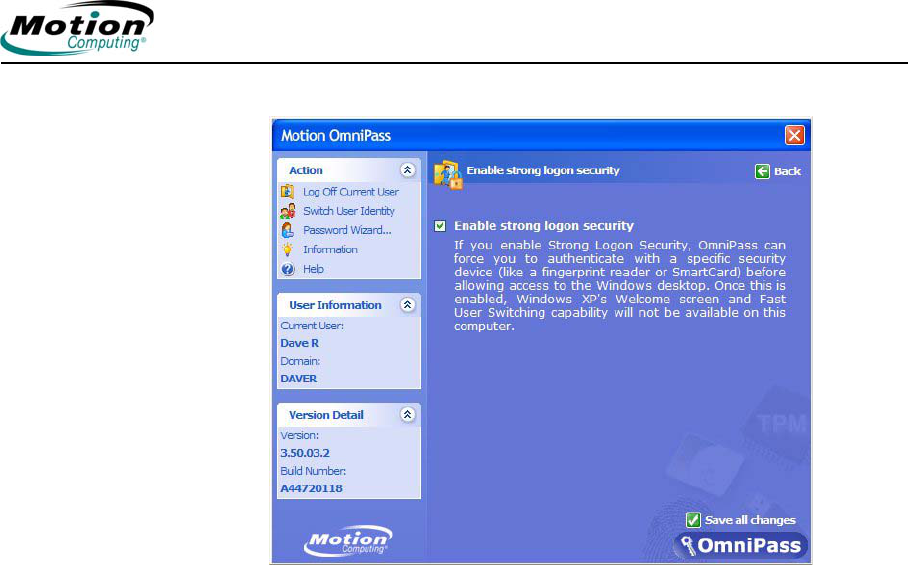
Motion Computing LE1600 and LS800 Tablet PC User Guide 51
Infineon Trusted Platform Module
The Infineon Trusted Security Platform Solution is a comprehensive set of
tools provided with your Tablet PC. Together, these tools and the Trusted
Platform Module (TPM) result in the one of the most secure computing
environments now available on a Tablet PC. With this application it is now
possible to create and manage digital certificates for user and platform
authentication. The Infineon TPM is not automatically enabled at startup
and requires system administrator action to enable the feature.
More Information About the Infineon Security Solution. Ask your
system administrator for more information or learn more about the Infineon
Security Solution by opening the Motion Dashboard then Motion Security
Center > Infineon TPM > Getting Started Guide.
Windows Security System Components Overview
Among the new security features, the Microsoft Windows Security Center
automatically sets up a Windows Firewall on your Tablet PC to block
unwanted access to your system over the internet and from other networks.
The Security Center system provides security alerts during startup and
messages while running Internet Explorer. These messages are a normal
part of the operating system. Microsoft provides information with these
alerts to help you decide what action to take.
In addition, you can set up the firewall to block all outside sources from
connecting to your system (recommended) or can make exceptions to allow
communications with a certain program. Within these settings, you can
change the scope to specify a set of computers for which this port or
program is unblocked.

52 Motion Computing LE1600 and LS800 Tablet PC User Guide
• Microsoft Security Center — Lets you check security
settings and learn more about improving security. Access
is via open Motion Dashboard > Motion Security
Center.
• Windows Firewall — On by default; helps protect your
Tablet PC against viruses and other security threats, such
as intruders who might try access over the Internet or a
network. Tap the Windows Firewall icon on the Control
Panel (Classic view) or the Security Center > Windows
Firewall icon (Category view). From here, you can add exceptions to
bypass selected programs and services. If a program or service
needs to open the firewall to perform, it notifies you and lets you
decide whether to open the firewall and allow access.
• Automatic Updates — Checks for the latest important updates and
installs them automatically. Configure from the Microsoft Security
Center.
• Internet Explorer — Provides security settings to warn you about
viruses and other security threats that can spread over the Internet
or other types of networks; blocks certain website features and gives
you a warning, so you can decide whether it is safe to proceed.
Access from Internet Explorer Tools > Internet Options > Security.
You can always bypass the settings for sites of your choice by
changing the options for that site.
Pop-up blocker in Internet Explorer. Stops most browser windows from
popping up without your permission, giving you more control over your Web
browsing experience. Access from Internet Explorer Tools > Internet
Options > Security. You can always bypass the settings for sites of your
choice by changing the options for that site.
Microsoft Security Center. The Windows XP Tablet PC Edition 2005
Operating System provides new security features that help defend against
viruses, worms, and hackers. To learn more about these features, go to
Motion Dashboard then Motion Security Center > Microsoft Security
Center or tap the Windows Security Alerts icon in the system tray (this
icon only remains active for a short time on your desktop).
Using Windows Security. Passwords protect your Tablet PC from
unauthorized access. Passwords can create different levels of protection for
your Tablet PC and its data.
• Operating system passwords — Secure the files on your Tablet PC from
other users
• BIOS (Basic Input/Output System) passwords — Secure the software
routines that test hardware at startup, start the operating system, and
support the transfer of data among hardware devices
• System password — Locks access to the BIOS set up
• Boot password — Locks access to the system
• Hard Disk Drive (HDD) password — Secures your data so the HDD
cannot be accessed by removing it and connecting it to another
Tablet PC
Setting the Windows Operating System Password. Be aware that the
following advanced procedures require you to make changes in Windows
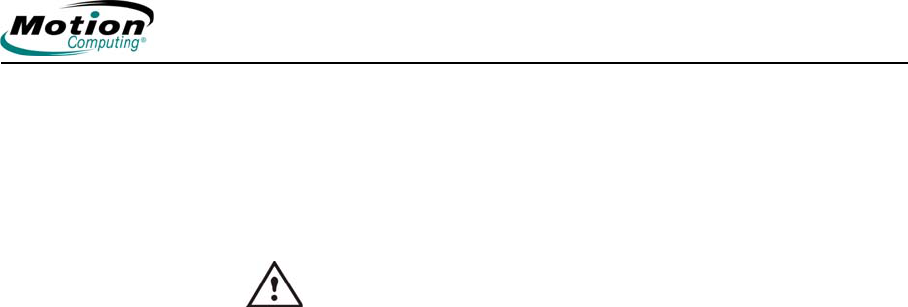
Motion Computing LE1600 and LS800 Tablet PC User Guide 53
BIOS. You should not perform this procedure unless you are comfortable
with the following cautionary information. You can set up a Windows
operating system password going to Start > Control Panel > User
Accounts > Create a new account... (Classic View)
Setting BIOS Passwords.
CAUTION: We strongly recommend that you read the
information in this section carefully to understand the
implications of setting up a BIOS system password. If
you set up a BIOS System password and enter it incorrectly
several times, you will be locked out of the system. If you
become locked out, you can restart the Tablet PC and retry
the password again. You can restart the Tablet PC and re-
enter the password as many times as you need to. However,
if you are unsuccessful in entering the password, you will not
be able to access your Tablet PC.
If this happens, contact Motion Computing Technical Support
at www.motioncomputing.com/support for assistance. Have
your Tablet PC serial number available (on the label on the
back of the system).
The level of security you want on your Tablet PC helps determine what
BIOS password(s) you set.
Setting a BIOS System Password. Perform these steps to set up a
password to access the PhoenixBIOSTM Set Up Utility on the Tablet PC:
NOTE: These procedures describe using the pen to enter
information; you can also attach an external keyboard if you
prefer.
1. Start the Tablet PC.
2. When the Motion Computing splash screen appears, quickly press
the Rotate button. If you miss the splash screen, turn the Tablet PC
off then back on and try this step again.
3. From the PhoenixBIOS Set Up Utility, tap Security on the menu bar.
4. To set up a System password, double-tap Enter next to Set
System Password.
5. Type in a System Password using the on-screen keyboard.
6. Tap Enter.
7. Type in the password again to confirm it.
8. Tap Enter. The system returns to the Security screen and the Sys-
tem Password reads Set. A password is now required to enter the
PhoenixBIOS Set Up Utility.

54 Motion Computing LE1600 and LS800 Tablet PC User Guide
9. To set up a Password on boot, tap Disabled next to
Password on boot until Enabled is highlighted. You will not be
prompted to type in another password because Password on boot
uses the System password.
NOTE: You cannot set up Password on boot until you set up
a System password.
10.If you have finished setting up a password, tap Exit or press the Esc
key on the Tablet PC to exit the PhoenixBIOS Set Up Utility.
11. When you exit, you are asked to select from the following options:
• Exit Saving Changes
• Exit Discarding Changes
• Load Set Up Defaults
• Discard Changes
• Save Changes
12. Select the desired action.
13. Confirm the selection by tapping Yes.
Hard Disk Drive (HDD) Password. To set up a password to start the Tablet
PC (so no one can access the information on the HDD of your Tablet PC
even if it is removed and installed in another Tablet PC without the proxy
password):
1. Start the Tablet PC.
2. When the Motion Computing splash screen appears, quickly press
the Rotate button. If you miss the splash screen, turn the Tablet PC
off then back on and try this step again.
3. From the PhoenixBIOS Set Up Utility, tap Security on the menu bar.
4. To set the HDD password, double-tap Enter next to Set Hard Disk
Password.
5. Type in a New Password.
6. Tap Enter.
7. Type in the password to confirm it.
8. Tap Enter. The system returns to the Security screen and the HDD
Password is Set. (When you exit then re-enter the PhoenixBIOS
setup, the HDD Password is Locked.)
9. If you have finished setting up a password, tap Exit or press the Esc
key on the Tablet PC to exit the PhoenixBIOS Set Up Utility.
10. When you exit, you are prompted to select from the
following options:
• Exit Saving Changes
• Exit Discarding Changes
• Load Set Up Defaults
• Discard Changes
• Save Changes
11. Select the desired action.

Motion Computing LE1600 and LS800 Tablet PC User Guide 55
12. Confirm the selection by tapping Yes.
Clearing Tablet PC Security. To clear the Tablet PC PhoenixBIOS
security:
1. Start the Tablet PC.
2. When the Motion Computing splash screen appears, quickly press
the Rotate button. If you miss the splash screen, turn the Tablet PC
off then back on and try this step again.
3. From the PhoenixBIOS Set Up Utility, tap Security on the menu bar.
If you have rebooted, you will be prompted to enter the password(s)
you have set up.
4. To clear the System and Password on boot passwords, double-tap
Enter next to Set System Password.
5. Type in the Current Password.
6. Leave the space blank next to Enter New Password.
7. Tap Enter.
8. Leave the space blank to Confirm New Password.
9. Tap Enter.
10. When the Security screen appears, the System Password should be
Clear and the Password on boot Disabled.
11. To clear the HDD password, double-tap Enter next to Set Hard Disk
Password.
12. Type in the Current Password.
13. Leave the space blank next to Enter New Password.
14. Tap Enter.
15. Leave the space blank to Confirm New Password.
16. Tap Enter.
17. When the Security screen appears, the HDD Password should
now display Clear.
SPEECH Introduction to Speech
The speech recognition capability in the Tablet PC provides two distinct
operations; there is a Voice Command mode and a Dictation mode. These
selections are visible as buttons in the Tablet PC Input Panel (TIP). The
following steps lead to success in setting up the speech feature.
• View the tutorial on speech recognition
• Set acceptance angle and the skew using the Motion Dashboard
• Adjust microphone volume
• Go through training
Dictation mode requires additional training and results in converting your
spoken words into “typewritten” text. The Voice Command and Dictation
modes are described in this section.
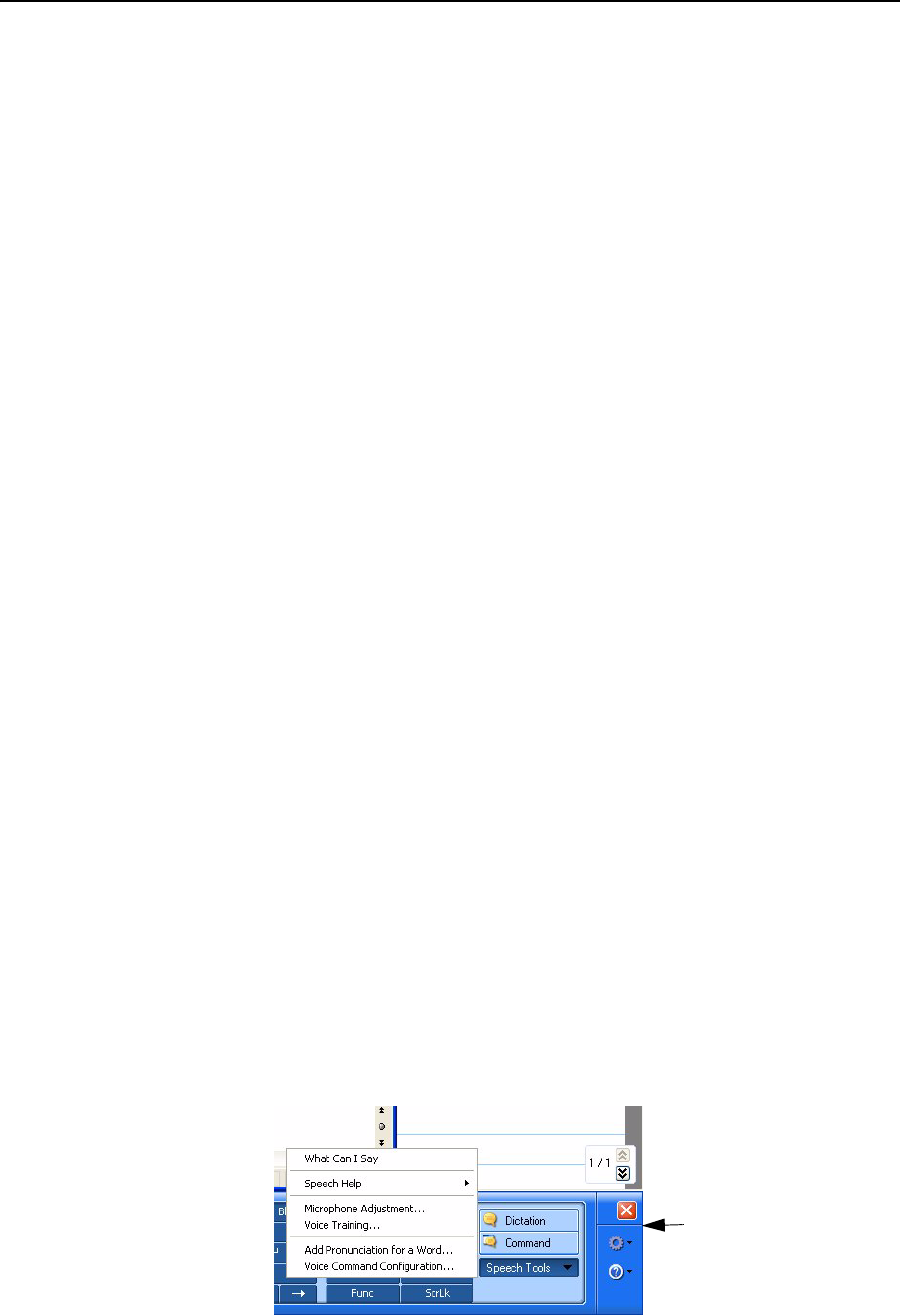
56 Motion Computing LE1600 and LS800 Tablet PC User Guide
Motion Speak Anywhere Technology
The Motion Speak AnywhereTM audio system combines the Knowles®
Acoustics IntelliSonicTM software application with integrated microphones to
let you record audio, dictate notes, and use voice commands without the
need for a microphone headset. These capabilities make the Motion Tablet
PC with Speak Anywhere technology a valuable tool for mobile users in a
variety of work settings, including small or large groups, or for individual
dictation or voice commands.
• Integrated microphones, two of the three are used at one time — The
integrated microphones help optimize the sound capturing capabilities of
the Tablet PC for speech recognition and voice recording. The locations
of the microphones have been carefully designed to let the system
detect sound input from a specific angle, rejecting sounds from outside
that angle. There are three microphones; the software determines which
two of the three provide the best results.
• Knowles Acoustics IntelliSonic software — This software lets you direct
sounds coming from a specific direction to the microphones, while can-
celing interfering noise from other directions, thus minimizing the effects
of environmental noise and eliminating acoustic echo feedback. It is
based on the following audio technologies:
• Array Processing or “beam forming” software — Removes all sound
outside a software-defined “angle of acceptance”
• Noise Suppression — Removes background and ambient noise
• Acoustic Echo Cancellation (AEC) — Removes echo caused by the
microphone picking up the system’s speaker output, thus preventing
feedback
Speech Recognition
Speech recognition lets you convert spoken words into typed text or into
voice commands, you can use speech to correct errors, format text, or
control programs. This is sometimes quicker than typing or writing text.
Before you can use speech recognition, you must first train the system for
your voice, pronunciation, speaking pace, and inflection. These adjustments
are made through the Speech utility on the TIP window. Speech recognition,
including dictation and voice commands is available through the TIP
window. Tap the Tools and Options icon in the TIP. If this is the first time
you have activated Speech, you will be asked to complete the Voice Training
application. The more training you do, the better the speech recognition.
Tap here to activate
speech recognition

Motion Computing LE1600 and LS800 Tablet PC User Guide 57
• Dictation mode — Selected by tapping Dictation. Changes everything
you say to text; use to enter text directly into any document or text box
when you do not want to use the pen or keyboard
• Voice command mode — Selected by tapping Command. Listens for
specific words that correspond to an existing list of available voice com-
mands; use to quickly switch between programs, for saving documents,
etc.
NOTE: To turn off speech, tap the button for Dictation or
Command (whichever you are using).
For additional information about setting up speech recognition, you can tap
Help (the Question mark in the circle) on the TIP window and search for
“speech.”
Using Motion Dashboard Directional Controls. The Microphone settings
in the Motion Dashboard include three radio buttons that define the
directional angle that is to be used for speech recording. The selected
setting determines the angle of acceptance. The following information is
intended to help you understand the differences between the narrow,
medium, and wide angles. However, the best reference will be your actual
experience in using the technology. There are three microphones, but only
two are used at one time. If you are in landscape mode, the microphones
along the bottom edge (as viewed in primary landscape mode) of the Tablet
PC are used. If you are in portrait mode, the two microphones along the
right side are used.
•Angle of acceptance. Three pre-defined “angles of acceptance” are
part of the Motion Speak Anywhere audio technology:
• Narrow Angle — Best setting for dictation, Voice over IP, “voice
noisy” environments; the microphones detect sound on a narrow
angle near the bottom center (landscape orientation) or top center
(portrait orientation) of the display. If you do not speak within the
angle of acceptance, e.g., if you turn your head while dictating or
change the angle of the Tablet PC, the sound will not be recorded.
• Medium Angle (default) — Best setting for a small group, conference
table, “voice quiet” environment; microphones detect at a wider
angle
• Wide Angle — Widest angle of acceptance. Try starting with this
setting (even for dictation) before using a more restricted angle.
Change to the Narrow or Medium Angle to eliminate more
background noise.
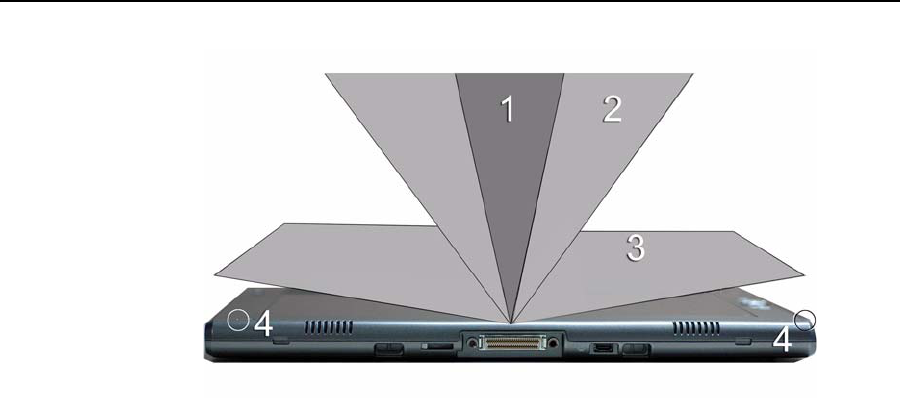
58 Motion Computing LE1600 and LS800 Tablet PC User Guide
1 Narrow Angle; 2 Medium Angle; 3 Wide Angle; 4 Microphones (only two of
the three microphones are shown in this illustration of the LE1600 Tablet
PC).
• Skew angle. The pre-set sound detection area is straight in front of
the system display. If you want the system to receive sound from
elsewhere, you can skew the receiving direction towards one or the
other microphone (keeping the same relative angle of acceptance.
Setting up the skew angle for calibration:
1. Open the Motion Dashboard.
2. Under Microphone, tap Narrow Angle or Medium Angle. (You can-
not calibrate wide angle.)
3. Move to where you want the microphone to detect your voice.
4. Tap Calibrate. A block of text appears.
5. Read the text aloud, speaking normally towards the Tablet PC micro-
phones. This should take 20-40 seconds.
NOTE: In many cases, you will not need to calibrate the
microphone because the audio system filters out many
unwanted sounds. If you are dictating in an office or recording
during a meeting, the audio system may work well with no
additional calibration.
IMPORTANT: The audio system does not store calibrations. If
you change to another angle/position and then return to the
previous one, you must re-calibrate the audio system.
Enabling Speech Recognition Enrollment. It is necessary to train the
system to your voice before you can use the Speech Dictation and Voice
Command capabilities of the Tablet PC. The procedure is used to adjust the
microphones and train the Tablet PC for the characteristics of your voice.
The entire process takes about 10 minutes. It is advisable to move to a quiet
environment before starting this procedure.

Motion Computing LE1600 and LS800 Tablet PC User Guide 59
1. Open the Motion Dashboard and make sure the speakers and
microphone are turned on (the default settings).
2. Check that the speaker volume and microphone sound levels on the
Motion Dashboard are appropriate for your setting.
3. Tap the TIP icon on the menu bar at the bottom of the Tablet PC dis-
play. The TIP appears.
4. Tap the down-arrow beside Tools to open the Tools options.
5. Tap Speech. The first time you access this function, a Speech Rec-
ognition Enrollment message appears. You must adjust the micro-
phone and train speech recognition before continuing. Until you
complete speech training, the speech button is inactive. This takes
about 10 minutes.
6. Tap Next and follow the Microphone Wizard.
NOTE: To improve speech recognition, run additional speech
training sessions.
Using Speech Recognition: Setting Up Dictation or Voice Commands.
Once you activate speech recognition, depending on your work setting
(single-person office or small or large meeting) and what you plan to do
(dictate, use voice commands), you may want to change the Motion
Dashboard microphone angle from Medium (the default) to either Narrow
or Wide. You may then also want to calibrate the direction of the
microphones.
1. Open the Motion Dashboard and select the desired angle.
2. (Optional) To use either Medium or Narrow Angle to dictate from a
direction other than directly in front of the display, tap Calibrate and
read through the calibration script.
NOTE: Calibration will skew the angle at which the
microphones detect your voice while keeping the same
relative angle of acceptance.
3. To start the Speech recognizer, open the TIP window.
4. Select Dictation (to convert spoken words into typed text) or
Commands (to use your voice to enter commands, such as “Enter,”
“Save,” “Open”).
NOTE: For more information about using this feature and for
available voice commands, see the Windows Help and
Support Center where you can search for topics about speech
recognition and training. Also available are the speech
tutorials. To find the speech tutorials, select Start > Help; then
Support > Welcome to Tablet PC > Tablet PC Tutorials.
Helpful Hints: Dictating and Recording
• You may want to start recording or dictating from the Wide Angle
(Motion Dashboard setting) and change to a more-restricted angle
(Narrow or Medium) if too many outside sounds are recorded. The

60 Motion Computing LE1600 and LS800 Tablet PC User Guide
advantage to the Wide Angle is that no sounds will be lost if you change
your location. The disadvantage is that outside sounds may be picked
up that interfere with the recording.
• You MUST recalibrate the microphones if you change from one orienta-
tion (landscape) to another (portrait). This is because the skew angle
changes and the sound will no longer be in the angle of acceptance. If
necessary, refer to the earlier information on skew angle.
• Even with the Narrow Angle setting, if a sound is loud enough and within
the angle of acceptance (no matter how distant), the sound will be
picked up by the microphones. The advantage of the Tablet PC is that it
detects fewer extraneous sounds than other audio systems. You can fur-
ther limit the detection of these outside sounds by turning down the
microphone volume and speaking louder; this reduces the microphones’
range and restricts their ability to detect extraneous sounds.
• The Tablet PC contains pre-installed audio components. If you install a
third-party audio device (such as USB or Bluetooth devices), the Motion-
installed audio may not work. If this happens, you must reinstall the
Motion-audio components. (The Motion audio components are the Sig-
maTel and Knowles Acoustics audio drivers.) After you install these, if
you still have problems recording, contact Motion Technical Support or
the Bluetooth or USB manufacturer’s technical support.
• To improve speech recognition, run additional speech training sessions.
Open the Windows Control Panel and select Speech to perform addi-
tional speech training. As you do this, speech recognition accuracy will
gradually improve.
PORTS,
SLOTS AND
CONNECTORS
PC Cards
The PC Card slot (only on the LE1600 Tablet PC), also referred to as a
PCMCIA card slot, holds one Type-II PC Card for networking, memory
expansion, or accessory connection.
1. To install a PC Card, insert it label side up.
2. To remove a PC Card, push the button next to the slot until it
pops out.
3. Push it again to eject the PC Card.
NOTE: Your Tablet PC ships with a plastic blank card in the
PC Card slot. When the slot is not in use, we recommend that
you leave the plastic blank in place.
SD Cards
The SD Card slot holds one SD Card (SDIO compatible) for networking,
memory expansion, or accessory connection.
1. To install an SD Card, insert it in the slot, label side up.
2. To remove the SD Card, grip the edge of the card and carefully pull it
from the slot. Notice that the edge of the Tablet PC is curved slightly
in the area of the SD Card. This makes it easier to grip the edge of
the card for insertion and removal.

Motion Computing LE1600 and LS800 Tablet PC User Guide 61
Infrared (IrDA) Port
The IrDA port uses the infrared connection protocol to transfer data or digital
images from any IrDA enabled device to a specified file location on another
IrDA equipped device. Typically, the devices must be within three feet of
each other.
USB Ports
There are two high speed USB ports on the Tablet PC that can be used to
attach any USB device to the Tablet PC. Typically a USB device draws
power from the Tablet PC, therefore it is advisable to use AC power
whenever USB devices are attached. Running USB devices while operating
on battery power will adversely affect your rate of power consumption.
Speaker Port (LE1600 only)
The speaker port is on the left edge of the Tablet PC. It is marked with a
small headphones symbol and is designed as an audio output channel only.
You can attach external speakers or headphones to this port. When
headphones or external speakers are attached, the internal speakers are
disabled.
Microphone Port (LE1600 only)
The microphone port is on the left edge of the Tablet PC. It is marked with a
small microphone symbol and is designed as an audio input/line in channel
only. You can attach an external microphone directly to this port to enhance
your audio recording capabilities. When an external microphone is attached,
the built-in microphones are disabled.
Audio In/Audio Out Port (LS800 only))
There is a single Audio In/Audio Out port on the LS800 Tablet PC. That
port be used for either an audio in connection (such as line in or a
microphone) or an audio out connection (such as headphones or external
speakers). The LS800 Tablet PC will sense whether the connected device is
designed for input or output and setup wil occur automatically.
DVI-D Connector (LE1600 only)
The DVI-D (Digital Video Interface) Connector is on the left edge of the
Tablet PC and is identified by the DVI-D designation. This connector is
provided for the direct attachment of a digital video monitor. An optional
DVI-D cable is available from Motion Computing for this purpose. When an
external monitor is attached, the Motion Dashboard display settings can be
used to set the external display as a mirrored or extended display.
VGA Connector
The VGA Connector is on the left edge of the Tablet PC. It is intended for
use with standard analog video displays. An attachment cable is not
provided for this purpose; if you use the Tablet PC with a standard VGA-type
display, you will need to purchase a corresponding cable. When an external

62 Motion Computing LE1600 and LS800 Tablet PC User Guide
monitor is attached, the Motion Dashboard display settings can be used to
set the external display as a mirrored or extended display.
Docking Connector
The Docking Connector is at the bottom edge of the Tablet PC. It is
designed to integrate the LE1600 Tablet PC with the Motion FlexDock for
the LE Series, or the Motion MobileDock for the LS800 Series. When the
LE1600 or the LS800 is used with the FlexDock or the MobileDock, the port
connections on the Tablet PC are replicated on the connected device. For
more information about the new docking stations for the LE and LS Series,
contact your Motion sales representative or visit the Motion Computing
website at www.motioncomputing.com/accessories.
WIRELESS
NETWORKING
There are three technologies available in the Tablet PC for wireless
networking connections.
• Wi-Fi (802.11)
• Bluetooth
• Infrared
Wi-Fi (802.11) Wireless Connections
IMPORTANT: Since wireless set ups differ widely, the
information presented here is general and may not cover all
the steps required for your wireless configuration. For more
information about wireless networks, you may need to contact
your System Administrator. Or, go to Start > Help and
Support and search for wireless help from Microsoft.
Although wireless access is available in public areas, your ability to use the
wireless access point depends on the following conditions:
• Distance from the access point
• Ability to connect to the access point
• Service rights to it (which may require an account fee, user name, pass-
word, an/or network set up through an administrator)
• The access point is not broadcasting a network name (Check your secu-
rity settings, the SSID may not be broadcasting)
• The security settings may not be configured properly for wireless net-
working.
WARNING: FAA regulations require that you disable
any wireless connection when traveling by air. If the
Wireless LED on the front of the Tablet PC is off,
internal wireless communications are disabled.
Enabling/Setting Up a Wireless Connection Through the Motion
Dashboard.
1. Open the Motion Dashboard and make sure that Enable Internal
802.11 Wireless Radio is checked.
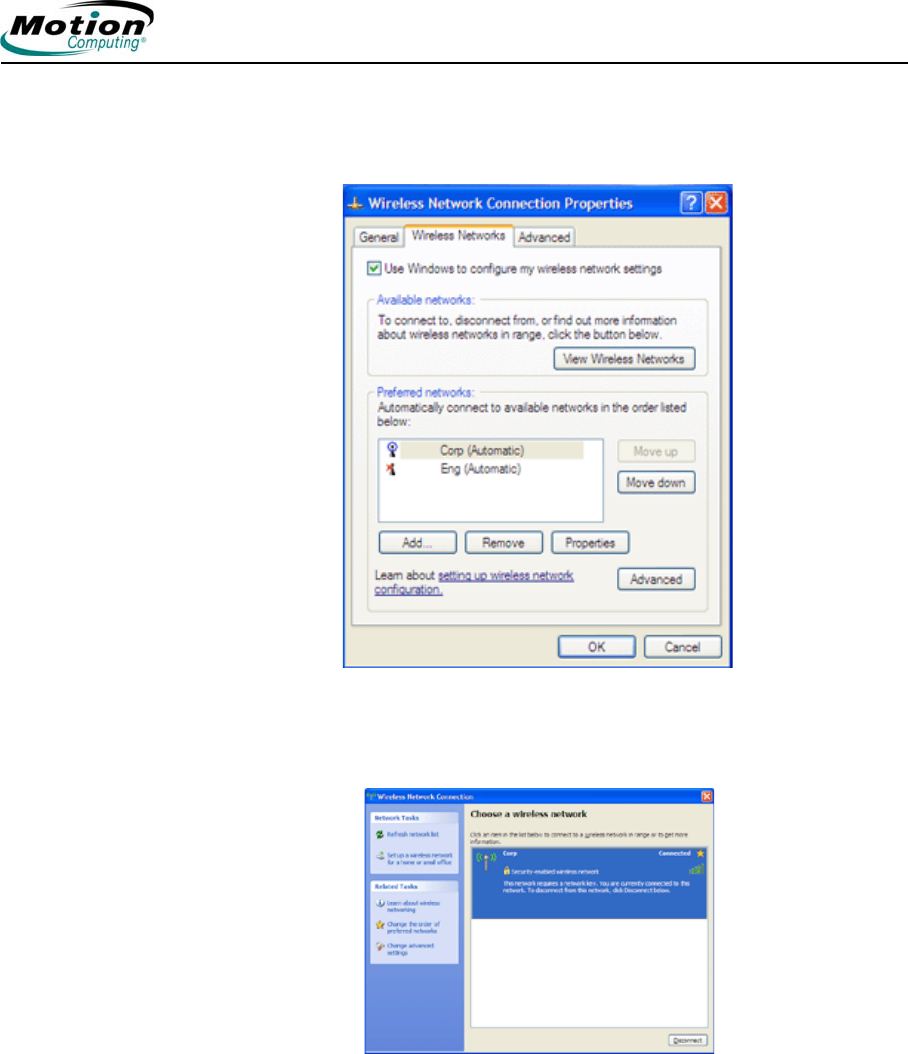
Motion Computing LE1600 and LS800 Tablet PC User Guide 63
2. Under Wireless on the Motion Dashboard, tap Properties.
3. In the Wireless Network Connection Properties window, tap the
Wireless Networks tab.
.
4. In the Wireless Networks window, tap View Wireless Networks to
see a list of available networks
5. Highlight the network you want to connect to and tap Connect.
6. Tap OK.
NOTE: If you are on a secure network, you may also need to
enter a network key.
Bluetooth Wireless Connections
The internal Bluetooth wireless radio in the Tablet PC is disabled by default.
This setting is found in the Motion Dashboard.
Bluetooth software comes pre-installed on your Tablet PC. To begin using
Bluetooth, open the Motion Dashboard, and check the box that enables
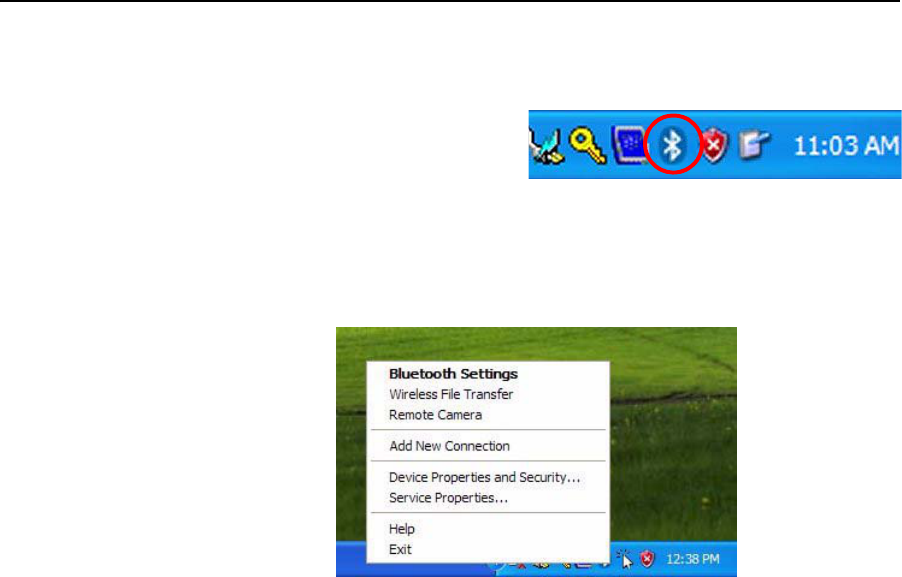
64 Motion Computing LE1600 and LS800 Tablet PC User Guide
your internal wireless Bluetooth radio. The Bluetooth software completes it’s
installation.
How To Access Bluetooth. When
you first enable Bluetooth on your
Tablet PC, you will see a Bluetooth
icon in the system tray. This icon
offers shortcuts to the Bluetooth Settings window, the Bluetooth File
Transfer Wizard, and the Add New Connection Wizard. Press and hold the
pen tip on the Bluetooth icon to open the Bluetooth Settings menu.
Bluetooth Device Connection Process. The following process is
generally common for connecting most Bluetooth devices (keyboard,
mouse, printer, cellular phone, PDA, Tablet PC, notebook PC, etc.). The
actual steps may be slightly different for every type and brand of Bluetooth
device. Read and follow the installation instructions included with your
specific device. These are the four generic steps for connecting to a
Bluetooth device.
1. Discover
2. Search
3. Pair
4. Connect
1. Make the device discoverable. Making a Bluetooth device discoverable
makes it visible to other Bluetooth devices. Each Bluetooth device uses a
different method (pressing a button or key combination) to make it
discoverable; this is generally described in the device’s documentation.
When you activate Bluetooth on your Tablet PC it is the signal for the Tablet
PC to look for, or discover, any Bluetooth devices within range.
2. Search for Bluetooth devices in range. This process will find every
Bluetooth device that is discoverable and available for connection within 33
feet (10 meters).
3. Pairing. Using a passkey creates a secure connection (pairing) between
the Tablet PC and Bluetooth device. This passkey helps prevent data from
being intercepted and interpreted by another device.
IMPORTANT: Though the passkey exchange helps to secure
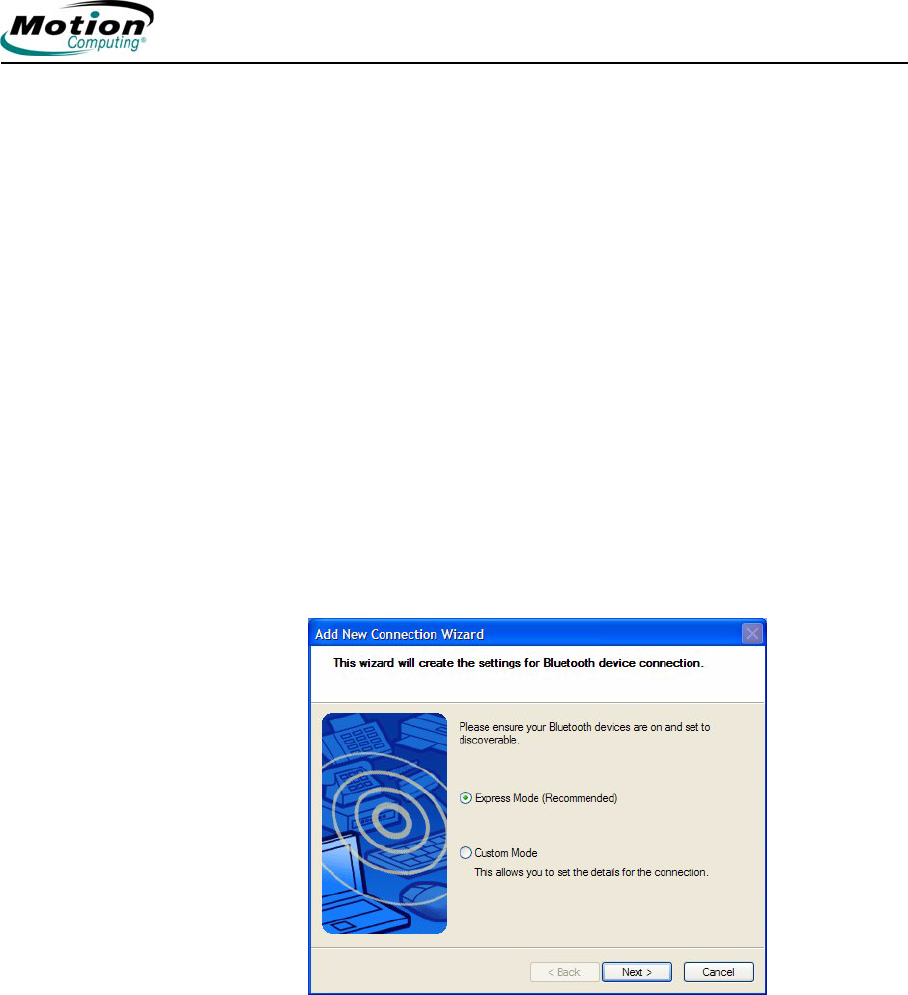
Motion Computing LE1600 and LS800 Tablet PC User Guide 65
your data, Bluetooth wireless technology should not be
considered completely secure.
4. Connect the devices. The first time a Bluetooth device is connected to
the Tablet PC the drivers are loaded for that device. After this initial
connection, some Bluetooth devices may disconnect when they go into
power-saving mode. Most will automatically reconnect when they become
active again.
Using the Bluetooth Application
1. Make sure that either the Bluetooth LED is flashing or that there is a
checkmark beside Enable Internal Bluetooth Wireless Radio
(both indicate that Bluetooth is running) in the Motion Dashboard
2. Using your pen, single tap the Bluetooth Devices icon in the
system tray.
3. Tap Add New Connection to launch the Bluetooth Add New Con-
nection Wizard.
The Bluetooth Settings window is shown, quickly followed by the Add
New Connection Wizard.
4. Place the Bluetooth device (mouse, keyboard, printer, etc.) in dis-
coverable mode.
NOTE: Each Bluetooth device may have a different way to
make it discoverable. Some have a small button on the back
of the mouse or keyboard; others may require that you press
a key sequence on the keyboard. Look at the documentation
that came with the Bluetooth device or visit the
manufacturer’s website for information.
5. After you make the Bluetooth device discoverable, tap Next. The
“Searching for Bluetooth devices” window is shown.
When the Bluetooth device is detected, it is shown in the Add New
Connection Wizard Select a device window. If multiple devices are
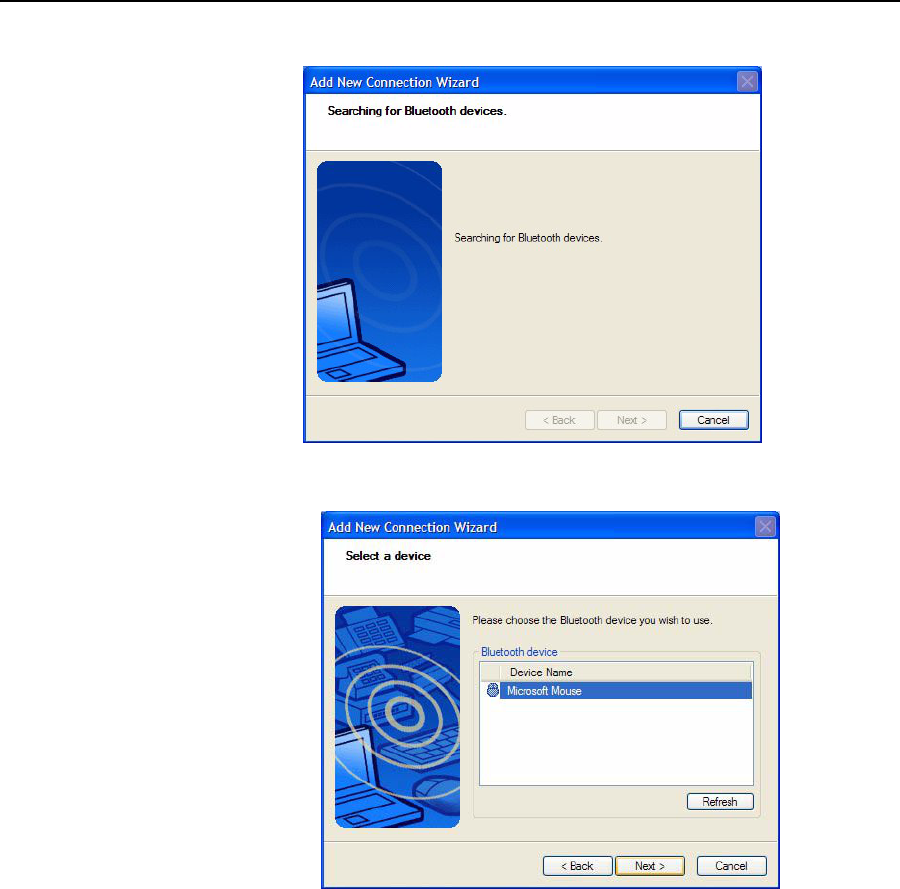
66 Motion Computing LE1600 and LS800 Tablet PC User Guide
detected, each is shown in the window. Select the device to be
connected.
6. Tap Next to add the Bluetooth device.The wizard searches for
remote device services. The Wizard will display a message that it is
connecting and then the passkey number if authentication is
required.
NOTE: If required, immediately enter the number shown in
the Passkey field and press Enter. Consult your device
documentation for more information.
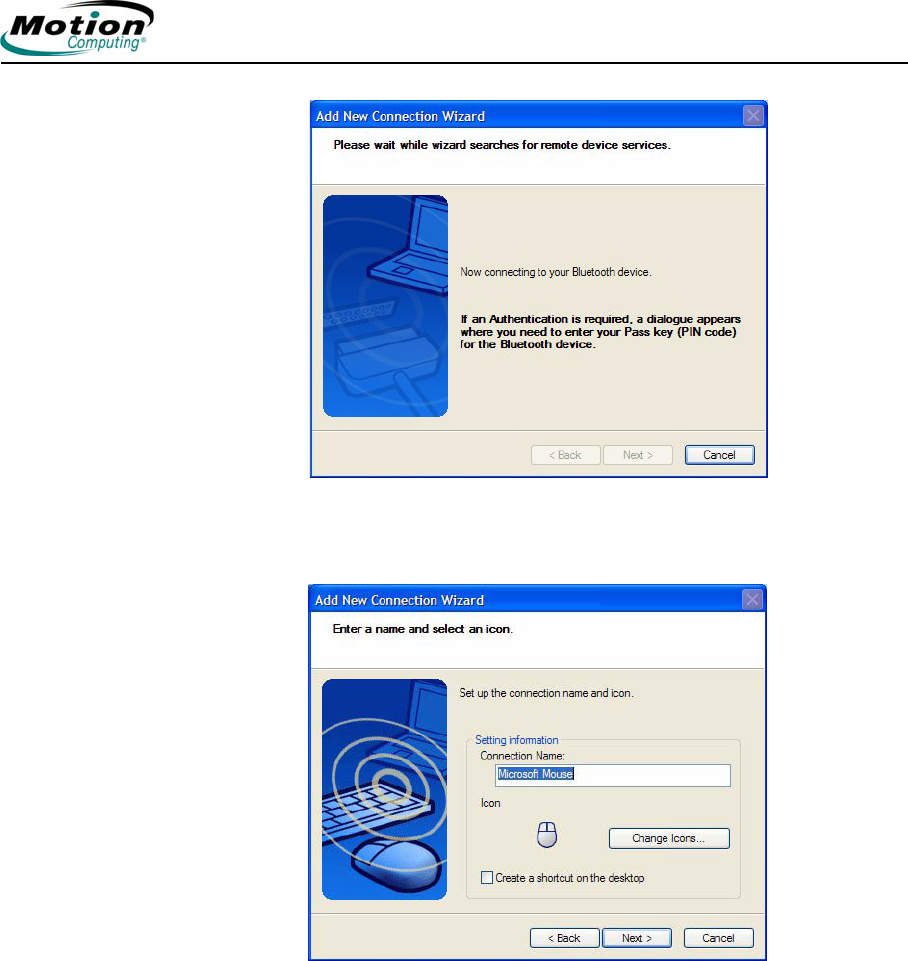
Motion Computing LE1600 and LS800 Tablet PC User Guide 67
It may take a short time to complete the connection. Please
wait. The wizard asks you to enter a name and select an icon
for the device. Tap Next to continue.
7. When the Completing the Add Bluetooth Device Wizard window
appears, the Bluetooth installation is nearly complete. Tap Finish to
complete the installation.
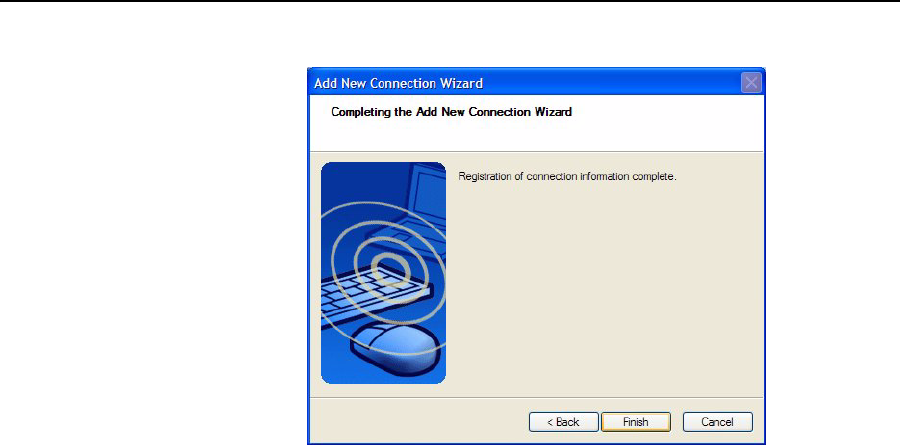
68 Motion Computing LE1600 and LS800 Tablet PC User Guide
8. Take your device for a spin. You can now begin using your Bluetooth
device.
Important Steps to Take If the Device Is Not Discovered
If the Tablet PC fails to detect the Bluetooth device after what you consider a
reasonable number of attempts, try the following:
• Make sure the Bluetooth LED is flashing. If not, open the Motion
Dashboard and enable the Bluetooth Wireless radio button.
• Make sure the device you are adding is discoverable. There are
several things you need to check:
• Install new or fully charged batteries in the Bluetooth device; make
sure these are installed correctly
• For keyboards, mice, printers, etc., read the instructions that came
with the device or visit the device manufacturer’s website for
information and other troubleshooting tips. Some devices have a
button to press or a series of keys to press to make it discoverable.
• Also with keyboards, mice, printers, etc., be sure that when you go
through the Add Bluetooth Device Wizard that you place a
checkmark beside “My device is set up and ready to be found.”
• For Tablet PCs transferring files, both Tablet PCs must turn on the
device transfer wizard, although only the receiving Tablet PC needs
to be discoverable. Tap the Bluetooth icon and then either “Send a
file” or “Receive a file.” When you do this, discovery is automatically
turned on for the receiving device.
• Also for Tablet PCs, you need to enable “Allow Bluetooth devices to
connect to this computer” to connect to keyboards, mice, printers,
etc. While this is the default, make sure that this setting has not been
changed. You find this by right-clicking the Bluetooth icon > Show
Bluetooth Devices > Options.
• When you open the Bluetooth Devices tab, only the connected
devices will be displayed. Other devices are only displayed when
you add a device using the Bluetooth Device Wizard.
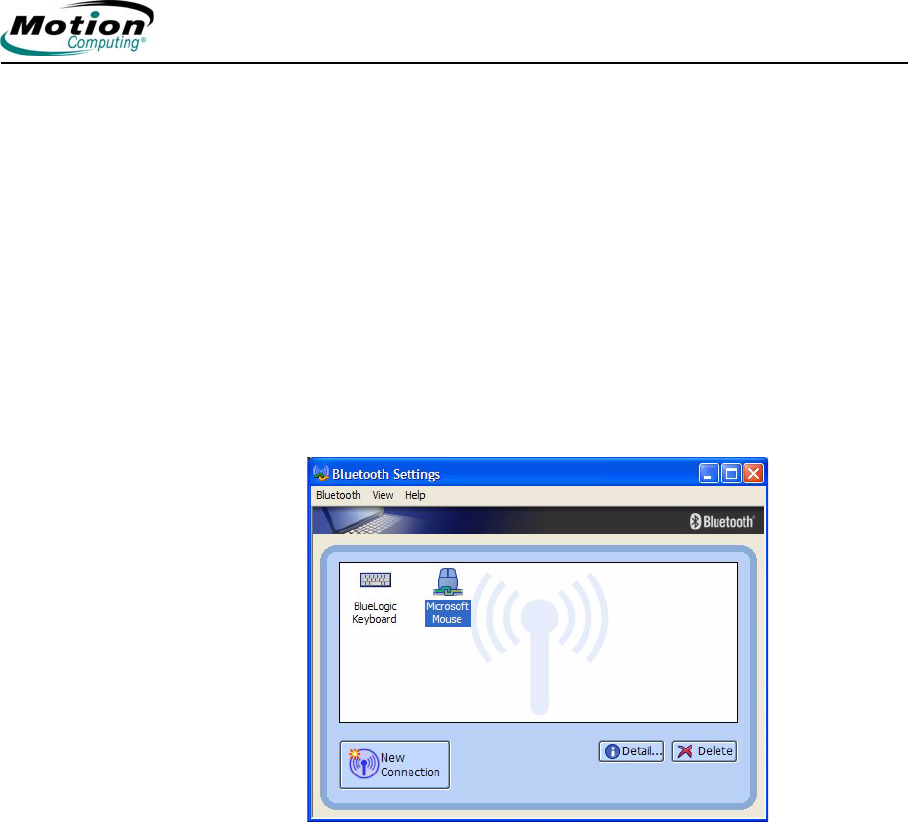
Motion Computing LE1600 and LS800 Tablet PC User Guide 69
• Check to see what Bluetooth devices are connected. Tap the
Bluetooth Devices icon > Open Bluetooth Settings. On the
Devices window, you should be able to see Bluetooth devices that
are currently connected.
If the Bluetooth card in the Tablet PC still fails to detect the Bluetooth device,
contact the device manufacturer or visit their website for assistance.
NOTE: A system reboot is not required.
The Bluetooth device is ready to use. If you look at the
Bluetooth Settings window, the connected device or devices
are shown. An example of a Bluetooth Settings window with
both a Bluetooth keyboard and a Bluetooth mouse is shown
below.
Switch to Other Bluetooth Software. Your Tablet PC comes pre-installed
with Bluetooth from Toshiba. Windows XP Tablet PC Edition 2005 supports
certain Bluetooth devices natively (e.g., keyboards and mice).
If you would prefer to use the Windows XP Tablet PC software, please visit
http:\\selfhelp.motioncomputing.com for instructions on switching to the
native Bluetooth software.
Helpful Hints: Bluetooth Wireless
Motion Computing and its Bluetooth partners have worked to ensure a
positive experience with this technology, as well as to ensure Bluetooth
inter-operability. In doing so, the following operating issues have been
found:
• When simultaneously operating Bluetooth wireless and 802.11 wireless,
interference between these wireless technologies impacts Bluetooth
performance. This is most noticeable when you try to transfer large
amounts of data, such as file transfers or printing large documents. This
may also be noticeable when you try to transfer large or small amounts
of data may if several Bluetooth devices are operating simultaneously in
an office.
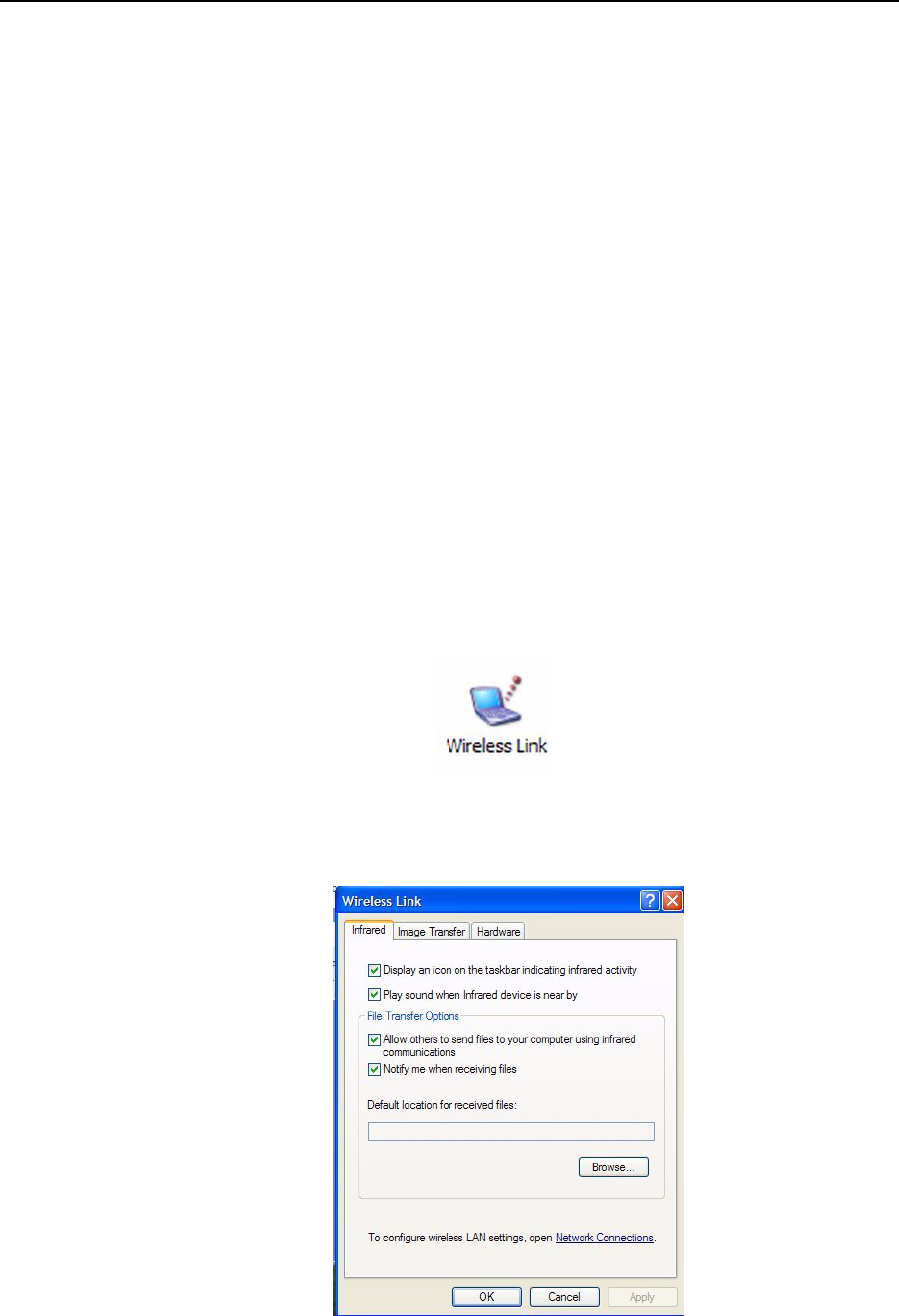
70 Motion Computing LE1600 and LS800 Tablet PC User Guide
• Bluetooth audio support is currently based on technology that has not
been fully developed for speech recognition. In addition, the Bluetooth
software in the Tablet PC does not have a pre-installed Bluetooth head-
set profile. Therefore, for speech recognition, we recommend that you
not use a Bluetooth wireless headset. Moreover, the Motion Speak Any-
where technology is designed to record clear audio, dictate notes, and
use voice commands without the need for any type of microphone head-
set.
• Should you attempt to install other wireless headset or other audio driv-
ers (such as Bluetooth or USB) over the Tablet PC audio drivers, a mal-
function of the Tablet PC audio system may occur because the drivers
may not be compatible.
• Because Bluetooth is a relatively new technology, some cross-device
compatibility issues may occur. If you are having problems with interpret-
ability of Bluetooth devices, contact the manufacturer of your Bluetooth
device and check its compatibility with the Bluetooth software installed
on your Tablet PC.
• Do not install Bluetooth software from another manufacturer over the
Microsoft Bluetooth software installed on the Tablet PC. This will cause
malfunction of the Tablet PC Bluetooth system.
Using Infrared Wireless Connections
The infrared software is installed by default. You can access the Infrared
software by going to the Control Panel and tapping the Wireless Link icon.
Double-tap the Wireless Link icon to open the Wireless Link window. The
following shows the Wireless Link window at the Infrared tab. Tap the
desired checkboxes.
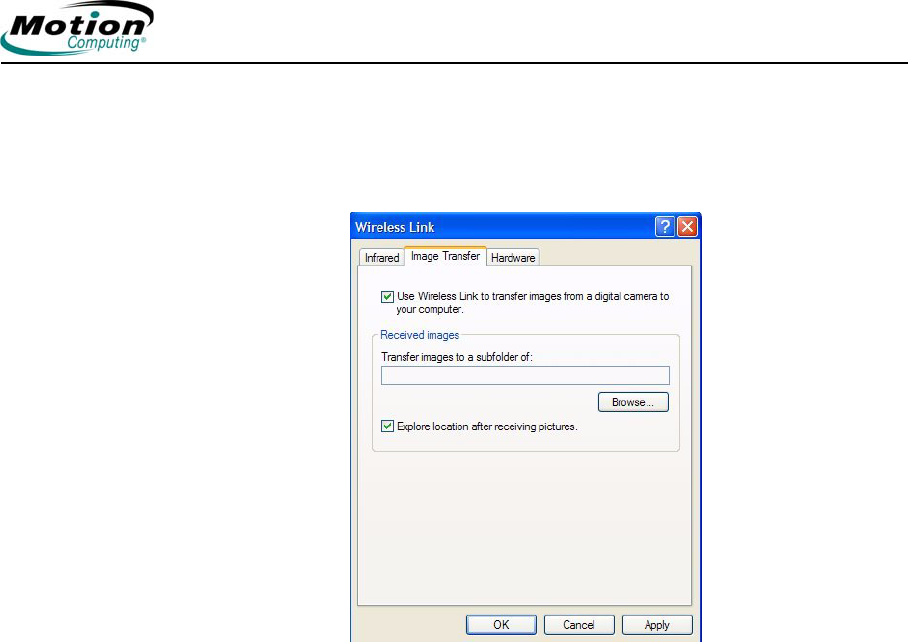
Motion Computing LE1600 and LS800 Tablet PC User Guide 71
Accessing Image Transfer. To transfer an image from your camera to
your Tablet PC, tap the Image Transfer tab in the Wireless Link window.
The Image Transfer window is shown. Specify the destination of the
received image(s) and tap OK to begin.
For information about the Infrared Port, tap the Hardware tab to open that
window.
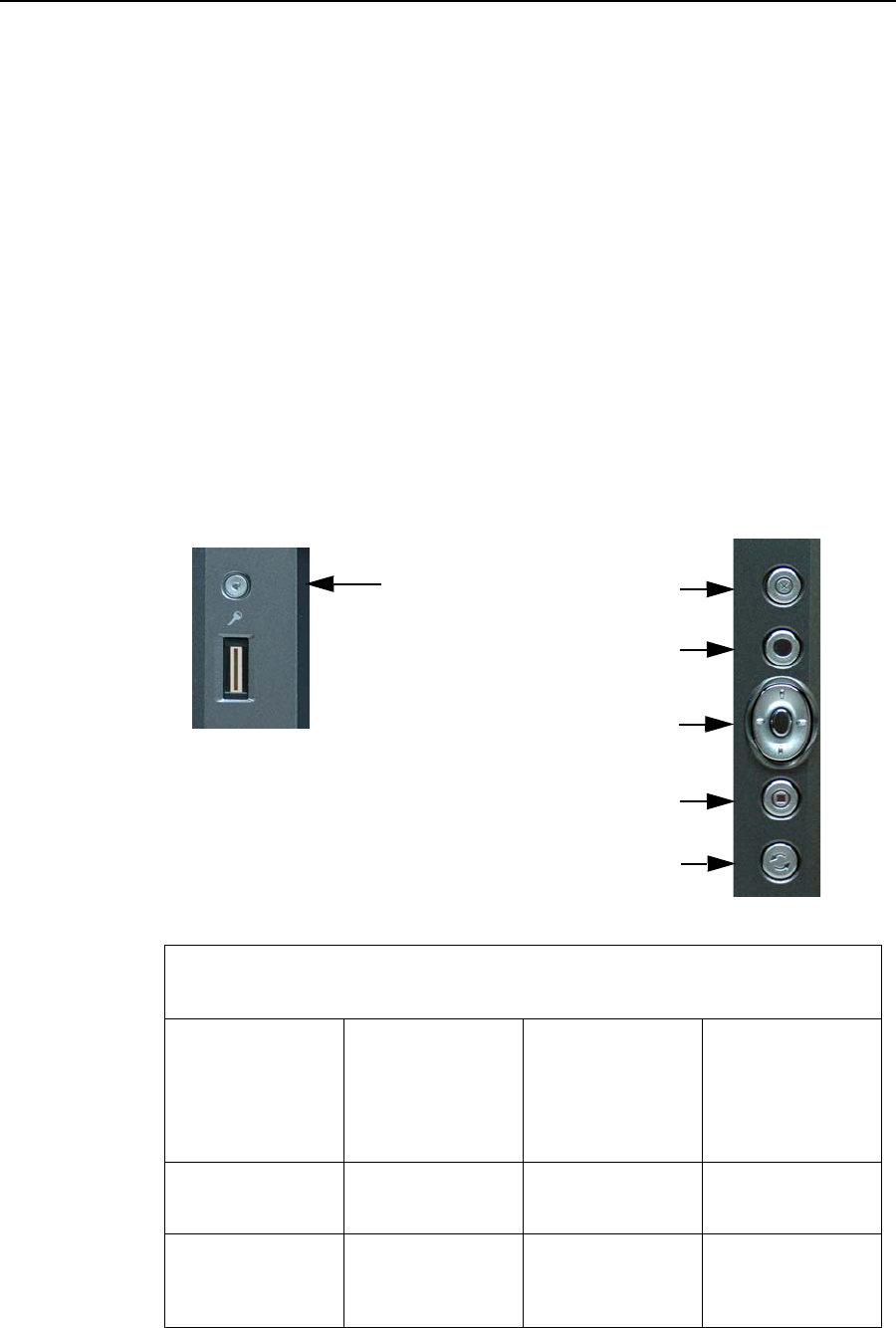
72 Motion Computing LE1600 and LS800 Tablet PC User Guide
CONFIGURING
BUTTONS
This section shows you how to program some of the buttons on the front
panel of the Tablet PC. It is not necessary for you to customize the buttons,
especially at this point in your learning process. As you become more
familiar with the Tablet PC, you may want to customize your buttons.
You can configure some of the Tablet PC buttons so they perform the
functions that you want them to perform.
• Escape button (a secondary function is programmable)
• Function button (not programmable)
• Five-way directional control buttons (secondary functions of each key
are programmable)
• The Motion Dashboard and Rotate buttons can be programmed to per-
form other functions
• Ctrl+Alt+Del (SAS - Secure Attention Sequence) - this button is located
on the front panel in the upper left corner (when in primary landscape
orientation) above the key icon and the fingerprint reader.
Button Default and Programmable Functions
Button Primary
Function Programmable
Secondary
Function
(Press Fcn
button + this
button)
Escape Escape key Secondary function
is programmable Alt + Tab
Function Function + other
button activates
secondary function
Not programmable No secondary
function
Esc button
Fcn button
Five- way directional control
Motion Dashboard
Rotate
Ctrl+Alt+Del
Tablet PC Buttons
(SAS) button
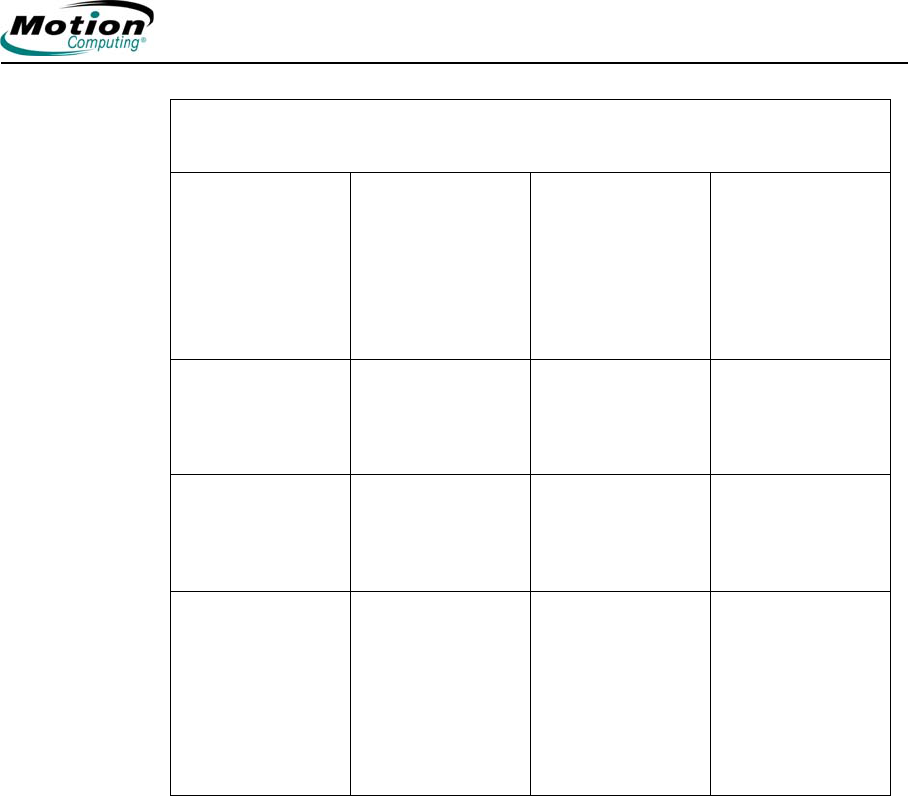
Motion Computing LE1600 and LS800 Tablet PC User Guide 73
To change the default button properties:
1. Open Motion Dashboard and tap Pen and Button Options. Or,
double-tap the Tablet and Pen Settings icon in the system tray,
located in the lower right corner of the display window.
2. Tap Tablet Buttons.
3. Highlight the name of the tablet button you want to reprogram. The
button being programmed turns red.
4. Tap Change.
5. On the Change Button Functions window, tap the down-arrow
beside Action. This opens the list of actions.
6. Select a new action from the list.
NOTE: For some actions, you only need to select the action
itself to change the button property. For others, such as to
launch a program, you must browse and find the program; or,
to set up a key combination, you must press a sequence of
keys. You can also tap Reset to return to the button defaults.
7. Tap OK. In the list of Actions, you should see the new action for the
button you programmed.
Five-way
Directional
Control Button
Works like the
arrow keys on a
keyboard. The
center of the
button works like
the Enter key.
Secondary
functions are
programmable
Left arrow = Shift
+Tab
Right arrow = Tab
Up arrow = Page
Up
Down arrow =
Page Down
Motion
Dashboard Opens Motion
Dashboard
Both primary and
secondary
functions are
programmable
Open Windows
Journal
Rotate Rotates the
display
Both primary and
secondary
functions are
programmable
Open Tablet PC
Input Panel
Ctrl+Alt+Del
(SAS - Secure
Attention
Sequence)
(This button is
located at the top left
corner with a key
icon)
Ctrl+Alt+Del
(Windows Task
Manager). Also
used for domain
authentication or
logon screen.
Not programmable No secondary
function
Button Default and Programmable Functions

74 Motion Computing LE1600 and LS800 Tablet PC User Guide
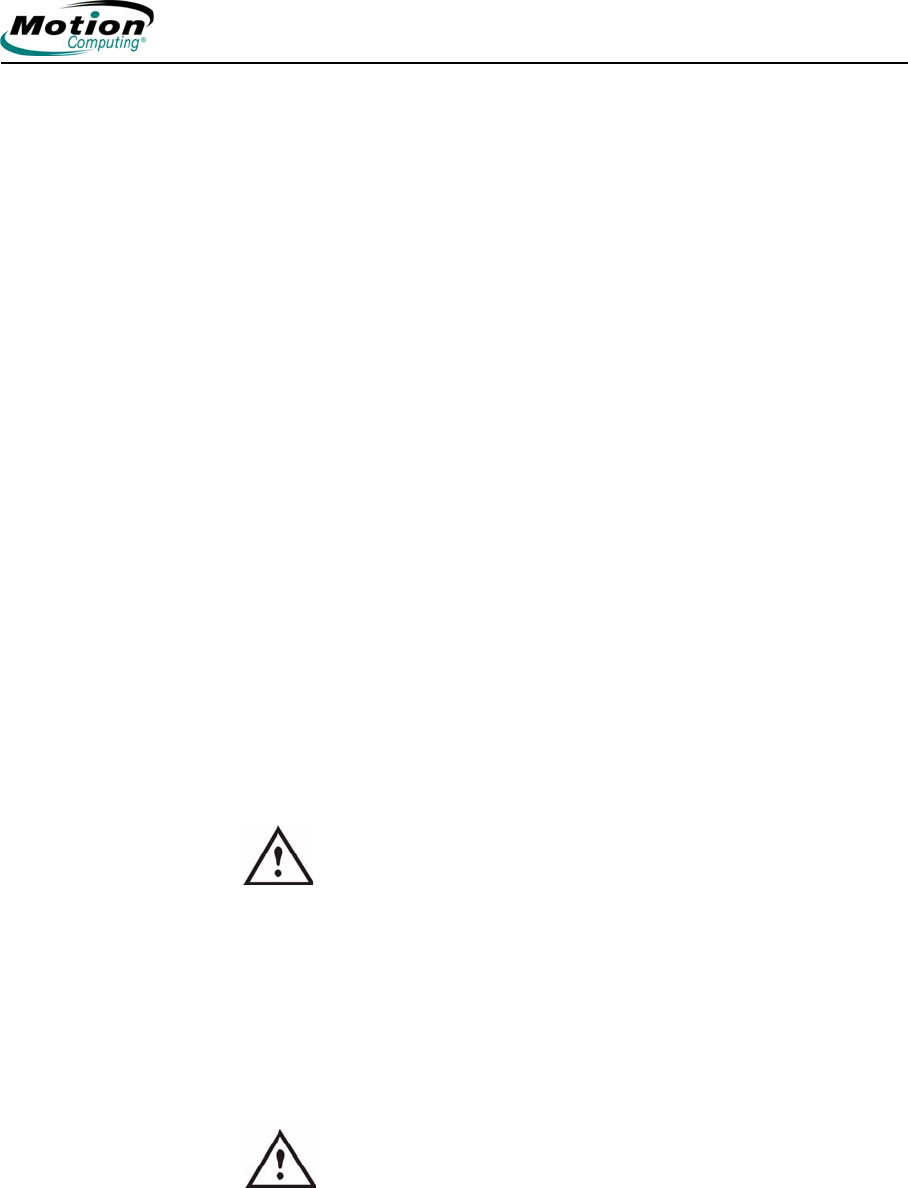
Motion Computing LE1600 and LS800 Tablet PC User Guide 75
Chapter
3
Care and Maintenance
This chapter describes various care and maintenance procedures that you
should do on a routine basis with your Motion Tablet PC.
CARING FOR
YOUR TABLET
PC AND ITS
ACCESSORIES
The Tablet PC display and chassis are designed to be very durable. This
section describes the proper care and maintenance that will keep them
working and in good condition for a long time. For general information about
care of the Tablet PC and its components and accessories, see the
Regulatory and Safety Guide packaged with your Tablet PC.
CAUTION: Be sure to follow the guidelines listed
below when caring for your Tablet PC and its
components. Improper use may damage the Tablet
PC and/or its components and void the warranty.
General Care
• Protect the Tablet PC from exposure to extreme temperatures, shock,
liquids, and strong magnetic fields.
• Do not open or disassemble the Tablet PC other than to replace memory
modules or to replace the battery. Always follow the instructions
included with these accessories when performing these procedures.
WARNING: To avoid the risk of personal injury or
damage to the Tablet PC, when replacing memory
modules, turn off your Tablet PC, unplug the AC
power connection, and remove the battery. Ground
yourself by touching a grounded conductive surface,
such as a device or appliance with a grounded,
three-pronged plug. Avoid touching the pins and
leads on the memory and the internal circuitry of the
Tablet PC.

76 Motion Computing LE1600 and LS800 Tablet PC User Guide
• When storing the Tablet PC for an extended period of time, unplug AC
power and remove the battery after discharging it part way.
• Do not place heavy objects on top of the Tablet PC.
Caring for the Standard and View Anywhere Displays
• General cleaning of either display — Clean fingerprints and most marks
from the display surface by wiping it with the soft cloth (provided). Never
spray or pour liquids directly onto the display surface itself. Never use an
abrasive cleaner on the display. If liquid is spilled on the display, wipe it
up immediately.
• Cleaning the standard display — If needed, spray a soft cloth (not
directly on the display) with a window-type cleaner and wipe the
display.
• Cleaning the View Anywhere Display — If needed, clean with any
alcohol-based product recommended for use on anti-reflective glass.
Other cleaning products may leave a residue.
• Avoid using tissues or paper towels to clean the display surface. These
contain wood fibers that can scratch the display.
• Use only the Motion Digitizer Pen on the display. Do not write on the sur-
face with an ink pen or pencil, or any pointed or other object that could
damage the display surface.
• Do not place heavy objects on the display surface.
• Protect the display surface from unnecessary contact by using the Hard-
top Cover or a portfolio when transporting the Tablet PC.
• Avoid exposing the display to direct sunlight for long periods of time.
Caring for the Motion Digitizer Pen
• Always store the Motion Digitizer Pen in the Tablet PC pen bay or in the
portfolio when not in use.
• Do not store the pen vertically on the tip. Constant tip pressure can
affect the pen-to-digitizer interaction.
• Change the pen tip regularly. See the CAUTION and refer to “Replacing
the Pen Tips” on page 76.
• The pen contains sensitive electronics. Do not immerse it in liquids.
CAUTION: Certain environments may contain
particles or debris that can adhere to the Tablet PC
display or to the pen tip. To avoid damaging the
display, clean it frequently with the cleaning cloth,
provided with your system. Also, change pen tips
regularly, especially if you drop the pen onto a rough
surface that could damage the tip or embed debris in
it. Damaged pen tips can scratch the display.
Consider using a Motion case to protect the display
and the pen.
Replacing the Pen Tips. Normal use eventually wears down the pen tip, so
the pen ships with extra tips and a small “tip tool” for replacing them.

Motion Computing LE1600 and LS800 Tablet PC User Guide 77
1. Grasp the old tip with the silver ring of the tip replacement tool. Use
the notch on the ring to grab the tip.
2. Pull the old tip out of the pen.
3. Insert a new tip.
4. Apply slight pressure to push it into place.
Ordering New Pens
To order additional pens, visit the Motion Computing website at
www.motioncomputing.com/accessories.
TRAVELING
WITH YOUR
TABLET PC
Here are some tips for traveling with your Tablet PC:
• Remove all accessories and cables. Remember to pack those you will
need while traveling and do not forget to pack at least one Motion
digitizer pen.
• Attach the Hardtop Cover or slip the Tablet PC into a portfolio to protect
the display.
• Protect the pen by keeping it in the Tablet PC pen bay or portfolio case
during travel.
• Pack the Tablet PC securely in a briefcase or hand-carried luggage, and
keep it separate from toiletries, liquids, and food. Do not pack it in
checked luggage when you travel.
• Keep the Tablet PC stable during travel; secure it to prevent it from slid-
ing around in overhead bins and car trunks.
NOTE: For travel warnings, refer to “FAA Wireless Air Travel
Requirement” on page 77.
Traveling by Air
• Prepare for airport security by charging the battery in the event Security
asks you to start the Tablet PC.
• Have it hand-inspected or sent through the X-ray scanner, but never
carry it through the metal detector.
• Either turn off or place the Tablet PC in hibernation mode for takeoff
and landing.
FAA Wireless Air Travel Requirement
WARNING: The FAA requires that you suspend
wireless operations, such as 802.11 and Bluetooth,
before boarding the plane. The easiest way to
disable internal wireless operations is by pressing
the Wireless on/off button for 1/2 second. You can
also uncheck (disable) all wireless devices in the
Motion Dashboard. The wireless LED on the Tablet
PC front panel, shown here, is off when wireless
communications are disabled. To disable external
wireless operations, remove any installed wireless PC Cards.

78 Motion Computing LE1600 and LS800 Tablet PC User Guide
WARNING: Do not transport the Lithium-ion
batteries used in your Tablet PC in checked
baggage. You may take up to two spare batteries in
carry-on luggage in addition to the one in your Tablet
PC.
Transporting batteries in checked baggage or
transporting more than two spare batteries is a
violation of transportation regulations.
Other Travel Hints
• Before extended use in the field or long trips away from AC power,
adjust the Power properties to maximize battery conservation. Right-
click the Power Meter icon in the system tray to open the Power
Options Properties dialog box. Then adjust the options. For more infor-
mation, refer to “Helpful Hints: Battery and Power Management ” on
page 40.
• For international travel, obtain and use the appropriate adapters for your
destination’s electrical outlets. A current converter is not necessary.
• You may want to carry proof of ownership or a merchandise passport
when traveling internationally.
• Consult your insurance company and credit card company to learn
about emergency travel assistance in the event your Tablet PC becomes
lost or disabled.
SYSTEM
REPAIR/
RECOVERY
PROCEDURE
You may never need to perform this procedure, but in the event that your
system shows signs of instability or corruption, it may become necessary. In
most cases, once initiated, this procedure lets you repair the Tablet PC hard
disk drive and retain the original system data, applications, passwords, and
settings with no data loss.
In those cases where no repair is possible, this procedure overwrites your
system data. You can cancel the procedure before the recovery process
begins. In this case, you may want to contact your system administrator for
assistance.
1. If possible, back up your data files.
2. Turn off your Tablet PC.
3. Insert the appropriate Motion Operating System Recovery CD (Win-
dows XP Professional Service Pack 2) into the CD-ROM drive and
start the Tablet PC.
4. When prompted, press any key to boot from the CD.
5. On the Set Up screen, select ENTER to set up Windows XP.
NOTE: Do not select R=Repair before you accept the End
User License Agreement (EULA). If you do, you must exit this
procedure, shut down and restart your Tablet PC, then accept
the EULA before proceeding.
6. Press F8 to accept the terms of the End User License Agreement.
7. When the next options appear, select from the following:

Motion Computing LE1600 and LS800 Tablet PC User Guide 79
IMPORTANT: If Windows XP cannot repair your system, this
procedure automatically skips to the second option, ESC =
Don’t Repair (reformatting):
• R = Repair option — Installs Windows XP Tablet PC Edition 2005 on
your system, preserving your system data, applications, passwords,
and settings
• ESC = Don’t Repair (reformatting) option — Reformats your hard
disk drive. If Windows XP automatically skips to this option (that is,
no repair is possible), you must decide whether to reformat now or
cancel the procedure. If you decide to reformat, select either Format
the partition using the NTFS File System or the NTFS File System
(Quick). If you decide not to reformat, select ESC to cancel the
procedure.
8. Continue following the on screen instructions.
9. After your operating system has been reinstalled, you will be
prompted to insert the Motion Drivers and Utilities Recovery CD.
• For a repaired system, this process completes quickly.
If your system notifies you to reboot, restart your sys-
tem.
• For a reformatted system, this process takes some time
while the drivers and utilities are reinstalled. Once Win-
dows loads, your settings and drivers begin to install.
Your system may reboot several times during this pro-
cess. No action is required. At this point, you may need
to install additional software (such as Microsoft Office),
as appropriate, from the Motion Application CD. You
may also want to restore your personal preferences and
settings.

80 Motion Computing LE1600 and LS800 Tablet PC User Guide
This page is intentionally blank.
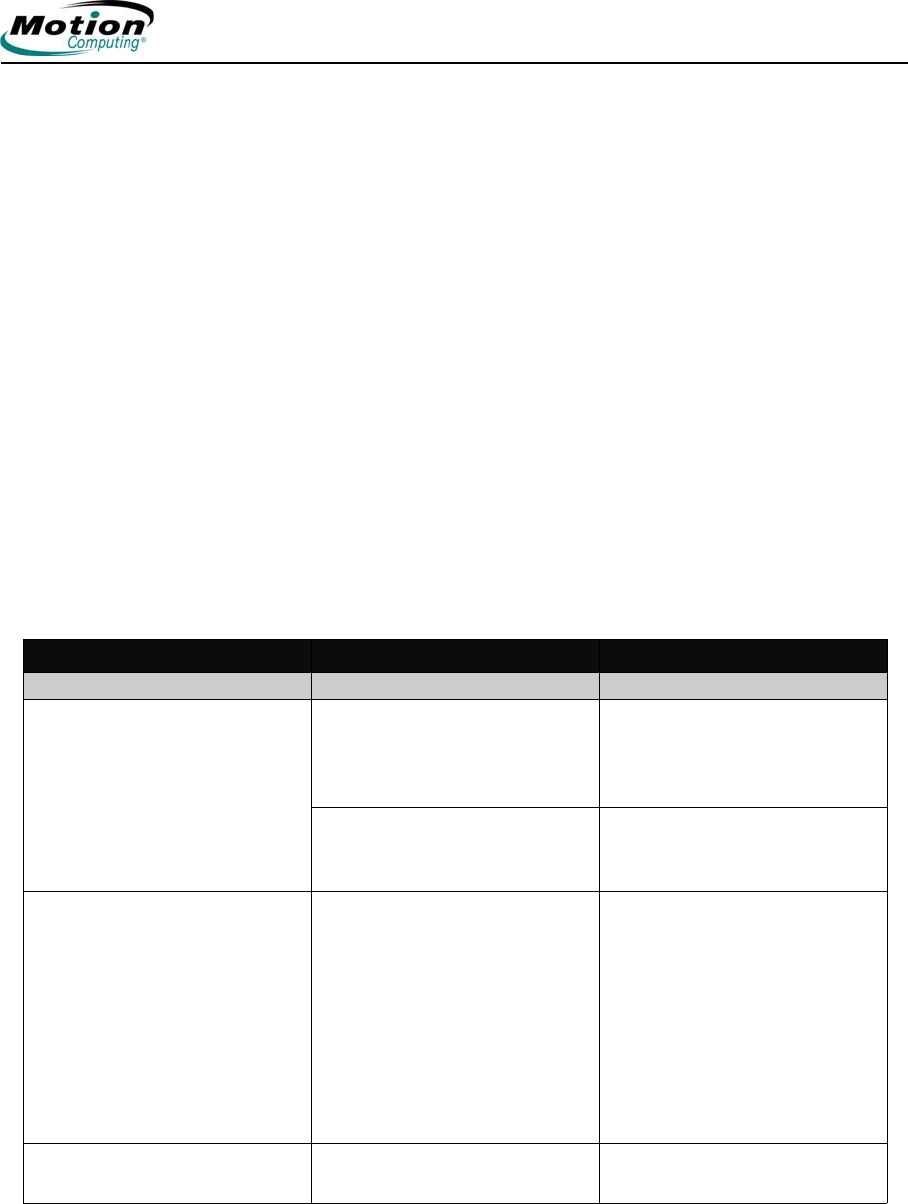
Motion Computing LE1600 and LS800 Tablet PC User Guide 81
Appendix
A
Troubleshooting and Support
All Motion Computing Tablet PCs have passed a rigorous series of
performance and quality-control tests, but now and then a problem may
occur. If you do not see a solution among the following system and software
issues, go to our website at www.motioncomputing.com/support.
SOLUTIONS
TO COMMON
PROBLEMS
PROBLEM CAUSE SOLUTION
POWER
The Tablet PC won’t start when
I slide the Power switch. The Power switch hasn’t been
fully engaged. Slide and hold the power
switch for at least a half-
second, but no more than three
seconds.
Fully discharged battery or no
battery and no AC power. Connect the AC adapter to
operate the Tablet PC and
charge the battery.
The Tablet PC won’t shut
down. An application has locked up
the Tablet PC. Press the SAS button (small
button with a key icon nearby)
to start Windows Task
Manager and close the
application, or
Slide and hold the power
switch for at least 5 seconds to
force a shutdown of the Tablet
PC.
The Tablet PC won’t enter
Hibernation mode. Hibernation isn’t enabled. Enable Hibernation through
Power Option Properties.

82 Motion Computing LE1600 and LS800 Tablet PC User Guide
The Tablet PC won’t come out
of Hibernation mode when
running on battery power.
Fully discharged battery and
no AC power. Connect the AC adapter to
provide power to the Tablet PC
and charge the battery.
The display goes black while
the Tablet PC is still turned on. The Tablet PC system has
gone into stand by after sitting
idle for a period of time. (In this
state, the power LED flashes
blue.)
Slide the power switch for
about a second to resume
operations.
System has gone into low-
battery Hibernation mode. (In
this state, the power LED is
off.)
1. Slide the power switch for
about a second to resume
operations. 2. Connect the AC
adapter to the Tablet PC to
charge the battery.
BATTERY
Data loss during battery swap. The unit is designed to
maintain the data and settings
for up to 30 seconds in stand
by while you swap the battery.
This time may vary due to your
system and the programs
you’re running.
When you swap the battery
with the unit in stand by, be
sure to save your data before
removing the battery to avoid
data loss.
The battery seems to run down
very quickly (lasting less than
three hours after a full charge).
Accessory devices such as a
DVD player and applications
that make heavy use of the
hard drive drain the battery
more quickly.
Use AC power when possible
and/or turn off the accessory
devices.
The battery is weakening or
defective. All batteries weaken over time,
but if a new battery is needed,
visit the Motion website to
order a new battery.
DISPLAY
The desktop is too big for the
display – I can’t see all of the
desktop icons.
Screen resolution is set higher
than the default with 32-bit
resolution.
Decrease the screen resolution
by opening the Motion
Dashboard, selecting Graphics
Properties, then the Schemes
tab.
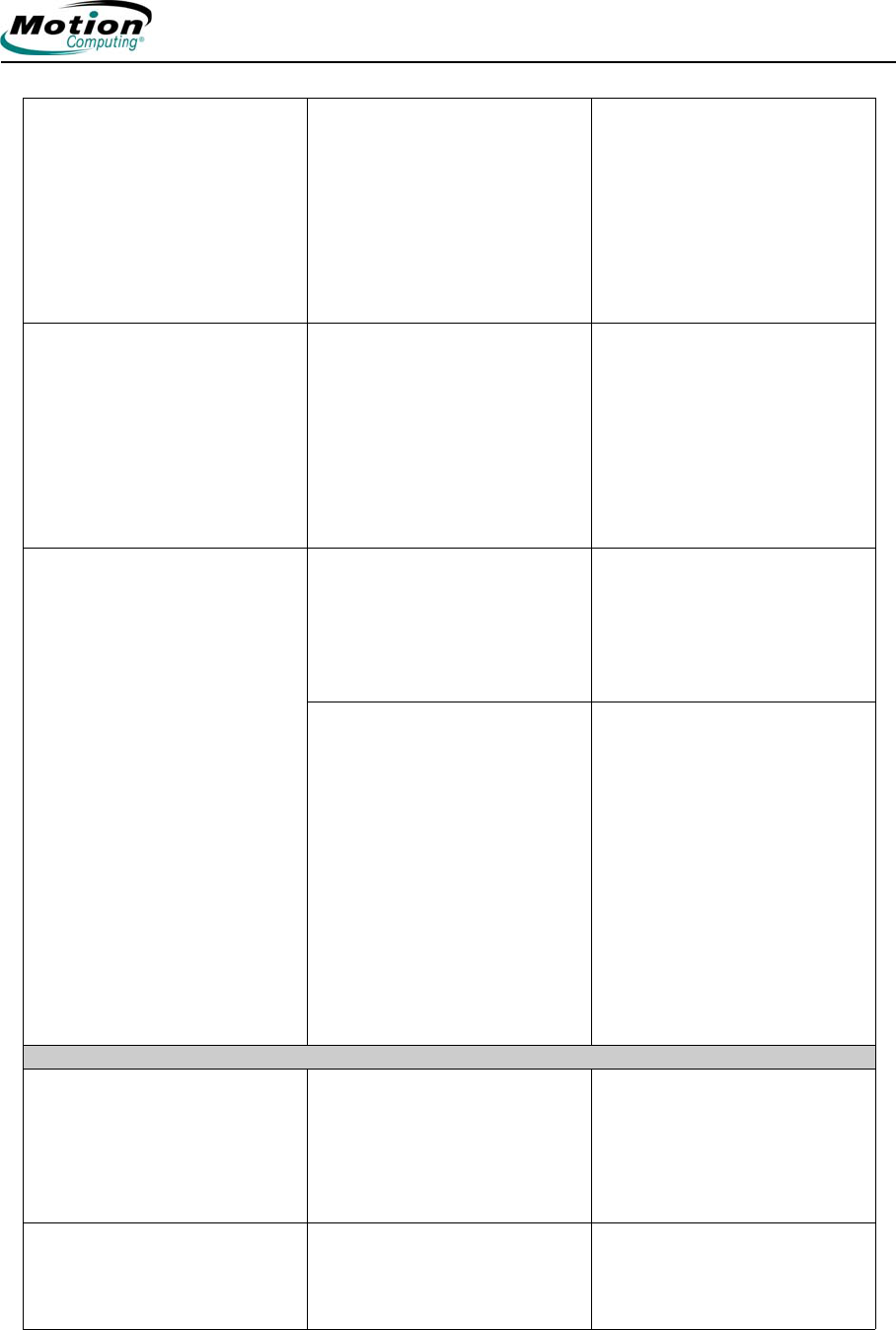
Motion Computing LE1600 and LS800 Tablet PC User Guide 83
When I disconnected a second
monitor from the Tablet PC, the
image became too big for the
Tablet PC display.
The Tablet PC has attempted
to spread the image of a
window or desktop beyond the
screen area of the active
monitor.
1. Tap the Properties button on
the Motion Dashboard.
2. Tap Graphics Options, then
Graphics Properties... to open
the Properties screen.
3. Select Notebook to make
the Tablet PC the primary
display.
The display looks dim. Brightness is set too low. Adjust brightness from the
Motion Dashboard.
The screen is unreadable or
distorted. Screen resolution and/or color
quality are set incorrectly. Reset resolution to the default
value and color quality to 32-bit
by opening the Motion
Dashboard, Graphics
Properties, then the Schemes
tab.
Display driver has become
corrupted or uninstalled. 1. Open the Windows
Control Panel, select
Performance and
Maintenance (Category
View). or System (Classic
View).
2. Select the Hardware tab.
3. Select Device Manager.
4. Open Display adapters.
5. Double-tap on an adapter.
6. Select the Driver tab.
7. Choose Update Driver...
and follow the Installation
Wizard.
PEN
The Tablet PC digitizer screen
doesn’t respond to the plastic
stylus I use on my PDA.
You’re using the wrong input
device. Only the Motion Digitizer Pen
can be used to write on the
Tablet PC display. The Tablet
PC doesn’t respond to other
tablet pens or to a plastic
stylus.
The Motion Digitizer Pen tip
doesn’t line up with the arrow-
cursor when I tap on the
screen.
The pen and display need
recalibrating. Open the Motion Dashboard
and select Calibrate.

84 Motion Computing LE1600 and LS800 Tablet PC User Guide
When I write, I unintentionally
click the pen function button
while I’m writing with the pen.
You’re pressing the pen button
with your thumb or finger when
you write or gripping the pen
too tightly and accidentally
pressing the pen button. This
enables the right-click function
of the pen.
Try these hints:
• Readjust how you hold the
pen. Place your fingers on
either side of the pen func-
tion button when you write.
• Practice using the pen func-
tion button with both your
index finger and thumb to
see which
you prefer.
• Relax your grip. Only a light
touch is needed to write with
the pen.
• Deactivate the pen right-click
function through Tablet and
Pen Settings. Instead, press
and hold the pen to the dis-
play surface to right-click.
The pen button doesn’t work. I
can’t get it to right-click. The right-click option for the
pen button may be
deactivated.
Re-activate the right-click
option: Double-click the Tablet
and Pen Settings icon, select
Pen Options, and reselect Use
pen button to right-click. Select
Apply > OK.
You may not be correctly timing
clicking the pen button and
tapping the pen on the display.
To right-click, hold the pen
button down and then firmly tap
on the display.
The buttons on the Tablet PC
don’t do what I expect them to
do.
Button functions have been
changed. Double-tap the Tablet and Pen
Settings icon, then Tablet
Buttons. You can reset the
buttons to the defaults. NOTE:
Button functions are
associated with the orientation
in which they’re programmed.
INTERFACE/PORTS
The system doesn’t recognize
the PC card I’ve inserted
(LE1600 only).
The card is incorrectly inserted. Eject the card and re-insert it
with the label side up.
The device is not supported. Check Windows XP
compatibility.
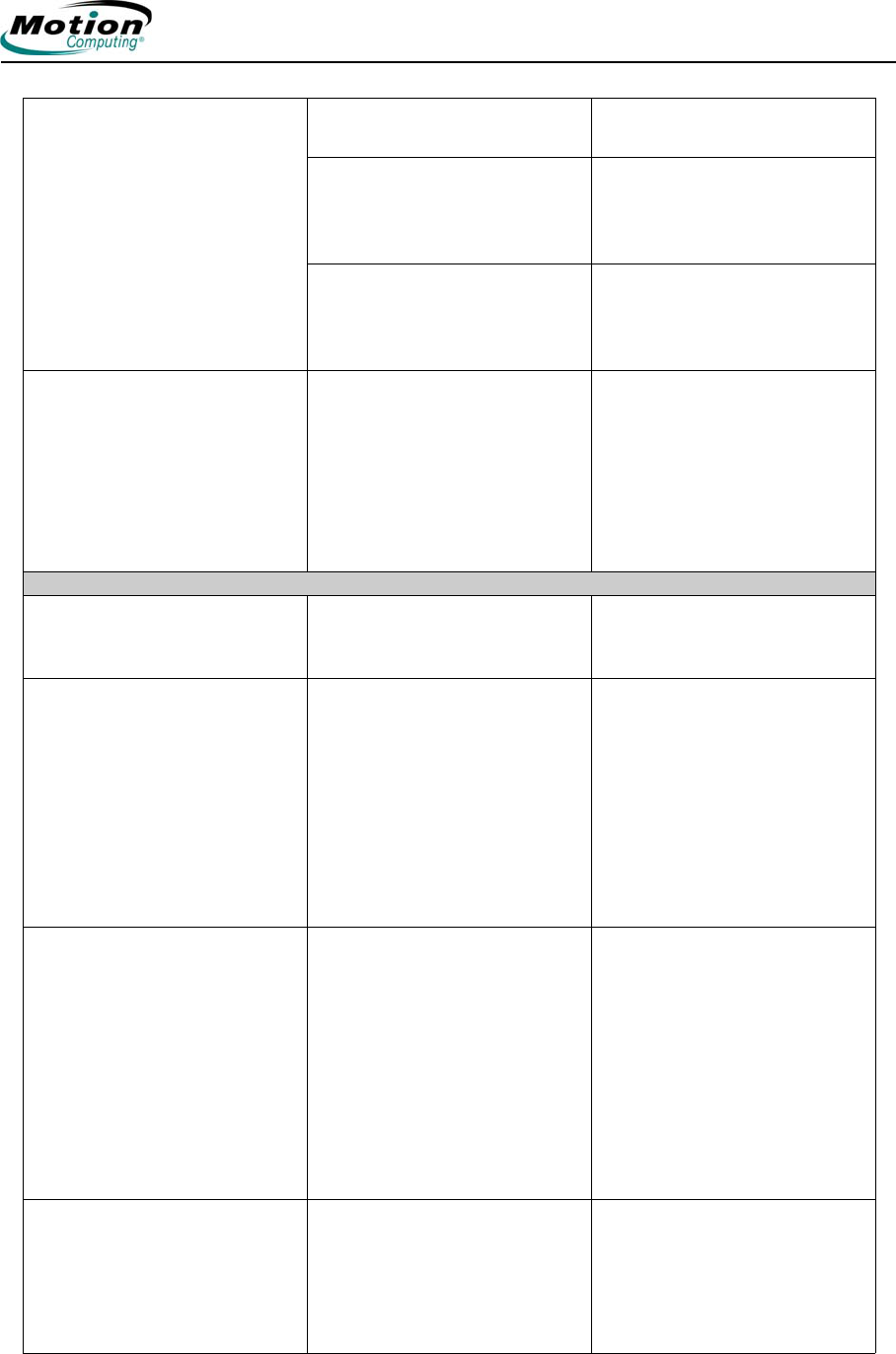
Motion Computing LE1600 and LS800 Tablet PC User Guide 85
The system doesn’t recognize
a USB device. Windows XP may take a short
time to recognize the device. Wait until Windows XP
recognizes the device.
The accessory isn’t connected
to the Tablet PC correctly. Check the connection cable
and be sure it is inserted into
the correct port on the Tablet
PC and the accessory device.
The correct driver isn’t built into
Windows XP. Use the device’s installation
CD or check the
manufacturer’s website for the
correct driver.
The Tablet PC is sitting in the
Motion FlexDock for the LE
Series, or the Motion
MobileDock for the LS Series
but the system doesn’t
recognize any accessory
devices, such as the external
monitor or DVD/CD RW.
The Tablet PC isn’t fully
seated. Reseat the Tablet PC in the
Motion FlexDock for the LE
Series, or the Motion
MobileDock for the LS Series.
AUDIO
No sound is coming from the
built-in speakers. Connecting a headset or
external speakers mutes the
built-in speakers.
Disconnect the headset or
external speakers if not in use.
No sound is coming from any
speakers. Audio volume is too low or has
been muted. Open the Motion Dashboard
and adjust the speaker volume
by sliding the volume slider or
uncheck the Mute button.
I’ve forgotten my BIOS
password and can’t access my
system.
The Tablet PC will let you enter
several passwords incorrectly
before it temporarily locks the
system.
Turn the Tablet PC off and
back on and try re-entering
your password (you can do this
as many times as needed). If
you have forgotten your
password, contact Motion
Computing Technical Support
for information about unlocking
your system at
www.motioncomputing.com/
support.
The program I’m working in
has stopped responding, but
the cursor moves and other
programs work.
The program has crashed. Press the Security button
(small button with a key icon)
on the Tablet PC front panel to
open the Task Manager and
end the non-responsive
program.

86 Motion Computing LE1600 and LS800 Tablet PC User Guide
The system seems to be
operating more slowly than
usual.
The hard disk drive is full or
nearly full. Run the Disk Cleanup utility to
clear out unnecessary and
temporary files. Remove
unneeded programs and files.
The disk needs defragmenting. Run Disk Defragmenter to
consolidate files and folders on
the hard drive. Consult the
“Performance and
Maintenance” section of the
Microsoft Help and Support
Center.
COMMUNICATIONS
The wireless communication
keeps connecting even when I
don’t want it to.
The default setting is On. Uncheck the wireless
checkboxes in the Motion
Dashboard.
Data doesn’t transfer through
the wired Ethernet cable. The Ethernet cable is not
connected correctly. Reconnect and check the
activity LEDs next to the LAN
(RJ-45) port. They should flash
green and amber.

Motion Computing LE1600 and LS800 Tablet PC User Guide 87
FREQUENTLY
ASKED
QUESTIONS
Can I make the battery charge last longer?
• Change to the Max Battery power scheme (right-click on the Power/Bat-
tery icon in the system tray—located in the lower-right corner of the dis-
play window—and tap Adjust Power Properties; under Power schemes,
tap Max Battery). The Tablet PC comes with Motion Computing Opti-
mized as the default power scheme.
• Turn on the Ambient Light Sensor on the Motion Dashboard. This will
dim the display automatically (when possible) and save battery power.
• Dim the display brightness by opening the Motion Dashboard and mov-
ing the Display Brightness slider. (You can also double-tap on the Tablet
and Pen Settings icon in the system tray and choose the Display tab to
get this brightness slider.)
• Disconnect LAN/modem connections and disable wireless communica-
tions when not in use (uncheck the Wireless checkboxes in the Motion
Dashboard).
• Turn off optional and unnecessary background programs and turn off or
unplug accessory equipment from the USB ports.
What does the Tablet PC need for use in another country?
Just an outlet adapter, which you can find in airports and travel stores. The
AC adapter will adjust automatically to different voltages when plugged into
the correct location-appropriate power adapter.
What’s the best way to clean the standard display screen?
To clean the acrylic display screen, wipe it with a soft cloth (like the one
supplied) onto which you have sprayed a window-type cleaner. Do not spray
cleaners, spray/pour any liquid, nor wipe any abrasive cleaner on the
screen nor any surface of the Tablet PC. Do not use tissues or paper towels
to clean the screen. They contain wood fibers and may scratch
the surface.
How should I clean the View Anywhere display screen?
To clean the View Anywhere display screen, wipe it with a soft cloth (like the
one supplied). If needed, clean with any alcohol-based product
recommended for use on anti-reflective glass. Other cleaning products may
leave a residue. Do not spray cleaners, spray/pour any liquid, nor wipe any
abrasive cleaner on the screen nor any surface of the Tablet PC. Do not use
tissues or paper towels to clean the screen. They contain wood fibers and
may scratch the surface.
Will scratches affect the display/digitizer’s performance?
Testing has not found appreciable loss of performance on a scratched
display.
How sensitive is the screen to various elements?
As with any computer or electronic device, the Tablet PC should be
protected from liquids, dirt and sand, other contaminants, and
extreme heat.

88 Motion Computing LE1600 and LS800 Tablet PC User Guide
Will the Tablet PC work with any monitor or USB accessory, keyboard,
mouse, disk drive, etc?
As long as the device’s driver is available either in the Windows XP
operating system or from the manufacturer and it carries the Windows XP
logo or certification, it should work with your Tablet PC. For more
information, see www.microsoft.com/help.
Why doesn’t the Tablet PC or FlexDock have parallel, serial, or
PS2 (mouse) ports?
Microsoft Tablet PC certification requires the system to be completely Grab-
and-Go—that is, to be able to dock with and undock from all accessories
without putting the system into suspend or shutting it down. Connection
through legacy ports (serial, parallel, PS2) often requires suspending or
restarting the system, which prevents you from moving between desktop
mode and mobile mode seamlessly in one docking/undocking step.
How do I adjust the Tablet PC for left-handed use?
Double-tap on the Tablet and Pen Settings icon in the system tray, located
in the lower-right corner of the display window, which opens the Settings
window. You can change it for left- or right-handed use as well as change
the location of the menus. Then, make sure you recalibrate the pen.
MOTION
WARRANTIES
Standard and Extended Warranty and Insurance Programs
Motion Computing currently provides limited warranties on Motion products
and accessories. See the Warranty packaged with your Motion product or
accessory or visit our website at www.motioncomputing.com.
In addition, Motion Computing offers extended warranties along with various
screen and configuration insurance programs. Visit our website at
www.motioncomputing.com/support.
MOTION
COMPUTING
SUPPORT
If you need assistance or answers to frequently asked questions about your
Motion Tablet PC, visit www.motioncomputing.com/support. We also offer a
Knowledge Base of additional information that may help with your problem.

Motion Computing LE1600 and LS800 Tablet PC User Guide 89
Appendix
B
Motion Tablet PC Specifications
Refer to the Motion Computing website at www.motioncomputing.com
for the latest information and specifications for your Tablet PC.

90 Motion Computing LE1600 and LS800 Tablet PC User Guide